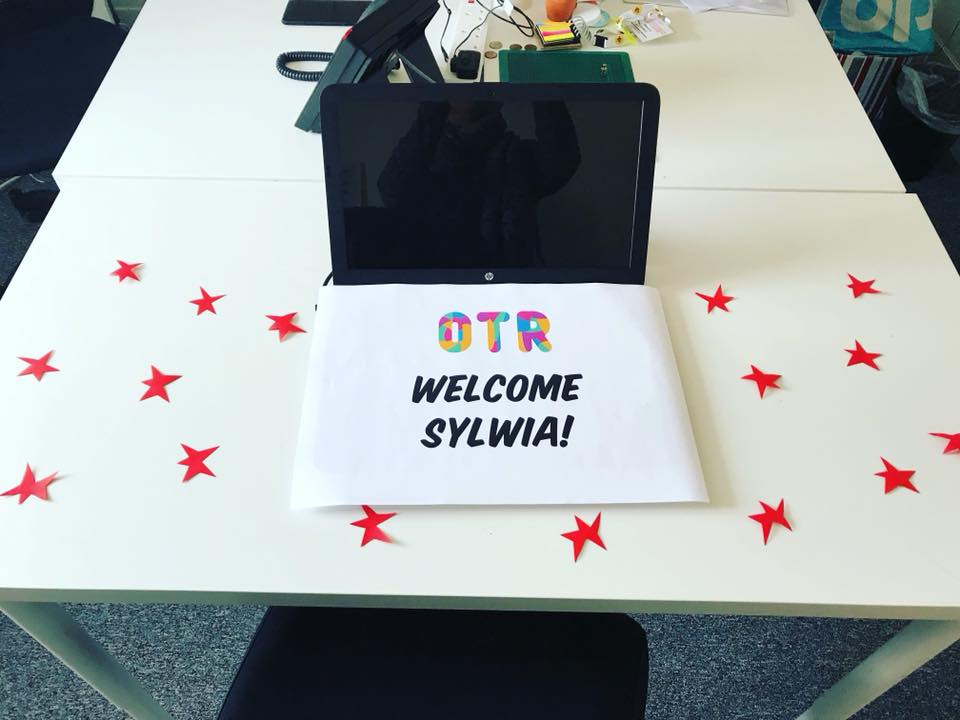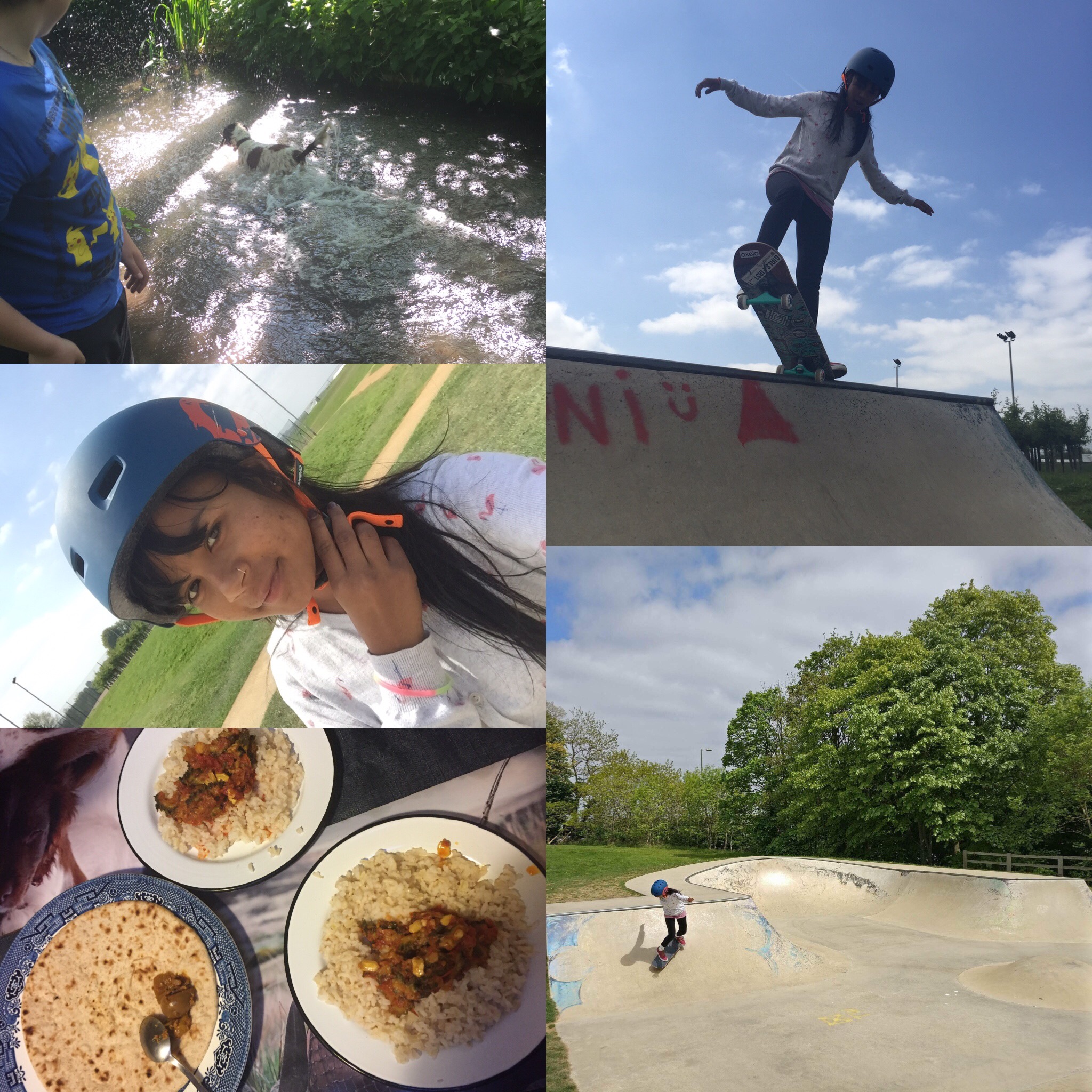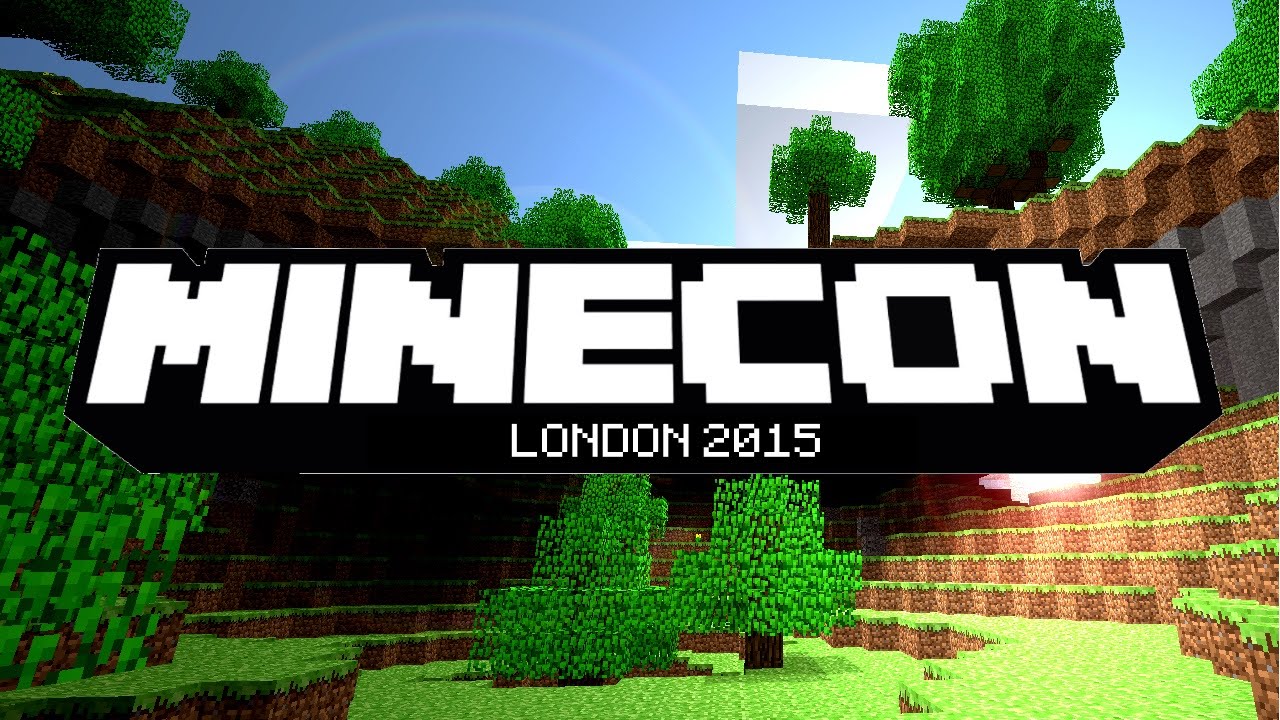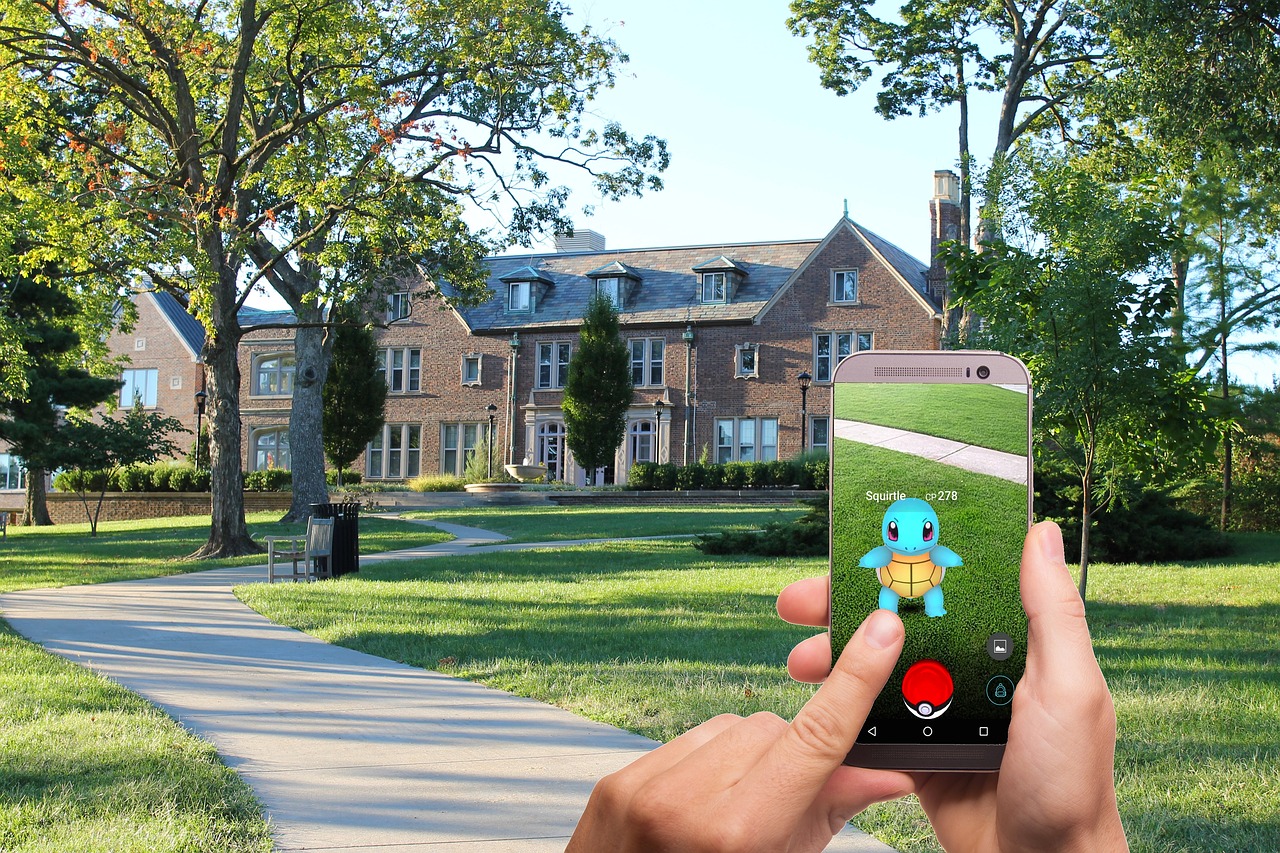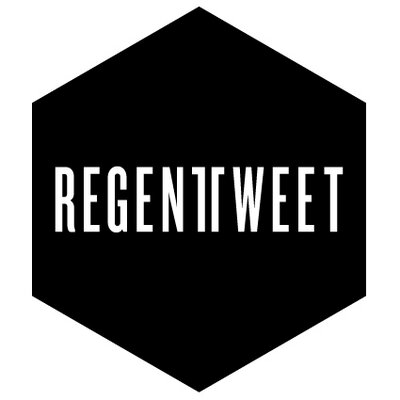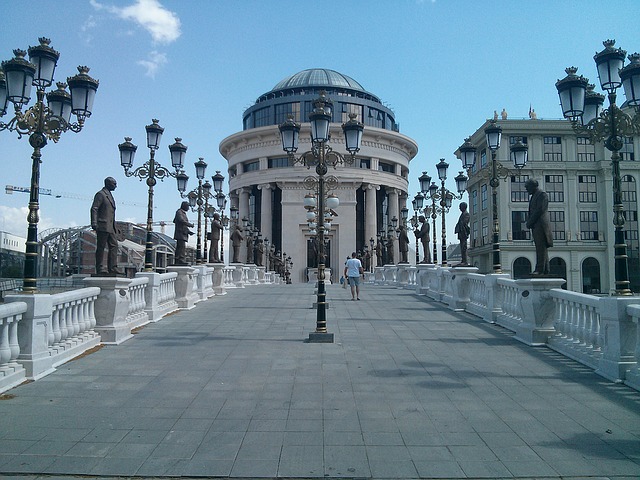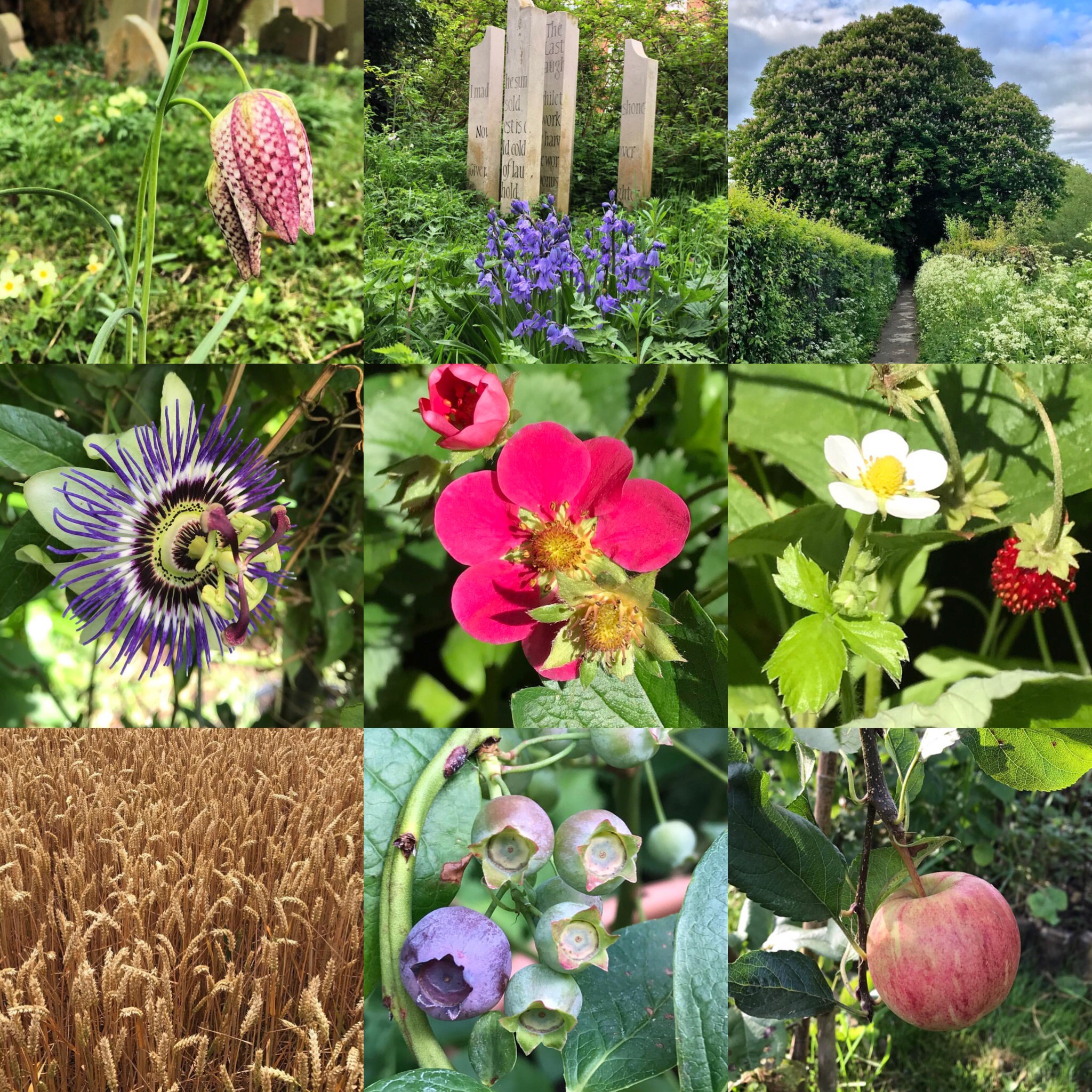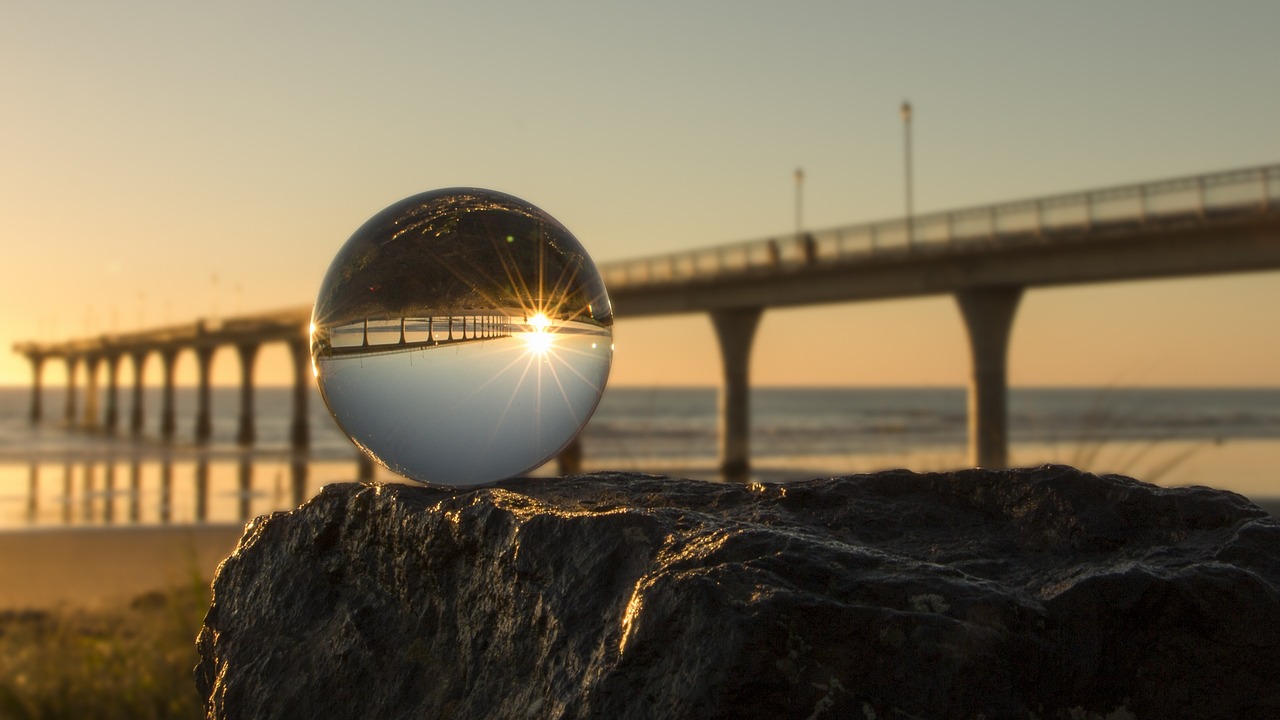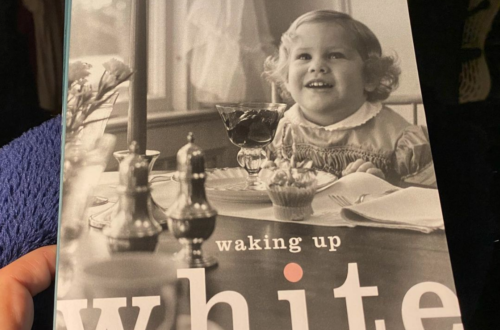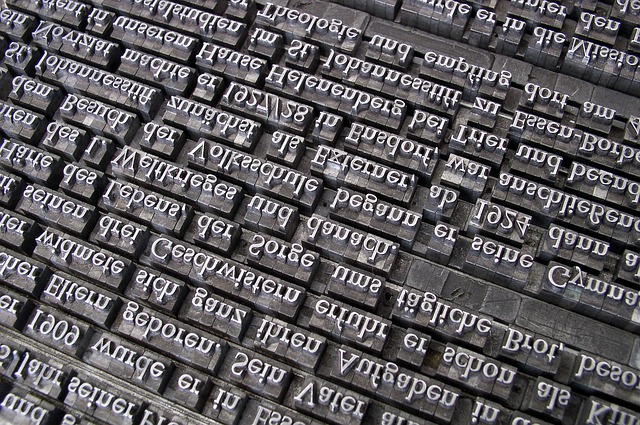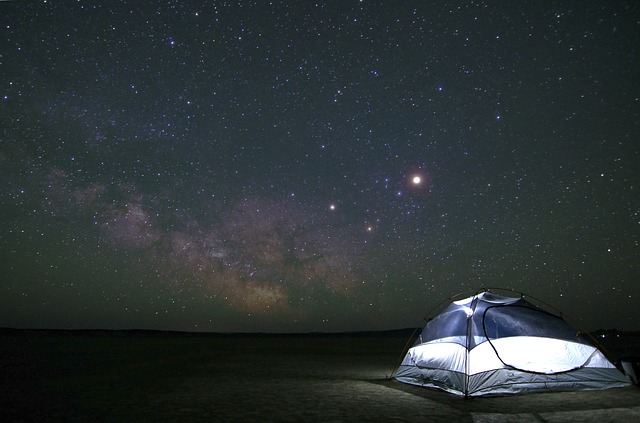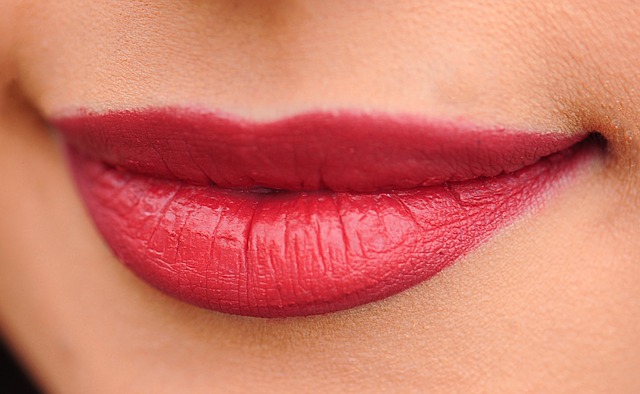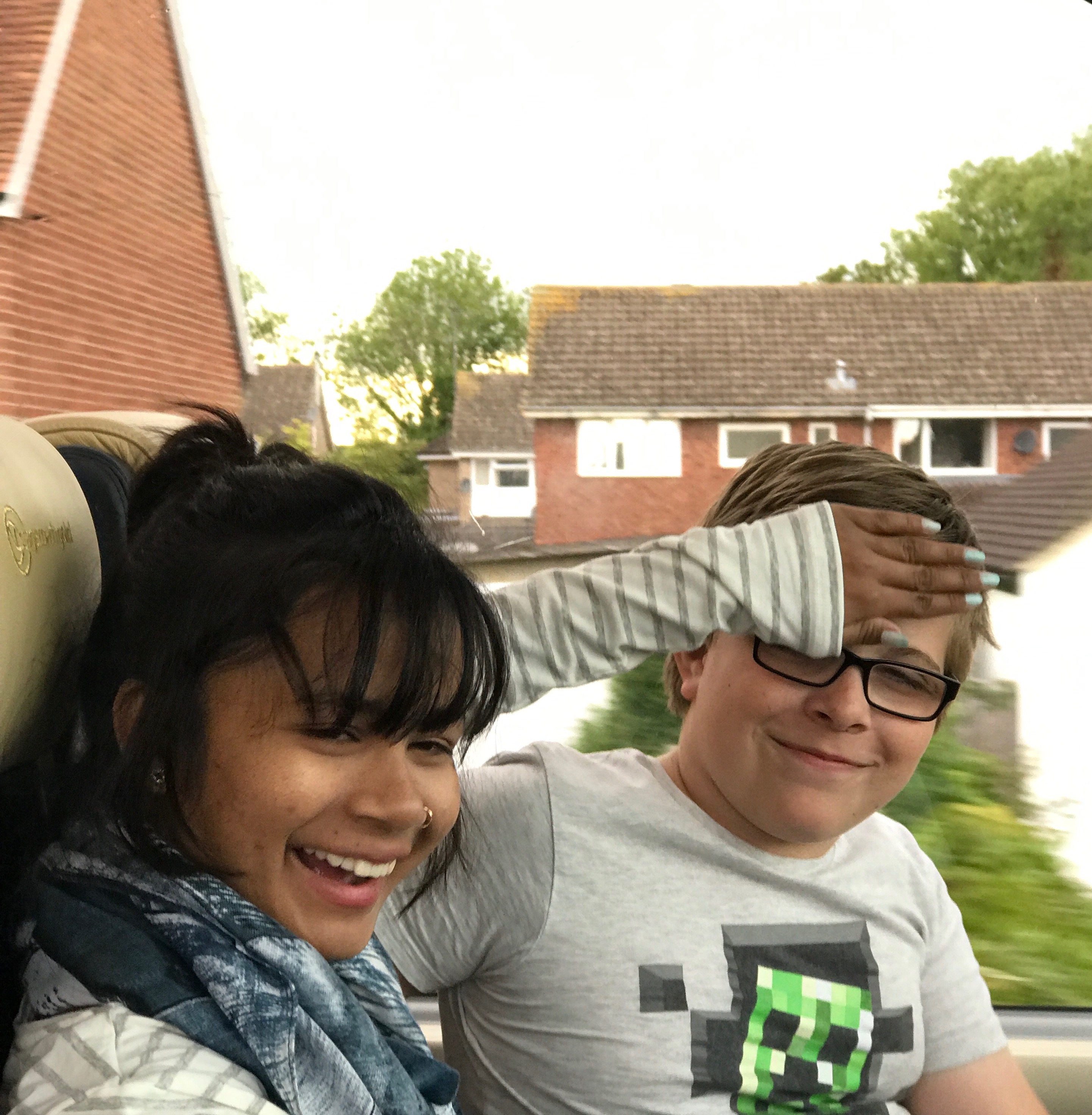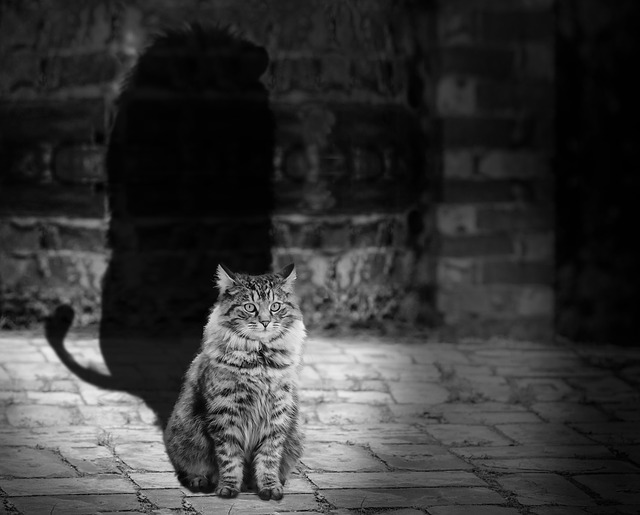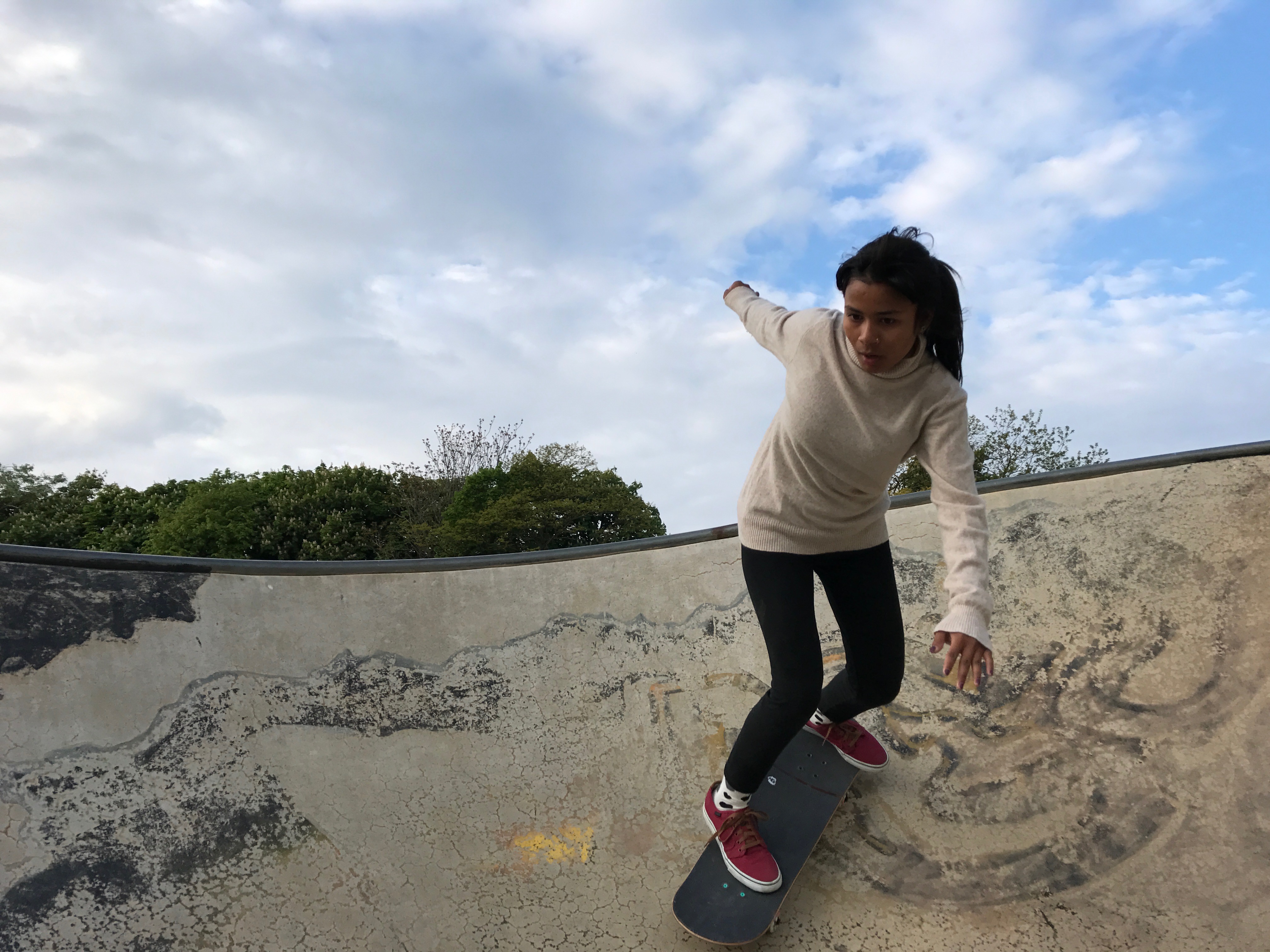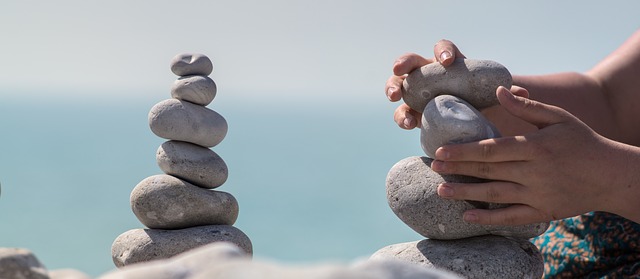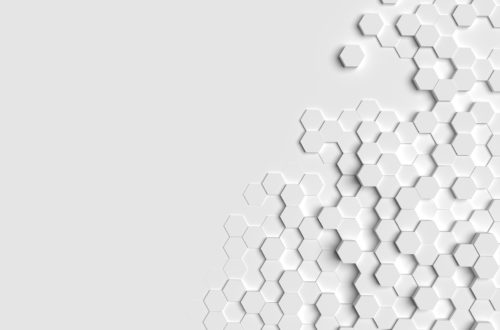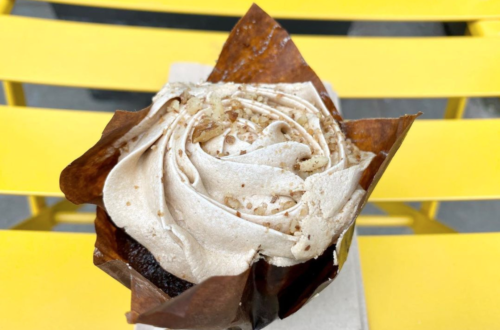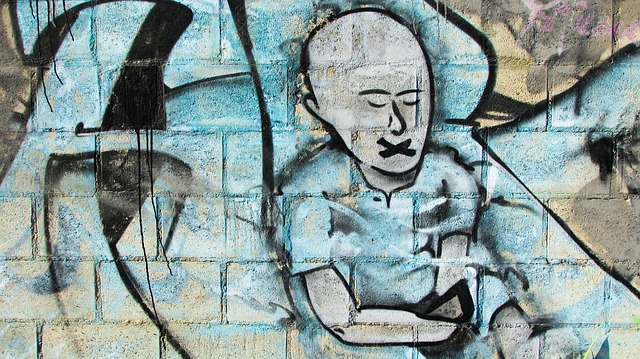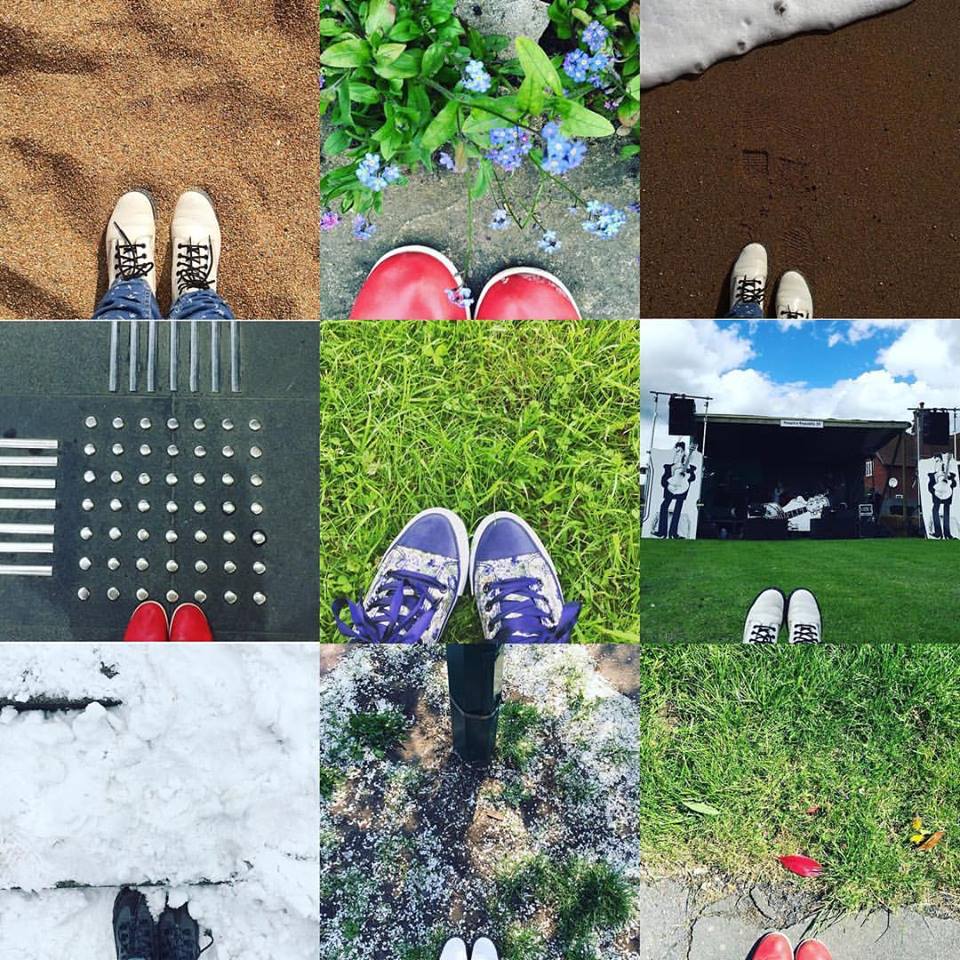DIGITAL
-
Welcome to the OTR Bristol – on mental health, life, choices and awareness
The timing of this post is important to me: I have started my work as a Community Champion for OTR Bristol (Off The Record – the Bristol-based organisation and social movement supporting, promoting and defending the mental health, rights and social position of young people). I am still working in social media. I am still studying and volunteering in counselling. I am still running my own projects (BIGOS UK and Cyber-Wellness Podcast). I am still posting and actually, after a long time of exploration and learning, I am coming back to sharing through this blog too. I am still a mum, a wife, a dog owner, a friend. I have time for all of this and each and every one of those areas of life makes me really happy and fulfilled.
This new job, however, marks a very important moment in my life. It is a culmination of an exploration journey I was on for quite a while and it almost feels like a result and summary of everything I did so far in my adult life. I cannot even explain how it feels – it’s still too overwhelming. All I can say is that I feel it’s the best thing that has ever happened to me. It is also a very natural, obvious next step of my journey and all the choices I have made in my life.
Aware choices are extremely important and I think that’s what this post is all about. It is really well timed for me for two reasons.
On one hand, it is the day before the European GDPR law becomes mandatory and so there is a lot of discussion about how companies, organisations and individuals are to become more aware of how they handle our data. Even though some of us know that this conversation is really delayed and some of its aspects are still really damaging (especially the real impact of the law on young people’s empowerment and voices around tech), I believe it is important to have the conversation around aware, informed decision-making process when it comes to how people use the social web – both as users, as well as service providers. It’s about time we spoke about it.
On the other hand, it is the anniversary of my most favourite speech which pretty much sums up my attitude towards life – “This is Water” by David Foster Wallace. You can listen to the full speech in the link behind its title or watch the shortened, really good visual interpretation of it here, embedded below.
This speech always moves me. It reminds me of my father and the way he raised me into this world: as an aware, emotional and critical thinker. My dad explained to me the importance of awareness, questioning, making time to think but also staying kind to myself and to other people. He showed me ways to restore my energy by learning and feeding my curiosity. He explained to me the power of acceptance so I knew from early on that if I do so: if I accept my limitations and push myself one more step on my journey I will create the most empowering habit of them all: the habit of hopefulness. David Foster Wallace was really relevant at the time of his speech and remains even so today.
We are seemingly facing a crisis in mental health, in technology, in politics, but actually from what I can tell we are really suffering from disconnection and in our isolated self from helplessness. But life and our outlook on it really does not have to be this way. Each and every one of us has a potential to think differently about what we have and what we are deprived off, for any reason. We all have the power of thinking, of awareness, of questioning and that of asking for help.
Which leads me to the main reason why I am writing this post. This week I have joined an organisation and a social movement of people who get this. I’ve met people (young and older) who really care for each other and commit to words, but also actions. My friends tell me that I am perfect for this job, but I think it’s the other way around: this job, these people are the place I belong to. At OTR Bristol people understand that our mental health is not a set of disorders but the water – the invisible, but the crucial power behind how we all function and hopefully flourish too. OTR Bristol is a place of kindness, openness, growth and hope. It’s not a place for naivety, nor ignorance – it actually requires a lot of critical thinking, commitment and self-growth. It helps ideas, but more importantly, it helps people thrive. In the first three days of my work there I have learned a lot about people and about myself. My attitudes, my ideas, my input were accepted and multiplied. And I have not even started the actual hard work just yet. I know that this is the perfect time for this step in my life – thanks to all the mentors in my life and thanks to my own aware choices. I know that the results of my work will benefit many young people and ripple out to many more out there. I really hope that I can do my best to turn those ripples into waves. I really hope that I will be able to create currents that will help those stuck in the void of helplessness see the water and its benefits. We are all capable of this, it’s just that some of us might need a little help to make it work. That’s why we need to work towards togetherness and connection, and we really need to look out for each other. The unique places like the OTR Bristol are already doing it and so this is my little contribution too. I hope I will do it well.
-
Why Cyber-Wellness Podcast?
You might have seen on social media channels that I am currently working on a podcast investigating the impact of digital technologies on our wellbeing.
Here is a little bit more background I have written for the podcast blog – the full article is here.

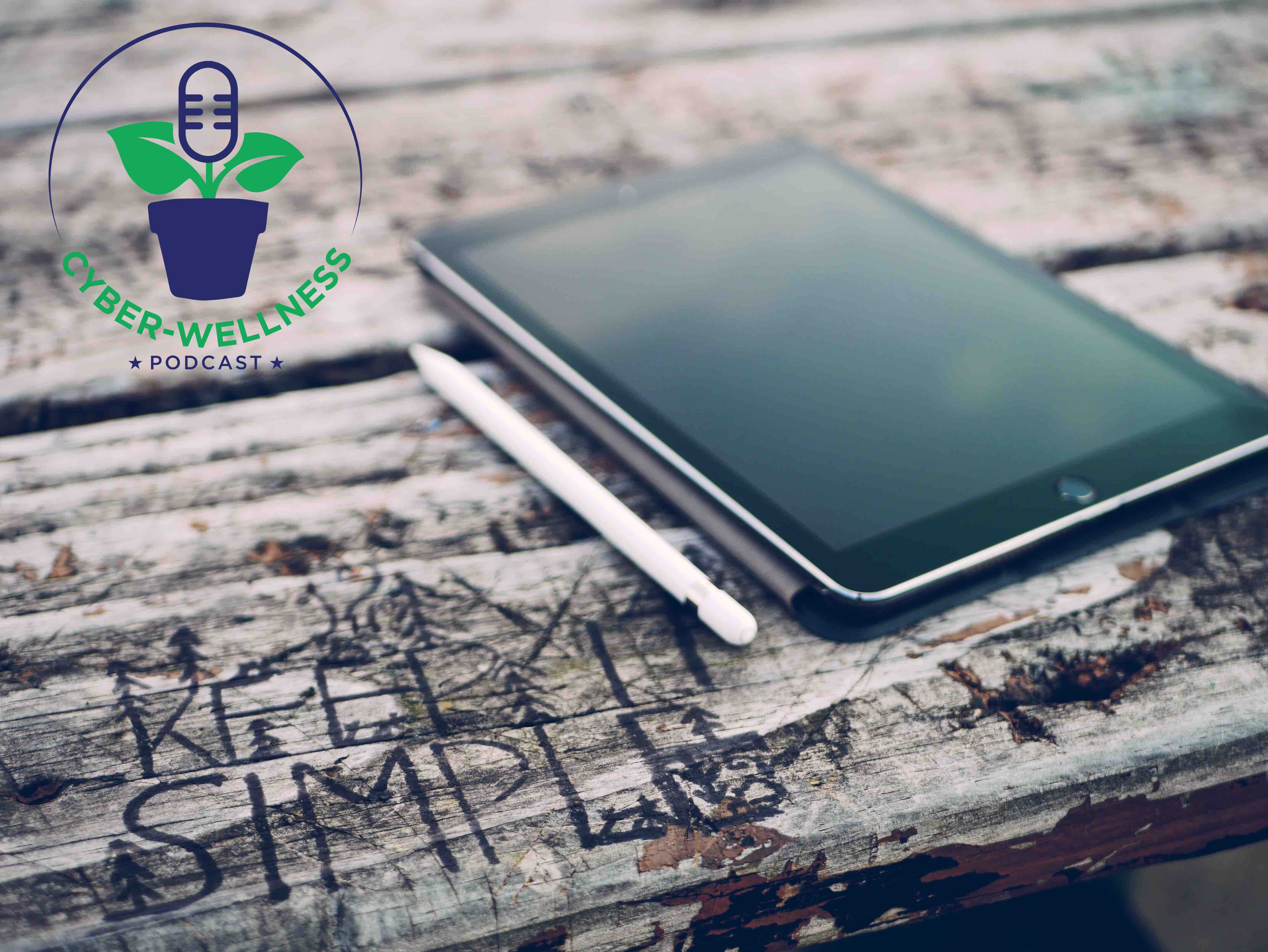
___
Cyber wellness is a combination of two concepts: digital literacy and wellbeing. The concept is currently widely used in Singapore by the Ministry of Education for digital literacy projects for young people at schools to ensure that they are all using the web safely but also proactively make the most of it.
There is a lot of discussions now, in 2018, about the increasing importance of mental health and the negative impact of the web on our health, but we feel that conversations are not balanced. On one hand, we have technology developers and providers, practitioners and fans promoting and enjoying the digital landscapes. On the other hand, we have regulators, educators, health professional and parents who worry about the impact of technology on children,m young people and on adults.
In January 2018 WTO introduced gaming addiction as an official disorder. America’s Association of Psychotherapists included the Internet Gaming Disorder in its DSM-5 pointing out the need for further study. Health practitioners warn us about the impact of screen time, FOMO, isolation and gaming addictions. New game addict retreats appear on the market all around the world.
Technology is used to improve our health and mental health. We see smart tech and health monitoring devices entering our everyday lives. We see health data collected via the main mobile platforms and used to improve research. We see medical field benefiting from various areas of tech innovation. We use apps to improve our every day health and wellbeing: fitness, diet, mindfulness, gratitude and creativity.
The common discourse is focussed mainly on the negative impact of digital on health, but it is based more often on myths than actual findings. Scientific research on the impact of digital technologies on various aspects of our wellbeing is still very rarely considered in the public discourse.
Cyberpsychology is a relatively young science studying important themes like comparison and low self-esteem, depression, social isolation, negative relationships, FOMO (fear of missing out), sleep deprivation, addictive behaviour, eating disorders, social media and ADHD, positive correlates of social media, social media and memes, psychotherapy in cyberspace. Since 1995 we can read about it in the Journal of Computer-Mediated Communication. Since 2007 we can enjoy their findings in the Cyberpsychology: Journal of Psychological Research on Cyberspace. There is also the Journal of CyberTherapy & Rehabilitation, as well as Cyberpsychology, Behaviour and Social Networking journal.
The impact of the Internet on our wellbeing is also included in our very own UWE Psycho-social research here in Bristol and specific areas of UWE work – for example, work done by Dr Amy Slater and her team around body image.
In Oxford, Dr Andrew Przybylski researched the impact of online games on children. His research showed that a moderate amount of online gaming resulted in better-adjusted children that those who did not play any games at all – which can be linked to the new media but also lifestyle our children grow up in. Sonia Livingstone described the changes in family life and the new media landscape in her 2002 book: “Young People and New Media: Childhood and the Changing Media Environment” describing area of family life we sometimes discard but that have a significant impact on our media consumption: for example the fact that our children grow up in isolation from their peers in the offline world (driven to school, taken to groups, not allowed to socialise freely offline) so the online channels provide them with new, alternative ways of connecting with peers, playing and learning. Susan Greenfield (also based in Oxford) wrote a good summary of the relevant research in 2014 in her book “Mind Change: How Technologies are Leaving Their Mark on Our Brains” only to conclude that way more research is needed to understand this topic. She herself continues her work in this area.
Sonia Livingstone based in London is since a few years now involved in the EU wide study on the impact of tech on children and families. The research results are published in the regular EU Kids Online reports and impact the way the International Safer Internet Day is celebrated. In the recent few years, we have noticed the purely negative sentiment shifting towards the need to build strong digital skills amongst both children, as well as their parents. In February 2018 Livingstone and team published finding showing the positive impact of technology on the quality of life in families but also increased the need for parents to know that their children are actually safe online.
Dana Boyd, an MIT researcher focussing on teenagers and their use of social media, points out that we need a good definition of what we mean by “safe Internet”. She published her findings in her book in 2014 “It’s Complicated: The Social Lives of Networked Teens” describing her extensive research in important areas: privacy, online identity, addiction, dangers and bullying, inequality and literacy – and generally asking young people how they manage their lives in those new channels. Her findings are certainly not as negative as the discourse in the mainstream media.
Jane McGonigal, American game designer advocates the use of digital technologies to channel positive attitudes and explains a lot of positive effects of games in her 2001 book “Reality is Broken: Why Games Make Us Better and How they Change the World” tapping into findings from also a fairly new field of positive psychology.
At the same time, the public discourse around mental health and wellbeing increasingly mentions the negative impact of digital technologies: information overload, need to rest from screens, fear of missing out, online bullying, addiction to online games and the overwhelming sense of increased social isolation. We do also see increased levels of addictions related to the Internet and studies showing that the social web tends to exaggerate the tendencies we already have (if they are positive, the impact of the web is positive too; if our habits and tendencies are harmful, the social web might make them more impactful too).
In the marketing and business world, it is widely recognised that addiction to mobile and other tech devices is fuelling stress and burnout and has been linked to anxiety and depression. Increasingly, a number of research and partnership initiatives are being put in place to address the positive and negative effects of cyber-overload and how to achieve a state of cyber-wellbeing.
April 2018, saw the Pew Research Center launch their extensive report: ‘The Future of Well-being in a Tech-Saturated World’ which explored at length the positive and negative aspects of digital life on people’s health, mental fitness and happiness. While in May 2018, Thrive Global, set up by cyber wellbeing pioneer, Arianna Huffington whose mission is to end stress and burnout, announced an important partnership with MindShare Partners, whose mission is to ensure that those suffering from mental health and burnout conditions in the workplace get heard and helped to thrive. Just these two key areas of activity in the cyber-wellbeing arena from Pew Research and Thrive Global in Spring 2018 – let alone myriad other similar initiatives – are a clear indicator that the complex topic of cyber-wellbeing is driving an ongoing debate around the world. As podcast authors of Bristol’s Cyber-Wellness Podcast, we hope that our own podcast findings can serve to make a small contribution, from Bristol to the global debate around cyber-wellbeing.
The mental health provision in the UK is based on the 2008 New Economics Foundation report “5 Ways to Wellbeing”. The report outlines core recommendations for improving our overall well being and serves as a basis for the overall provision of talking therapies around the UK until today. Connect, keep active, take notice, keep learning and give are recommendations resembling core findings of positive psychology. The report also mentions the value of nature, healthy diet and meaningful work. Many of those recommendations are aligned with findings published by Johann Hari in his book “Lost Connections: Uncovering the Real Causes of Depression – and the Unexpected Solutions” about underlying causes of depression. Harri suggests looking at the roots of our mental health problems and instead of disconnecting, even more, finding ways to reconnect with our communities, meaningful work, values and with nature. We do not really know if digital technologies would play a positive or negative role in this process.

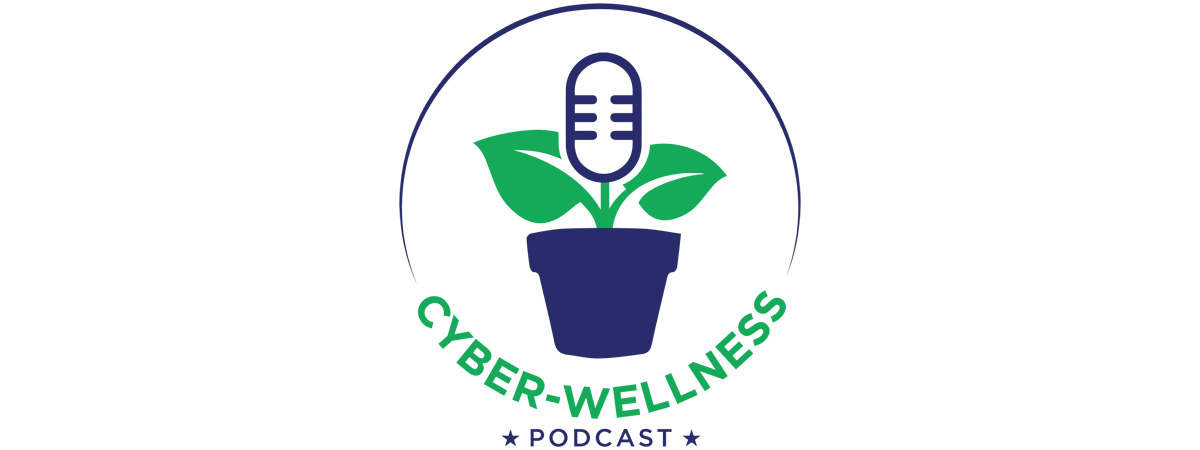
__
You can find out more about the Cyber-Wellness Podcast here. You can listen to the first episodes here.
-
On Facebook
So it’s time to comment on Facebook’s changes marking (for many) the first signs of the social media bubble bursting. Most of my clients and friends are asking me for my opinion about it so here it is.Mark’s post is here. In this post, the word “well-being” seems to be at the core of his sentiment but I fail to believe in this – I still see the videos interrupted with adverts and intrusiveness of advertising all over my stream. So this is obviously PR talk and we need to take it with a pinch of salt, but what is Facebook really trying to convey? Mark’s post does contain clues as to what will happen to brands and users in the upcoming months – and for the organic users, it’s not good news, for those who paid for ads, well, not good news eighter. Facebook will promote more user interactions and less organic content from brands – that is clear. To some extent, it was something they have always tried to do already, it’s not new – the scale of the change might be though. Pages will definitely see a drop in organic traffic, some pages will see a huge drop – that is clear. Posts from pages will not move all together to a separate feed on our Facebook walls (as per their test in some countries earlier this year) but we will see less of those organic posts from pages, so brands will suffer in organic visibility, ergo they with HAVE to pay for adverts. Posts from brands with no reactions will disappear from users feeds. Mark states the aims of their new strategy – “focusing on helping you find relevant content to helping you have more meaningful social interactions” – a strategy which will still connect users with relevant brand content, just differently. The way, we social media marketers see it is this: Facebook wants us to pay more money for the advertising. (Here is a good summary of Mark’s post in this context, one I agree with).I looked at some of the initial reactions. Social Media Examiner’s panicky video represents the view of marketers and it is fair to say that it is a huge blow to those who post over ten posts/day on their pages with limited reactions and focus mainly on organic posts (no advertising). I am attaching a similar reaction to mar’s posts explaining that impact. Jeff Jarvis also wrote a post about the impact of this algorithm change on news sharing organizations here. Robert Scoble already has the new version of the feed and posted his first post initiating a series of interesting comments here – I recommend some of the comments there. But ultimately what we see in here is the end of the organic reach on Facebook as we know it. We will see some of it, but I suspect not much.I also see that Facebook pages now offer groups as an option and in the last few days, the options there improved significantly. So we will be pushed to set up communities at the back of our fan pages to increase the organic feel of our brands. Is Facebook trying to compete with LinkedIn groups? Because at the same time LinkedIn is rolling out major changes in those – adding group posts to the main network stream and improving groups as they are?I don’t think this announcement helps Facebook’s reputation at the moment but considering an average network user, it might just work. I have received two nudges to check how “safe” my Facebook is (with a link to the usual privacy settings) – this type of user manipulation does not work for me but will work for many. We see interesting times when companies providing the major social media channels need to re-think their models and we are all watching. There is a lot we don’t know and it’s not a good feeling. I liked Facebook and other tools much better without any algorithms. I want my old Twitter and Instagram back – it was fun and it made sense to see everything in chronological order. Now, we are working a bit in the dark and we all need to make choices that are safe and sensible for our brands but those choices are becoming harder and harder.Putting ethics and politics aside (one for a separate post) at the end of the day, as users we are trading our data and our conversations in exchange for free networking opportunities and new connections – so it’s down to each and every one of us to make them smart and care for our own wellbeing. I really don’t think Facebook should be in charge of those choices – I do not need their help. I do not have to be on Facebook, yet I still benefit from using it. We will see for how long. We will see if the Facebook team will ever learn that the path their taking (the money driven one) is not sustainable forever. And we will see what else is on the horizon. It would be foolish to invest in just one channel. -
WHO announcing gaming addiction as a disease
What a start to the year. The World Health Organisation added gaming addiction to their list of disorders due to addictive behaviours defining it as follows:
Gaming disorder is characterized by a pattern of persistent or recurrent gaming behaviour (‘digital gaming’ or ‘video-gaming’), which may be online (i.e., over the internet) or offline, manifested by: 1) impaired control over gaming (e.g., onset, frequency, intensity, duration, termination, context); 2) increasing priority given to gaming to the extent that gaming takes precedence over other life interests and daily activities; and 3) continuation or escalation of gaming despite the occurrence of negative consequences. The behaviour pattern is of sufficient severity to result in significant impairment in personal, family, social, educational, occupational or other important areas of functioning. The pattern of gaming behaviour may be continuous or episodic and recurrent. The gaming behaviour and other features are normally evident over a period of at least 12 months in order for a diagnosis to be assigned, although the required duration may be shortened if all diagnostic requirements are met and symptoms are severe.
Hazardous gaming can be also found in the section on factors influencing health status or contact with health services:
Hazardous gaming refers to a pattern of gaming, either online or offline that appreciably increases the risk of harmful physical or mental health consequences to the individual or to others around this individual. The increased risk may be from the frequency of gaming, from the amount of time spent on these activities, from the neglect of other activities and priorities, from risky behaviours associated with gaming or its context, from the adverse consequences of gaming, or from the combination of these. The pattern of gaming is often persists in spite of awareness of increased risk of harm to the individual or to others.
Both definitions are quite sensible as they contain the limitations and definitions of healthy and unhealthy gaming habits, related to both online and offline gaming too. The initial reactions are obviously varied, but it’s a very brave step – one which is really difficult to judge at this stage because we simply don’t seem to have enough of research on the impact of online gaming and because online gaming is a very complex topic – one which is often demonised, but rarely taken seriously.
When the Americal Psychiatric Association contemplated adding Internet Addiction Disorder to their fifth edition of the Diagnostic and Statistical Manual of Mental Disorders(DSM–5) it became apparent that we are dealing with a complex set of potential mental disorders altogether. I strongly recommend this short but insightful summary by Mark D. Griffiths. In the end, after a consultation with the industry and look at available research (for example some here) they decided not to include the Internet Addiction Disorder in the DSM-V, but made a strong recommendation that the further research is needed. They also changed the definition of the gambling as a behavioral addiction rather than as a disorder of impulse control which also allowed them to include the internet gaming in this area. Internet Addiction Disorder does have a wiki page and is not a new term but it is still handled carefully by health professionals and the relevant bodies.
So today WHO announcing a new definition of gaming addiction and adding it to the list of mental disorders send a strong message to the world.
In this entire discussion, you will see three groups of voices. On one hand, there is the gaming industry, Silicon Valley, tech enthusiasts, and professionals, but also researchers who see a positive impact of online gaming (on kids in the UK you will find Sonia Livingstone doing a lot of work with EU too, in the US for research on youth online check out Danah Boyd, for positive impact of gaming Jane McGonigal and her twin sister Kelly, both here). On the other side of the spectrum, you will see media, governments, legal institutions and the general public using the online gaming as an easy scapegoat for issues that are complex and often unaddressed (problems with social isolation, self-esteem, anxieties, toxic relationships, aggression, poverty etc). And in the middle, you will find health professionals (GPs, therapists, youth workers even) who are expected to provide support to the community with a very little good research and stand from leading organisations, oftentimes simply not knowing what to do.
Gaming is not exactly a tabu topic but the opinions about it are divided and not always informed, which does not help the actual individuals who enjoy gaming and feel a positive impact of it, nor the gamers who struggle with addictive behaviours but simply cannot seek professional help. There are increasingly more and more reahbs, camps and other ideas to help, but an average parent or spouse might suffer and struggle because the web and the mainstream media scare us, terrify us even and simply don’t offer any practical solutions.
So when I mention that WHO’s move is brave I am really worried because an average web user or a member of the general public will most certainly now use this fact to demonise the online gaming even more and leave the suffering, addicted individuals to their own devices or simply switch the wifi off. This is not helpful as it does not address the roots of the problem. It makes it worse. On the other hand for the health professionals and researchers, the WHO’s decision opens the doors for more research and more action to offer professional support and almost forces governments to actually look into this and provide funds for that support. Initially it will be directed at the overall gaming disorder, of course, but the more we study it, we will realise its complexity and learn to separate the old problems (anxiety, social isolation, bullying etc) from the new ones (addictive feedback loops of some games, social media related complex reinforcement of self-esteem issues etc). We will learn how to talk about both Internet addictions and gaming addictions too.
I remain hopeful. I really worry that a lot of kids and adult games will suffer from a lot of negative labeling, but I hope they have networks to support them in this first phase. In the long run, I think this is a good move, a natural step in the process of unpacking something new. Something that has an impact on us but it’s so early. We simply don’t know what impact it has on us. It might be that one day we will realise that the web is just like the street – an avenue on which other mental issues, the already known ones, are born. It might be that the technologists are a bit blind and we will discover new mental disorders and learn to support people suffering from them.
What we all need to remember is that every one of us is different and we all react to new stimuli differently (well but also badly). Those of us who suffer from bad habits and see friends and children falling into the abyss of useless gaming really need to have a good look around to identify the why’s and help but also look at the positive impact of online games and accept it – which is not easy. Those of us who work in tech, gaming industry or simply are advocates of innovation, need to learn to accept the fact that every new piece of innovation can come with its curses. We cannot pretend that we don’t know people (of any age) who have suffered from too much gaming in their lives in some way.
So I do like the WHO’s definition as it defines the scope of the impact of the actual disorder – it looks at the negative impact on health and it does give a year to diagnose an individual too. But we have to remember that every new definition can very easily turn into a label and labels are not nice. They stop us from seeing the human behind it. Let’s hope we won’t go down this route. Ultimately it will boil all boil does to how open those discussions are going to be and how informed and research based the choices of decision makers are going to be.
As a student therapist, I am happy to see that the health professionals will hopefully receive more support in this new and already fast-changing area of our lives.
-
My 2017
#2017bestnine was a busy hashtag this year and I am noticing that many people posted those visual annual reviews way earlier than in the past, some even before Christmas. I am still trying to oppose the trend of earlier and earlier celebrations so my best nine visuals were posted today.

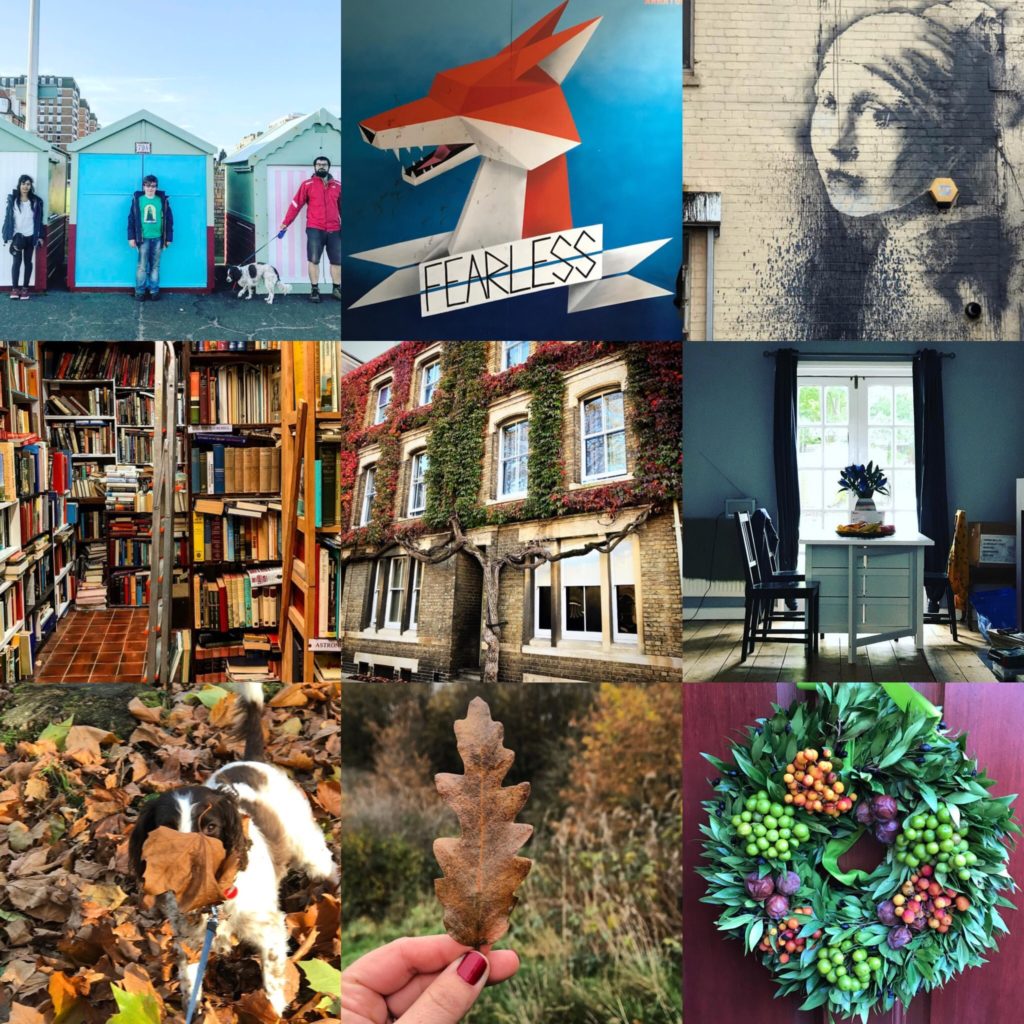
This year was really busy and a lot has changed in our lives. I finished a school. Moved home. Re-connected with close friends. Started new studies. Re-connected with reading more than ever. Still loving nature and dog walks.

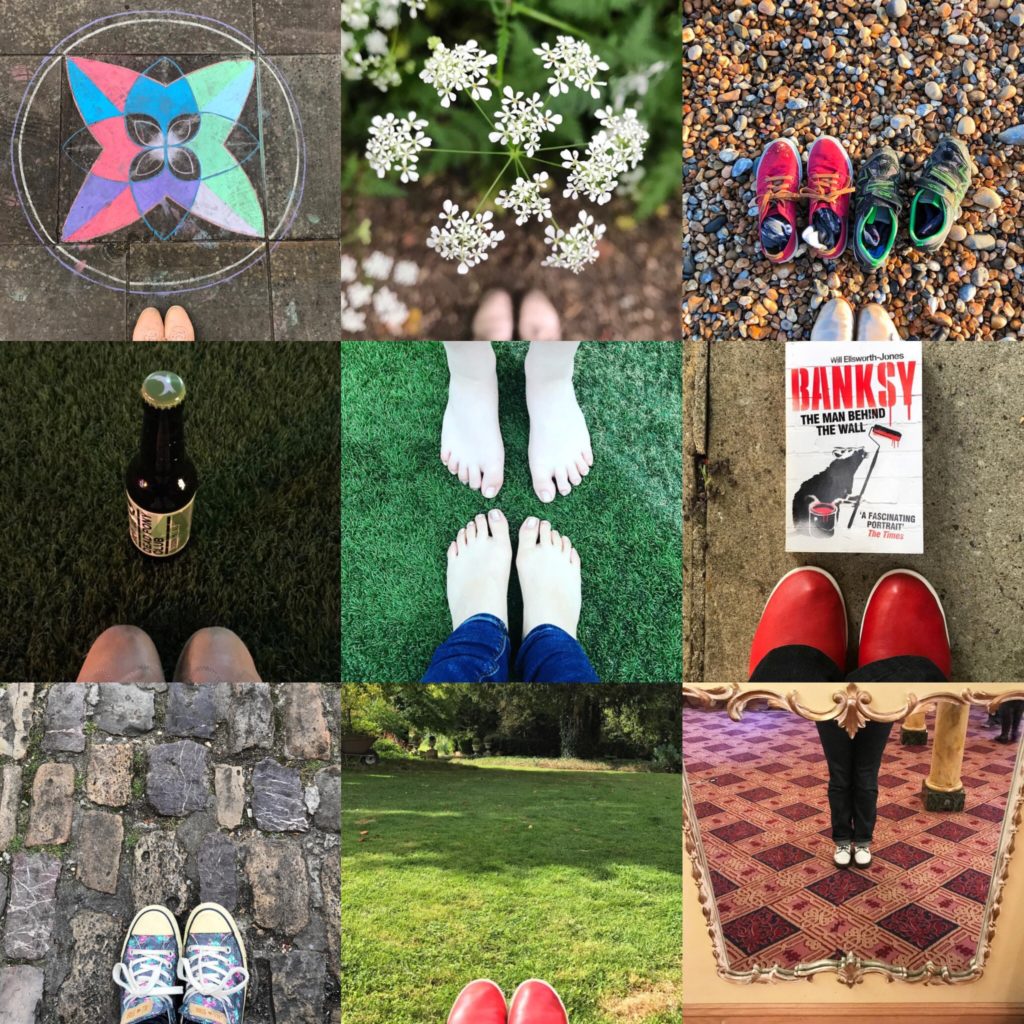
I do have my shoeselfie #2017bestnine too because those images remind me to be grounded in reality and aim for the stars;)

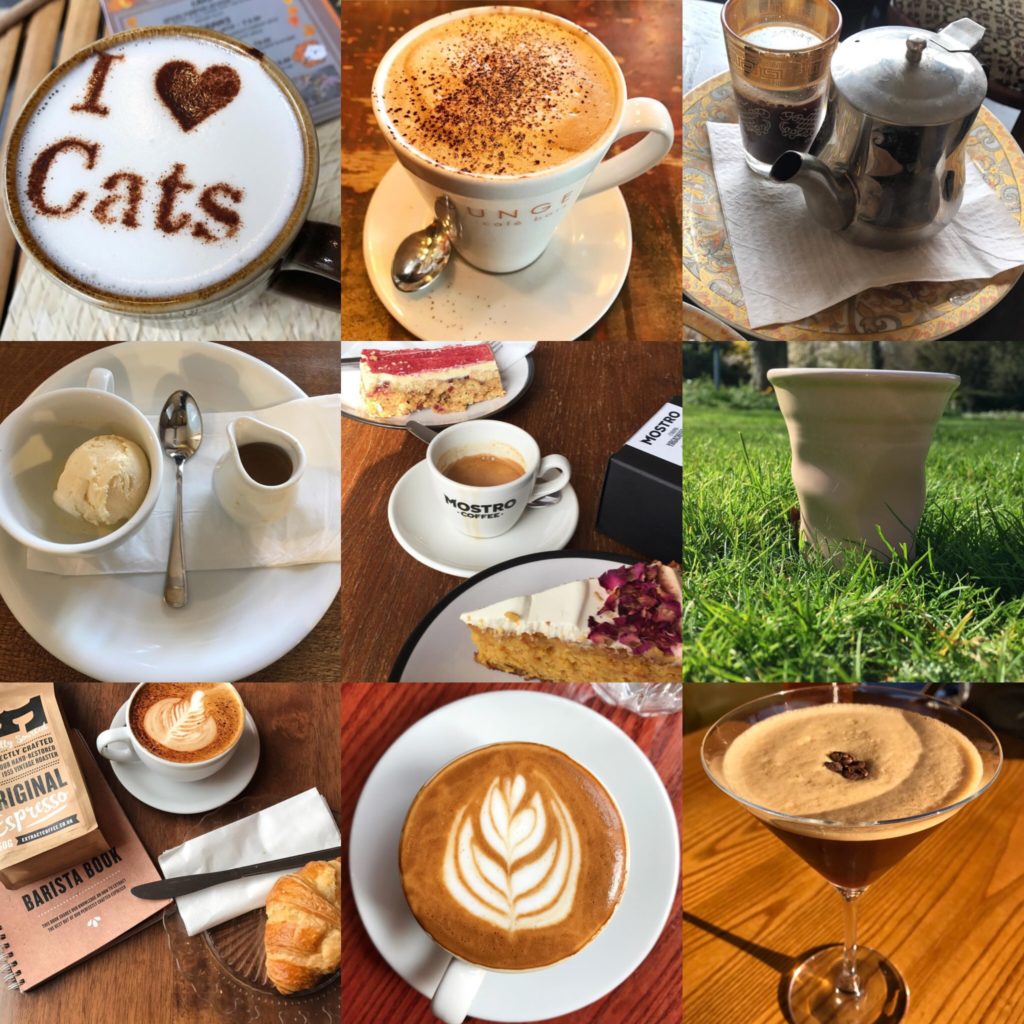
I had wonderful moments over coffee, tea, hot chocolate and those photos always remind me of the friends and family I am blessed to share those wonderful times with.


I have spent some time on a creative Instagram project too. @Mylittlecoffeeblog is a reminder that little treasures are all around us, we just need to stop and remember to be playful, childish but also grateful for nature. I used to bring small tokens of it home when I was a kid and this year I started to do it again. But when home I would drink a cup of coffee and capture the moment for this Instargam account.

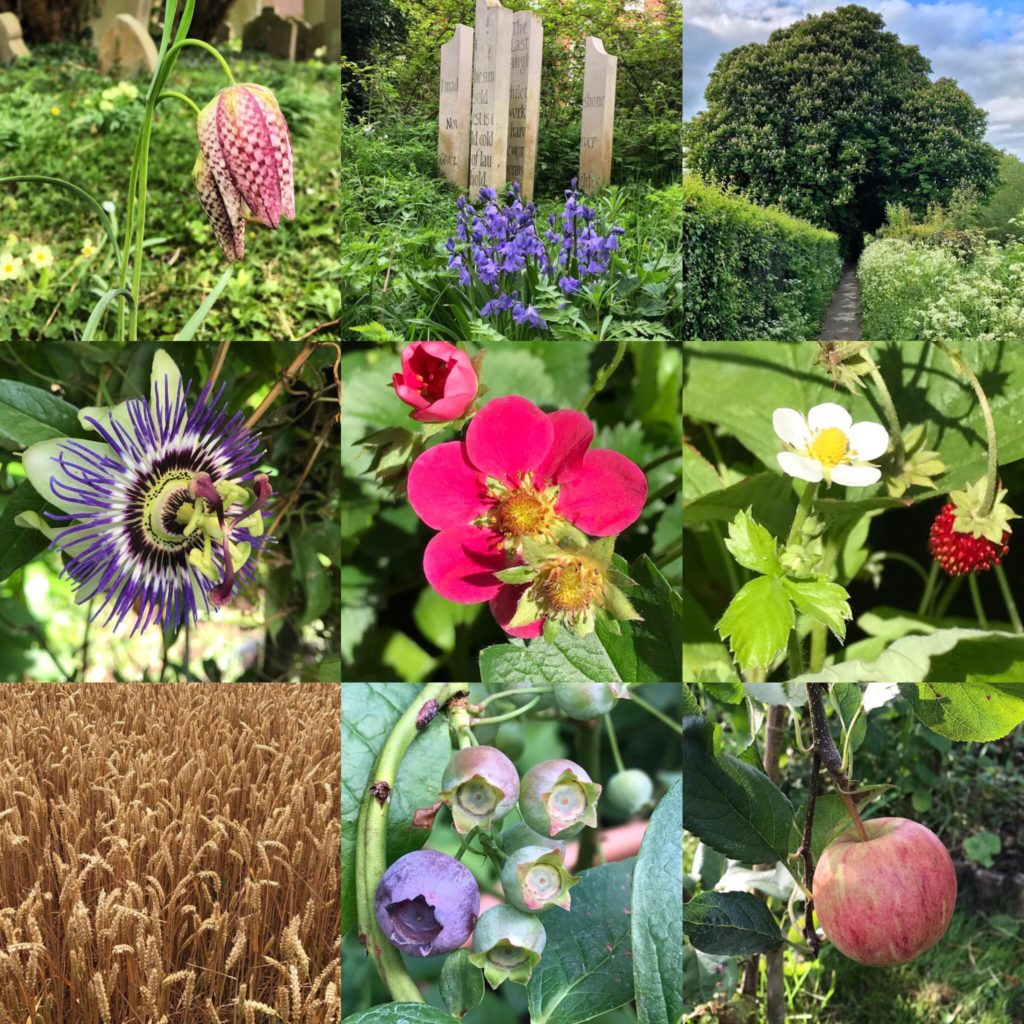
But the entire year was full of flowers, fruit, trees…we said goodbye to our lovely allotment 108 and started 2018 with a Bristol allotment application, although I am told this can take a while. I cannot wait for spring because our new home has a lovely garden too. We were lucky that we could bring most our plans from Wantage to our new home. This year I focused on plants, fruit, and veg from my childhood. I grew blueberries, wild strawberries, apples even. I grew plants that in the past would be so exotic – like passion fruit for example. It always makes me happy to create those new forms of life.

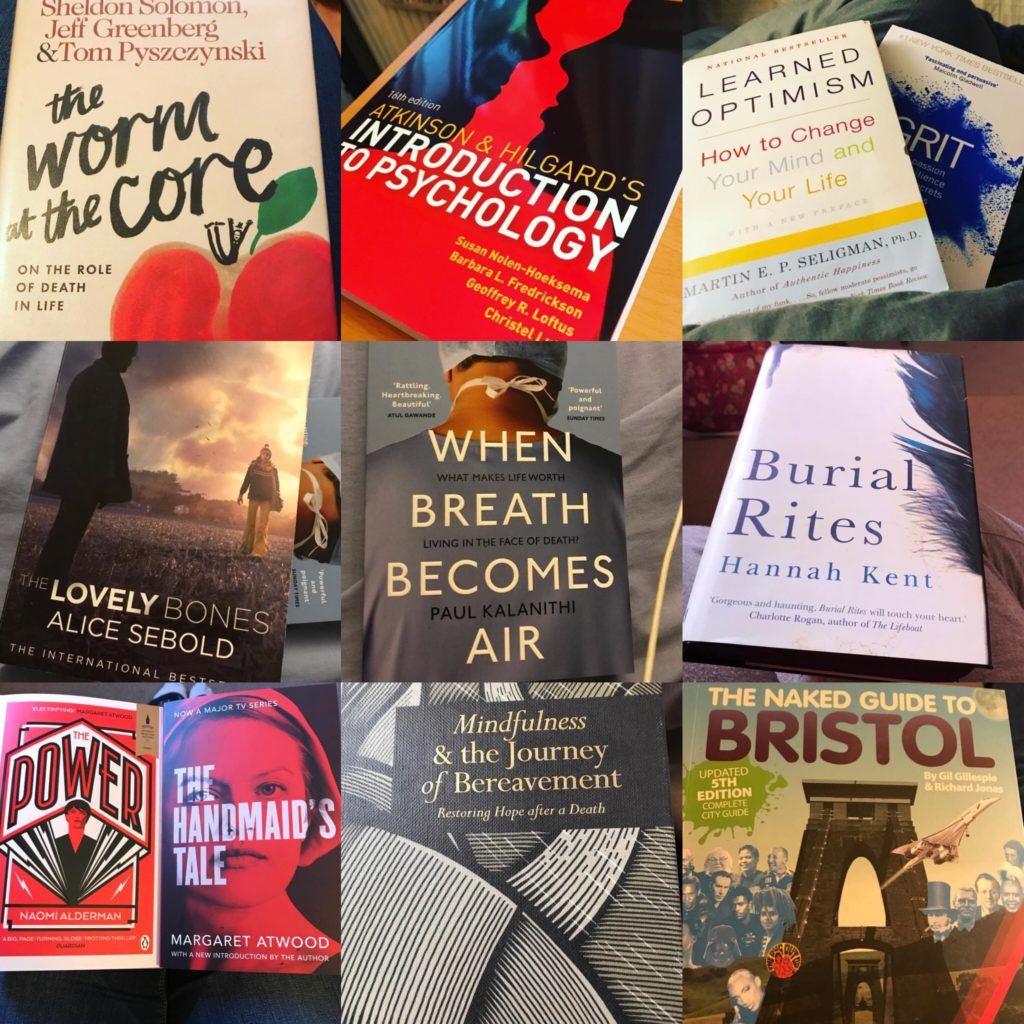
And finally, the most important development of this year was reading. I was always reading but since university, I did not really make time for it so now I am back to a lot of reading due to my studies. Like with any other habit, the more I read, the more time I find for it. I read a lot about death and love this year. I wonder what core topics for 2018 will be. We will see, but I think 2017 was so rich and so much has shifted that I will carry all those moments in me for quite a long time.
Thank you to each and every single person who made this year so rich and who was there with me and my family.
-
Asha’s story – final summary
It’s been over a month since Asha left the UK. All of our friends are asking about the impact of her visit on us and on her so here it is in few points.
- Great adventure – it was really fun to have Asha around and show her all the people and places important to us. We traveled more in that month than in the entire year, I think and met up with most of our friends which is always a nice feeling. It feels as if it was us who was on holidays really. We did new things. Ate new meals (a lot of new Indian food, for example) and prepared new meals too.
- Connections – We have developed stronger connections with similarly minded people. When you live surrounded by friends and know a lot of people in a small town, connections become part of a routine and daily reality. But when a visitor like Asha “disrupts” this routine with unique specific demands, connections with similarly people become suddenly intensified. I think Asha brought up the best of all of us and it was a lovely month to all of us.
- Hope – the meaning of her name, actually. I think in the current political climate we all needed Asha with her courage to conquer the world. When I watched her taking deep breaths at the seaside on her first day on a beach ever, I saw a young woman full of hope, dreams, courage and I thought to myself: we all have it in us – despite all the stupid politics, we will be courageous, happy, foolishly heading towards our dreams and one day we will also discover new horizons, just like her. Or maybe we are doing it already, every single day…
- Redefining reality – small, simple things like air conditioning in the car or ability to choose food for dinner were so new to Asha that we had to redefine our reality a bit. We take so much for granted! We discovered the little pleasures of life again and I am sure those little reminders will be here to stay. We are more grounded in our home, garden, town, and country now. More here and now.
- Treasuring the universal – people worried about Asha, we also worried if we are doing enough to make her stay here effective for her studies but at the end of the day we danced, joked, ate, traveled, had fun together. Despite all the differences and a huge reality shock Asha was for that month part of our family and so on the last morning, at the airport, she ran back from the gate and gave her a hug through happy tears.
We will miss her terribly but I hope that in this connected world we can stay in touch! I also hope that one day we will visit her in her village and get to see her reality to.
-
Asha’s story – week 4
Last week! We made a promise to ourselves that we will not cry, we will smile until the last moment together and leave the tears for later;) Last week was emotional for all of us but we had to push hard through it to make the most of Asha’s improving English skills and growing confidence. Tuesday was difficult for Asha – as expected, the three-quarters through her stay the lodging for home and family kicked in. Asha bravely requested a call with her parents and so there were tears on both sides of the line. It’s quite amazing how this short call and chat to parents and friends helped! Asha bounced back quickly and focussed on studies and last week of experiences again (well, with a little help of Facebook friends, Poppy and bubbles! ;))

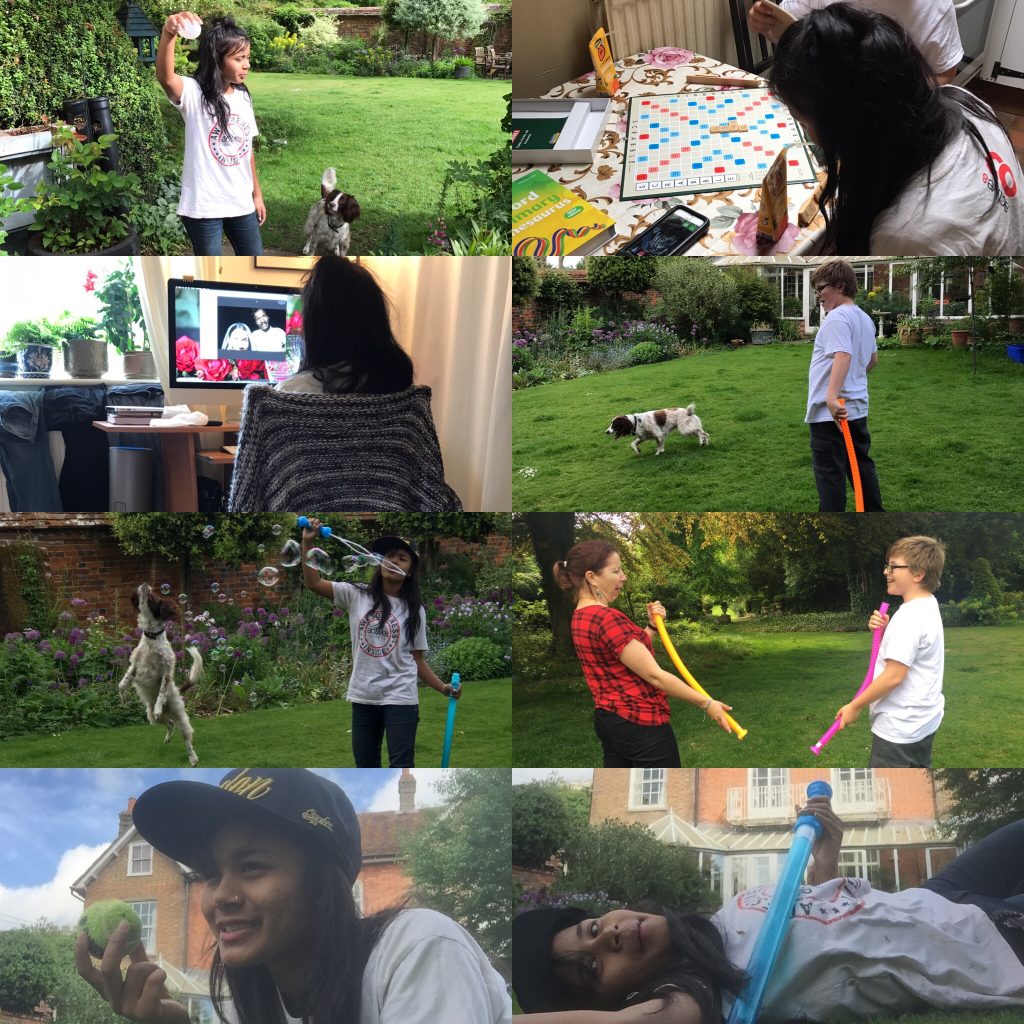
The very same day as the call with her parents, we took Asha to our local youth club for the Tuesday Sweatbox session. This place welcomes over 100 young people each Friday but Tuesdays are quiet and very friendly, so we thought it would be a good way to cheer her up. Asha really enjoyed the place and company – so much so that she responded to my teasing and got up on the stage to perform a full song in Hindi. It was a real little moment of her shining which showcased her energy, talent and determination. Boys and girls from Sweatbox really enjoyed her performance and encouraged her to continue singing in the future.

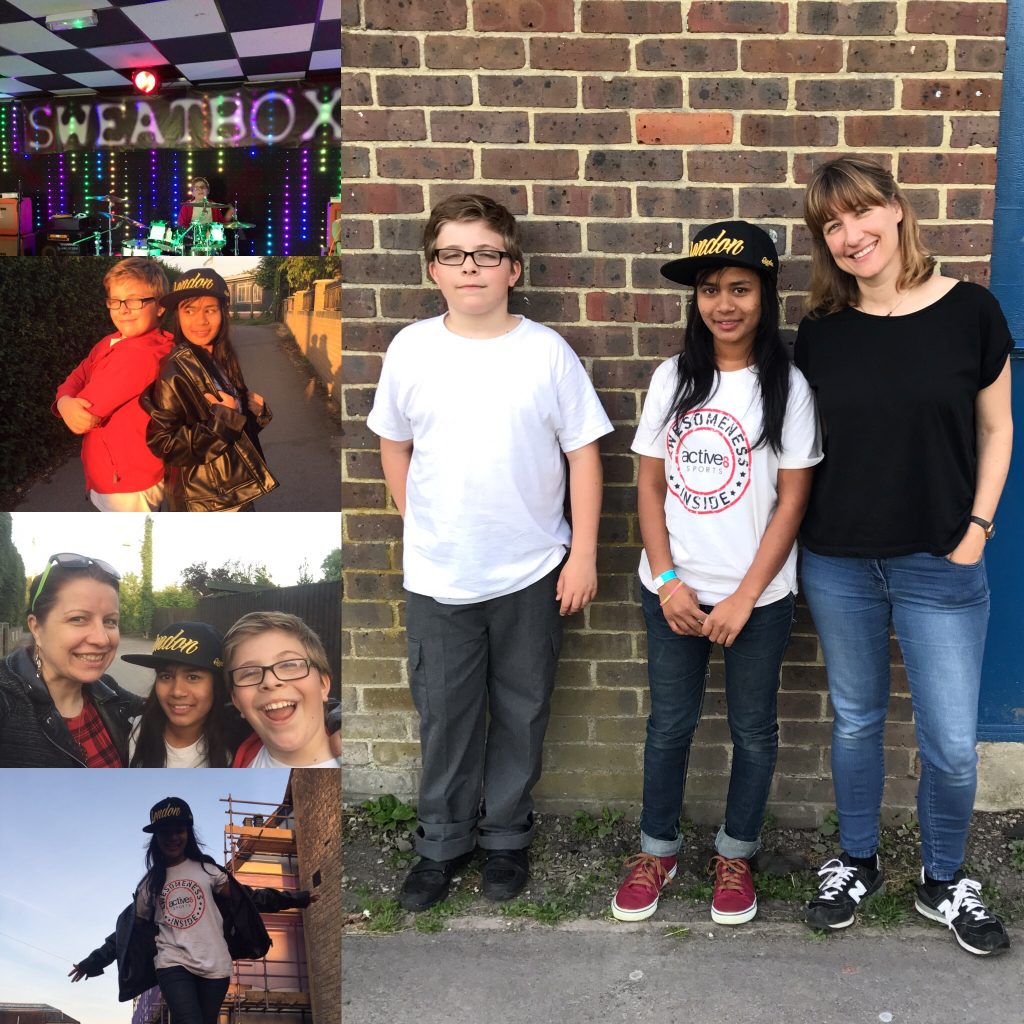
On Wednesday I had a meeting to plan Wantage Summer Festival at our local Vale & Downland Museum so Asha had the opportunity to browse through it and learn about the local history on her own.

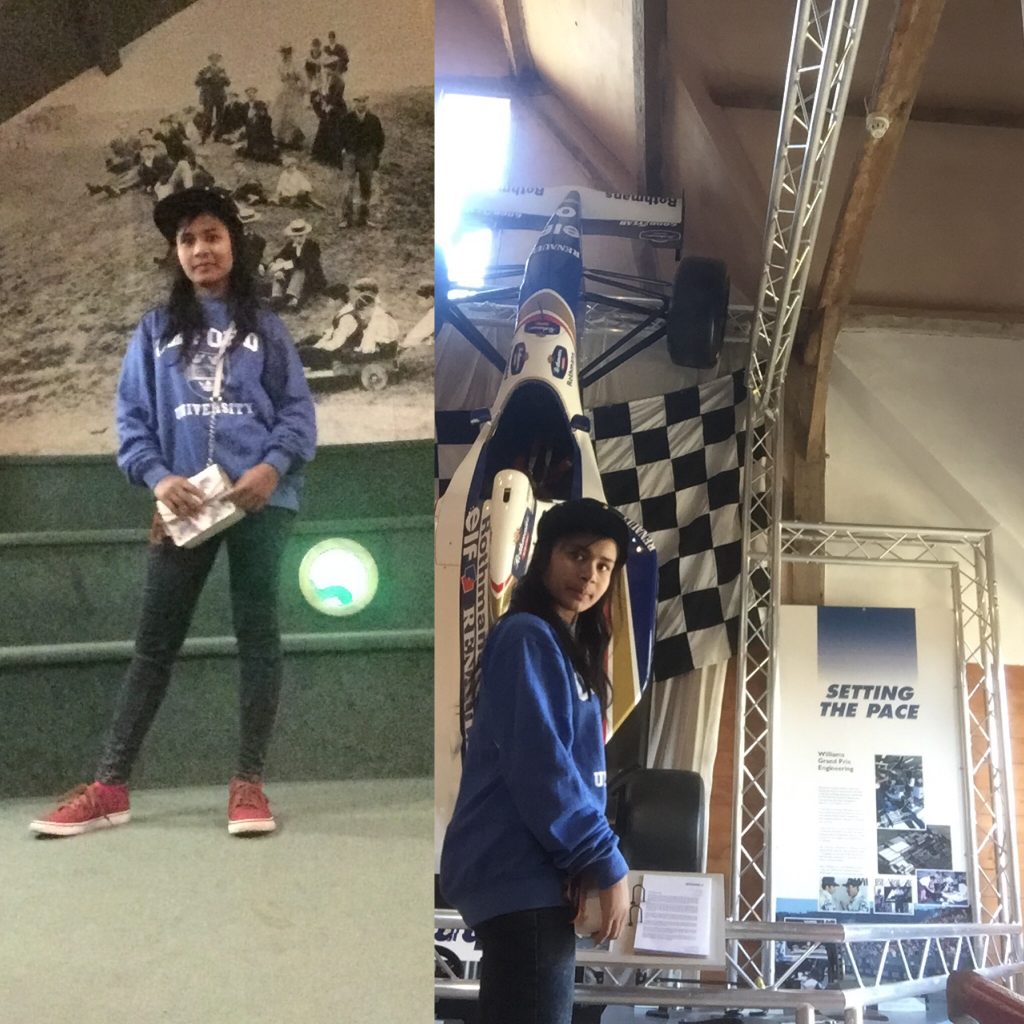
On Thursday Asha learned about Scotland and had a perfect opportunity to test her new knowledge later on – when we visited another friend from Dawid’s school and her friends. A huge thank you to Emma for organising this afternoon and for the wonderful Indian food!

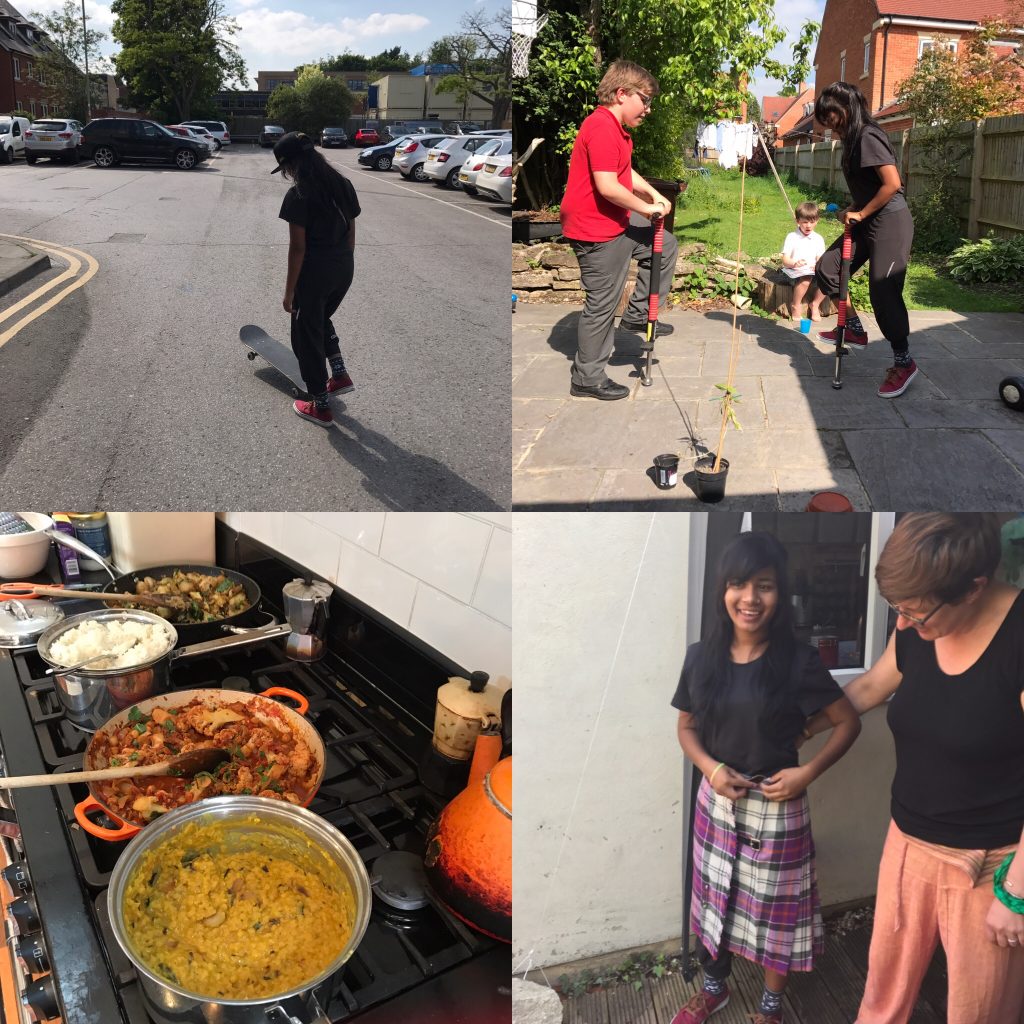
Friday night was a bit of a surprise trip to Oxford. My old friend from Germany, Kristina, visthe UKed UK and told us about our mutual friend, Sarah, who recently moved from Appleton Lock to Oxford Osney Lock. I took kids on the bus again, we walked along the river, talked to narrow boat owners, watched baby swans on the water and finally enjoyed sitting down in the sun at the lock and catching up with friends.

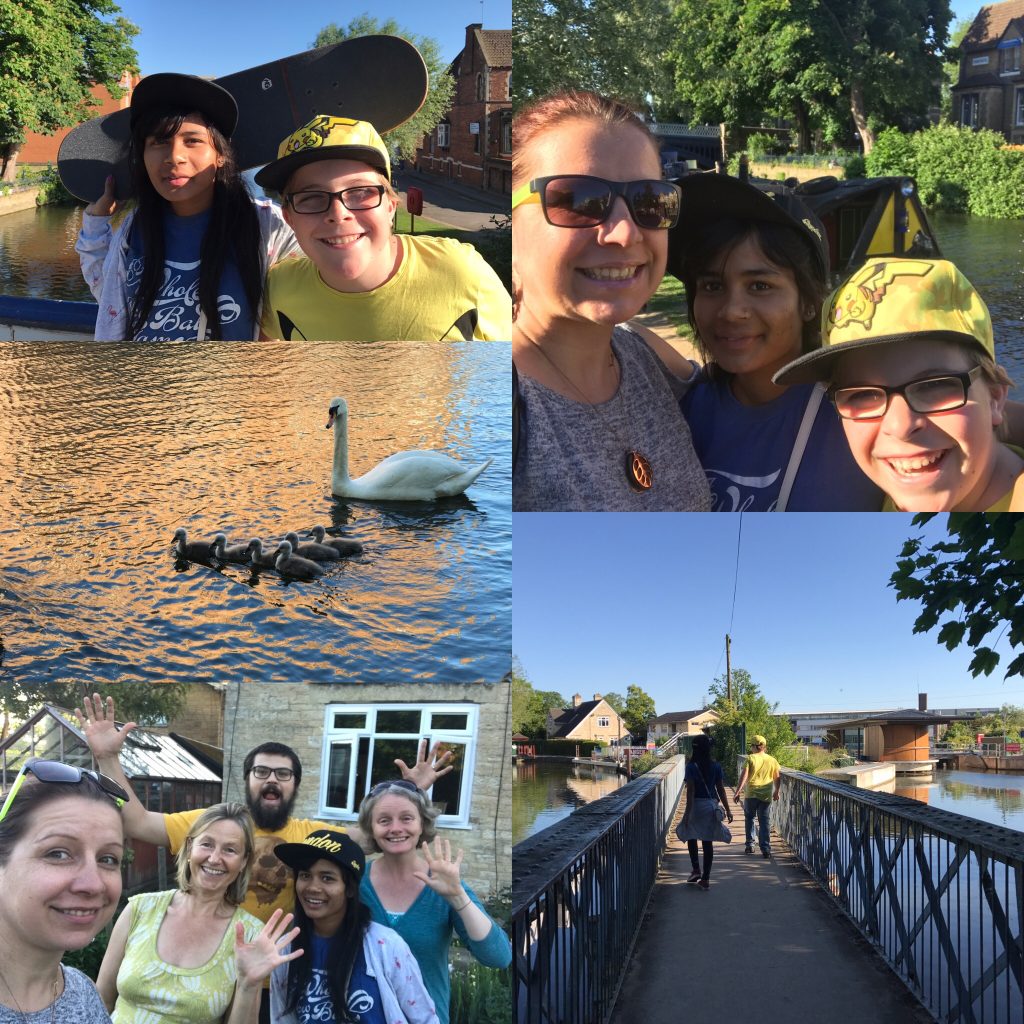
After the visit to the Lock, we moved on to Oxford Wheels Project skate park where Asha could enjoy a bit of practising again. Once again the community proved supportive and the first drop was supported by a fellow skateboarder so Asha could enjoy new hights. It was so lovely to hear him say to his friend: “She is much better than I was when I was her age!”

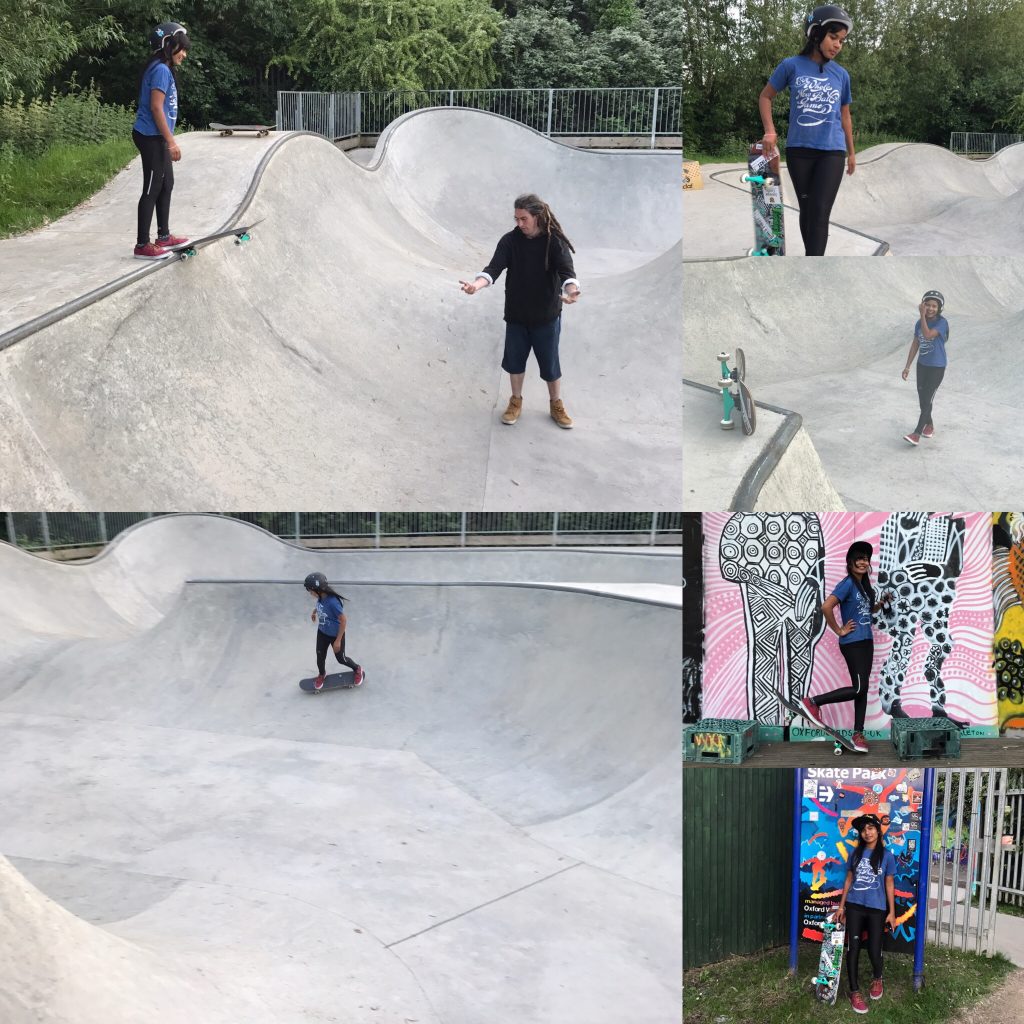
Ont the way back we stopped for a photo shoot with this gorgeous cat – Asha loves animals!

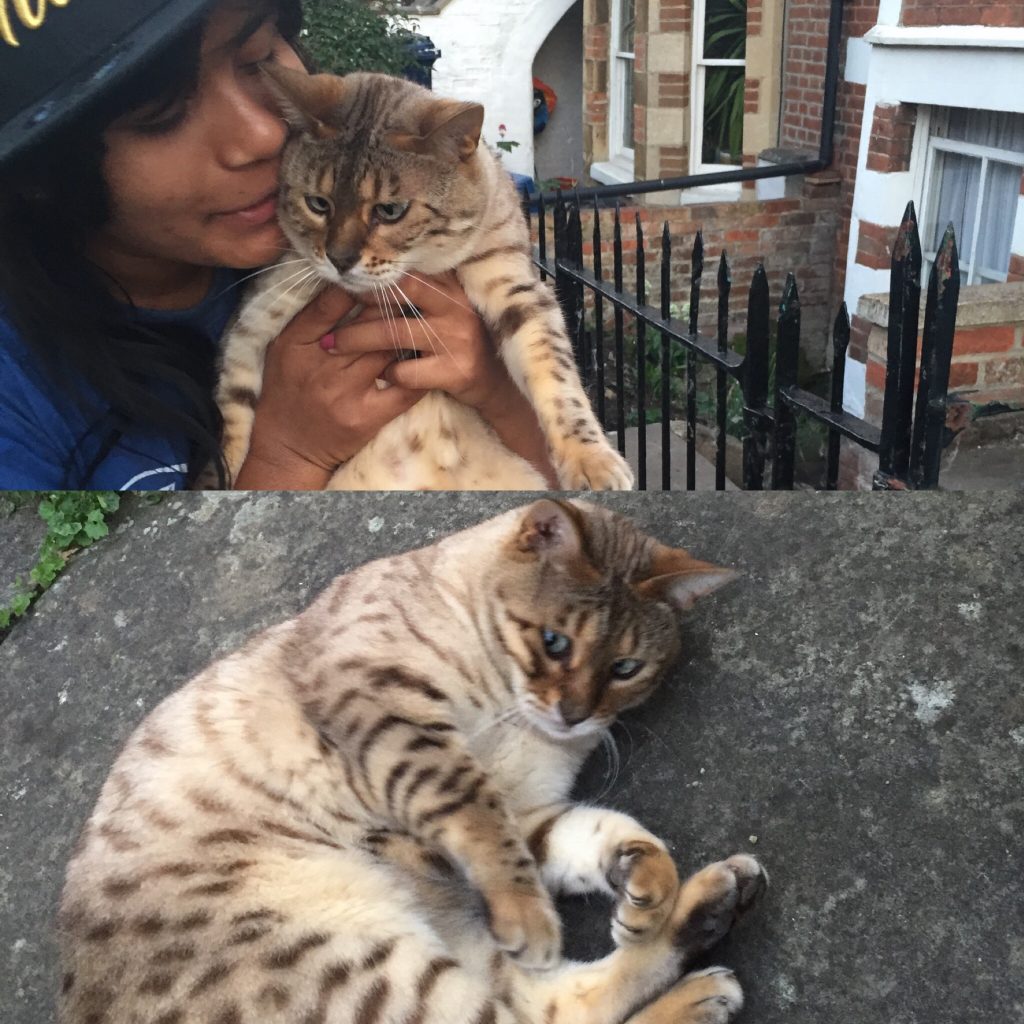
On Saturday morning we have arrived at Saltdean and met up with friends from Brighton. First, we found a lovely Italian cafe and enjoyed a great selection of sweets for breakfast;) Then Margot, an established food blogger, appeared with her family. She was so amazing: she prepared a zebra cake the very same morning so we got to enjoy a fresh, still warm cake on the beach on a rather cold and windy day.

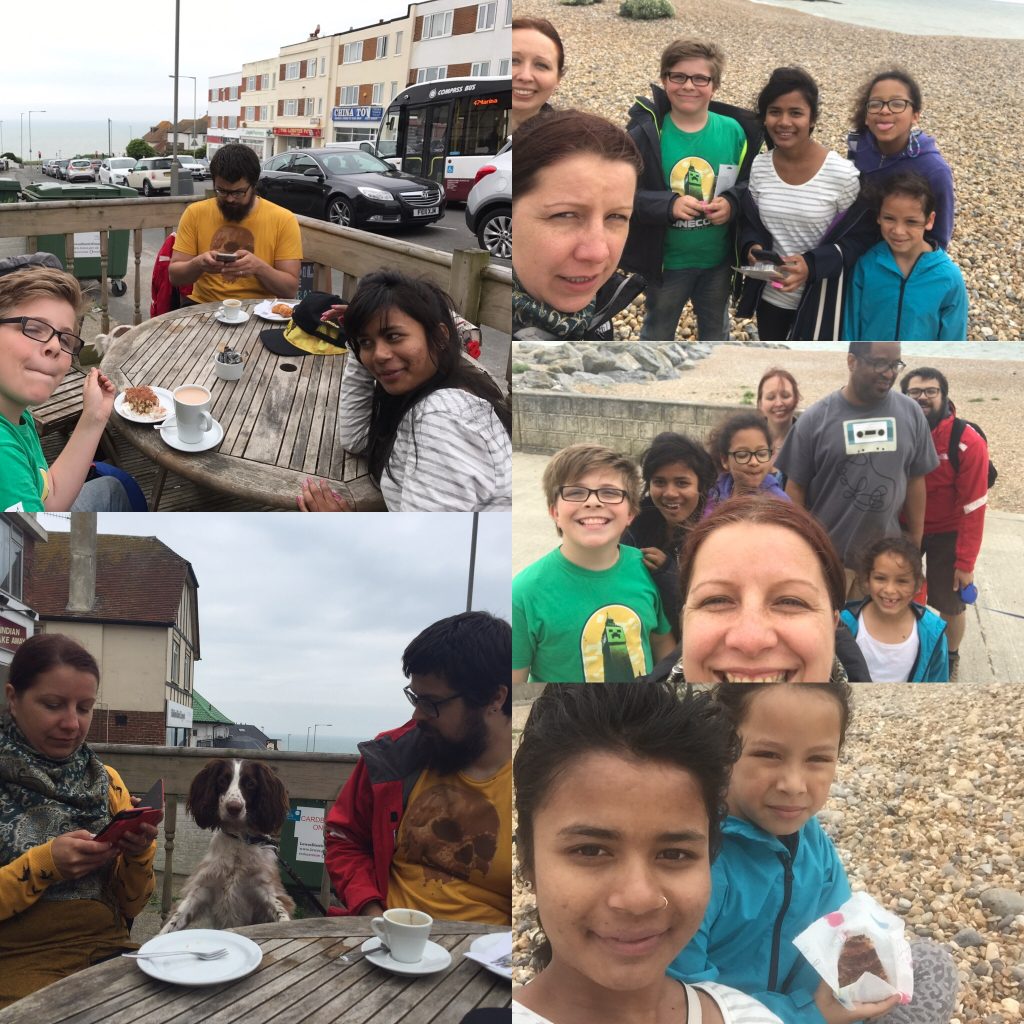
I hope to find out one day how it felt for Asha to stand at the Ocean for the first time but I did see that she was stunned, amazed and happy at the same time. As everything else so far, she was taking this new experience in fully.

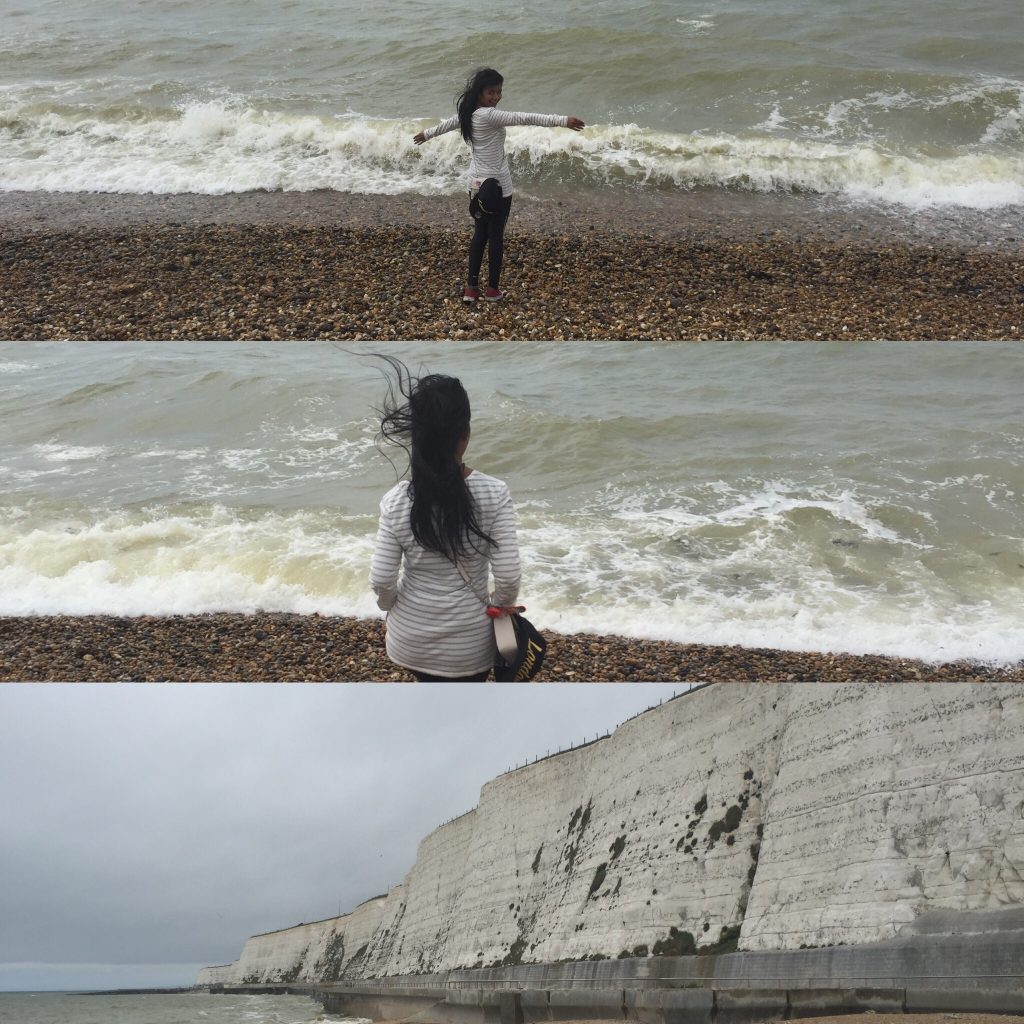
Then we wnet back to Brighton, to our friends’ house, rested, kids played and we also managed to do a walk int he area.

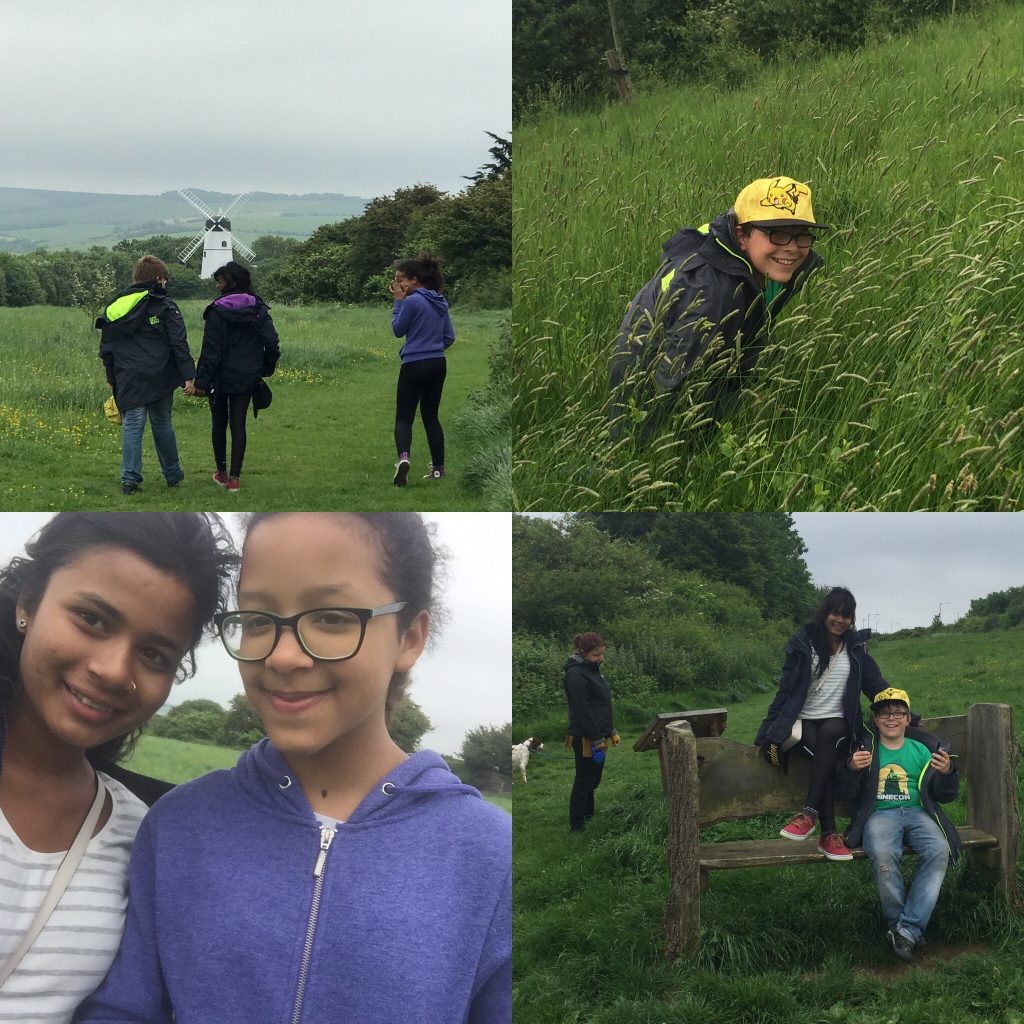
On the way back in the afternoon, early evening, we stopped at Hove to enjoy the sun which came out and made our last moments at the Ocean rather lovely. Kids had a lot of fun!

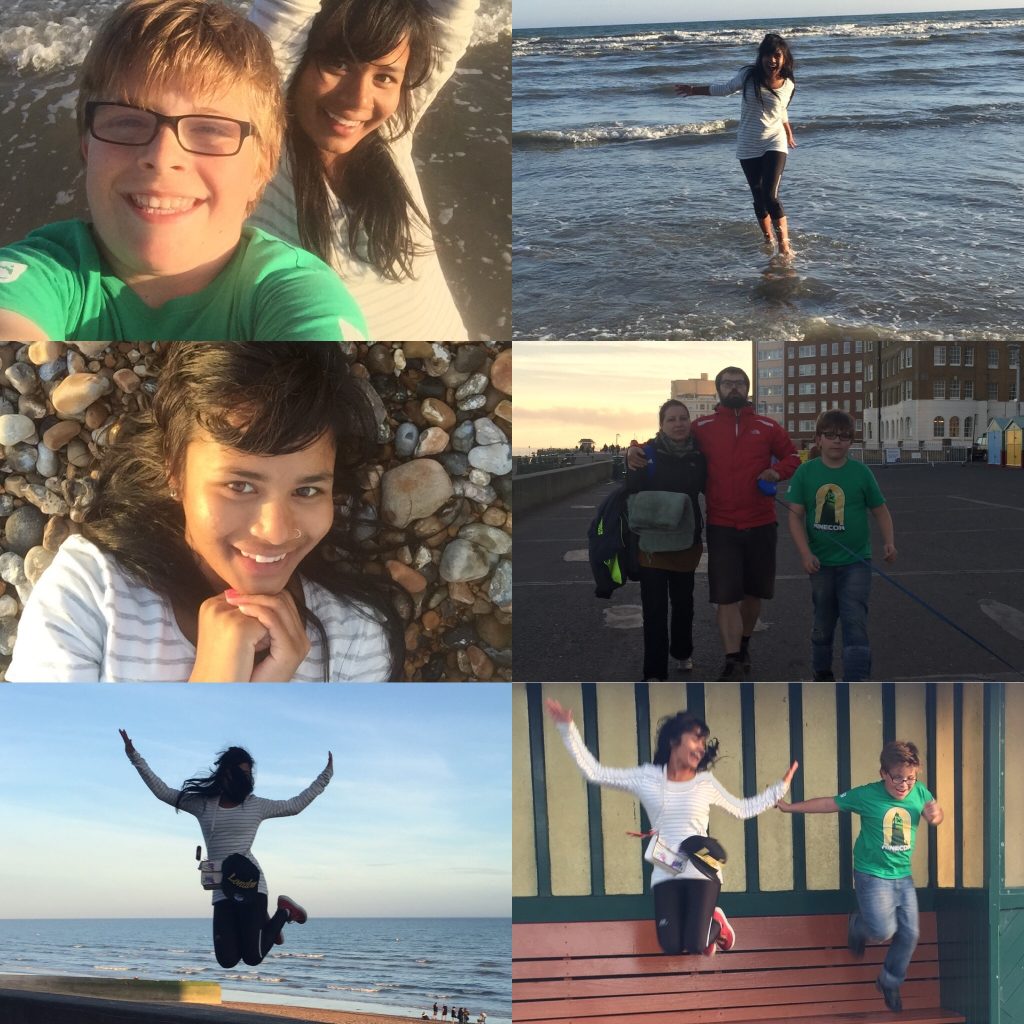
Sunday was sunny with predicted rain for the rest of Asha’s stay so we had to make the most of it. First we visited the Burton-upn-Water with its lovely model village.

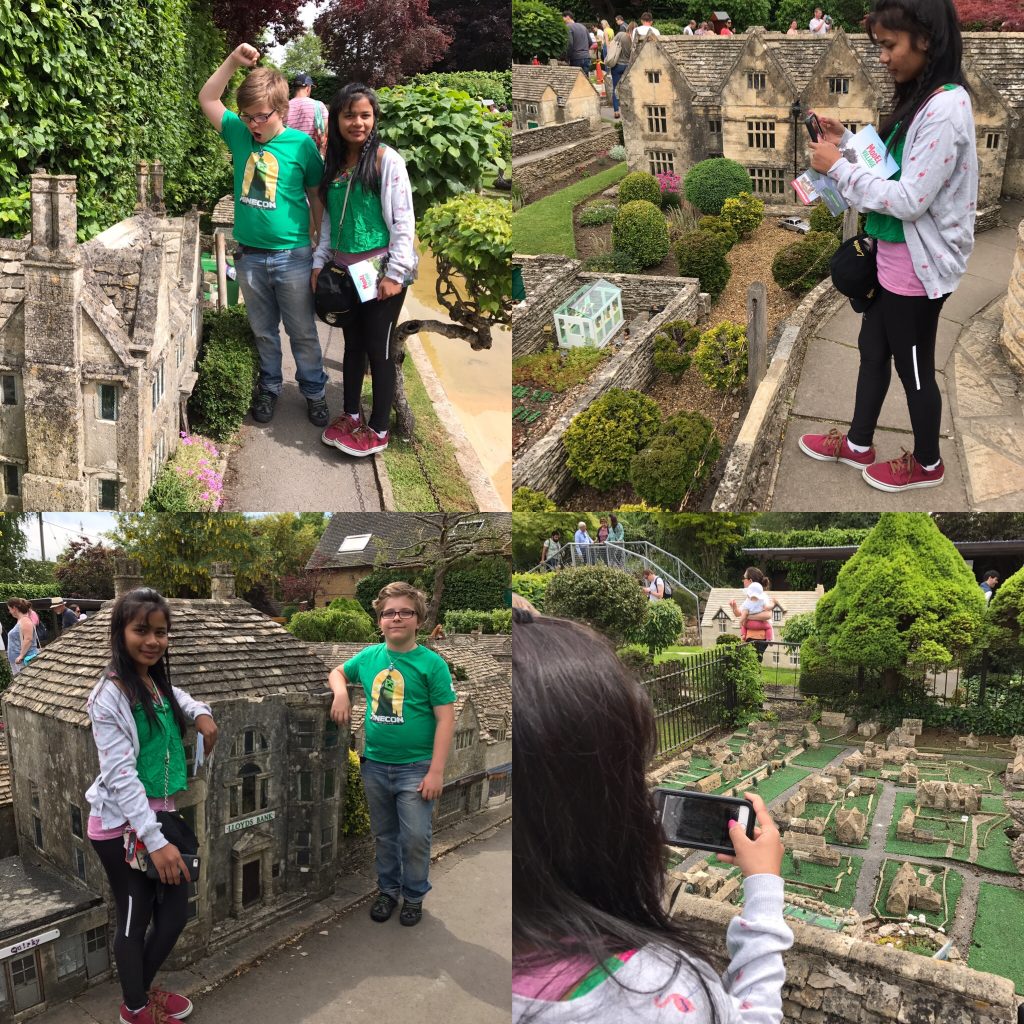
Then we showed Asha that the village does actually look just like in the model version of it – we sat down and had a picnic in the sun with kids dipping their feet in the water.

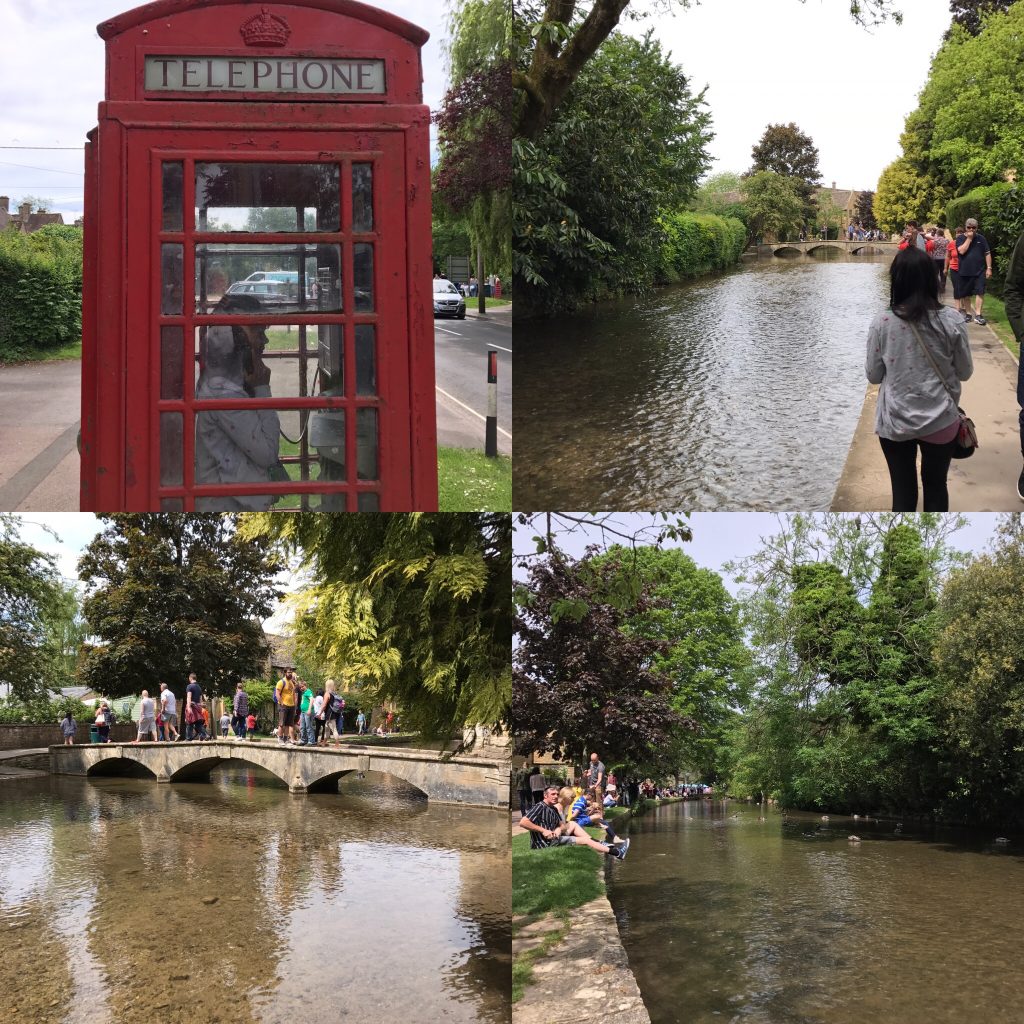
On the way back we stopped at the Millets Farm for a circus performance – which was actually really tiring – the tent proved very hot! We made it though and the ice-cream afterwards rescued the mood;)

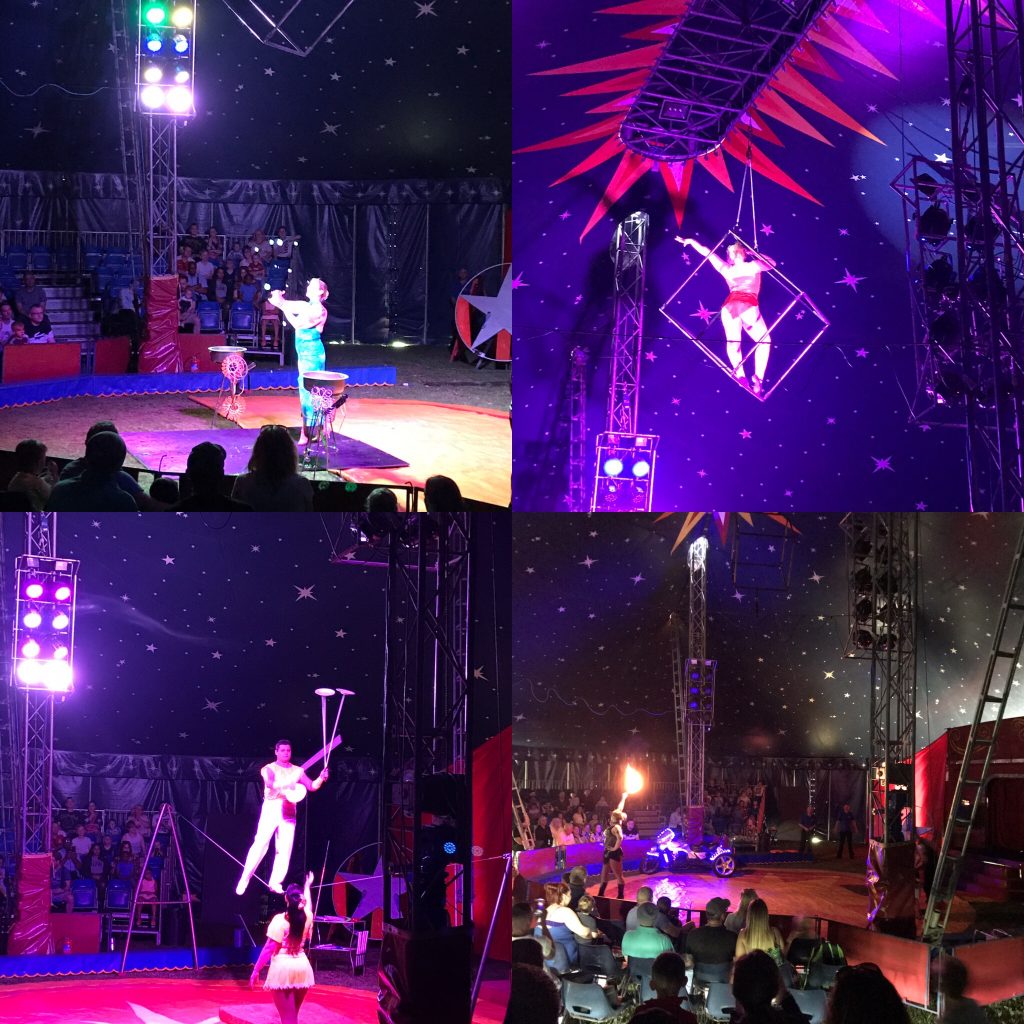
After ice-cream, waiting for Dan to come and pick us up – we had a moment to check out the Millets Falconry. We watched a short presentation and checked out birds of prey, ferrets, baby skunks (I have never seen baby skunks muself!) and other cute animals. Asha said hello to the Indian owl and later on met baby owls too.

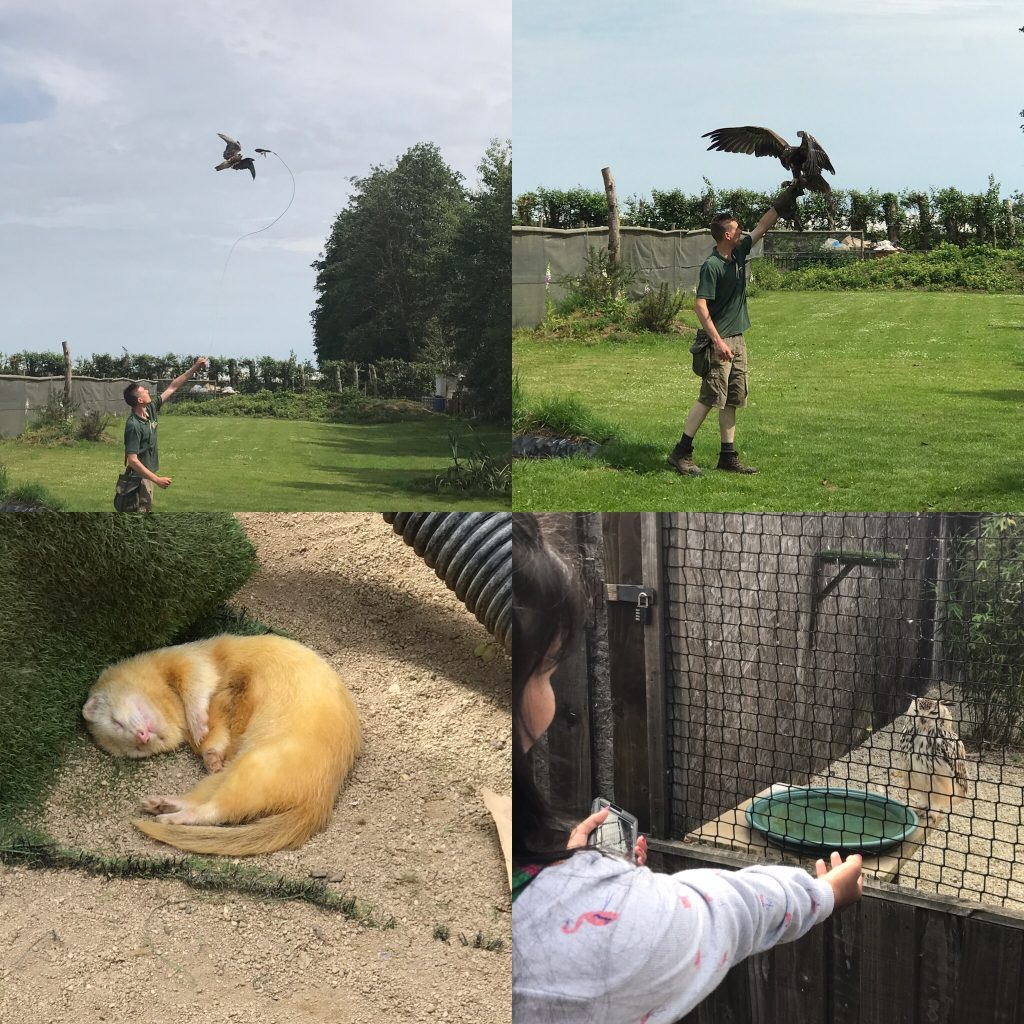
It was an intense week with a lot of studies, work and visiting. Monday was a bank holiday in the UK but for Asha it was the day of her last lesson with Bethany.

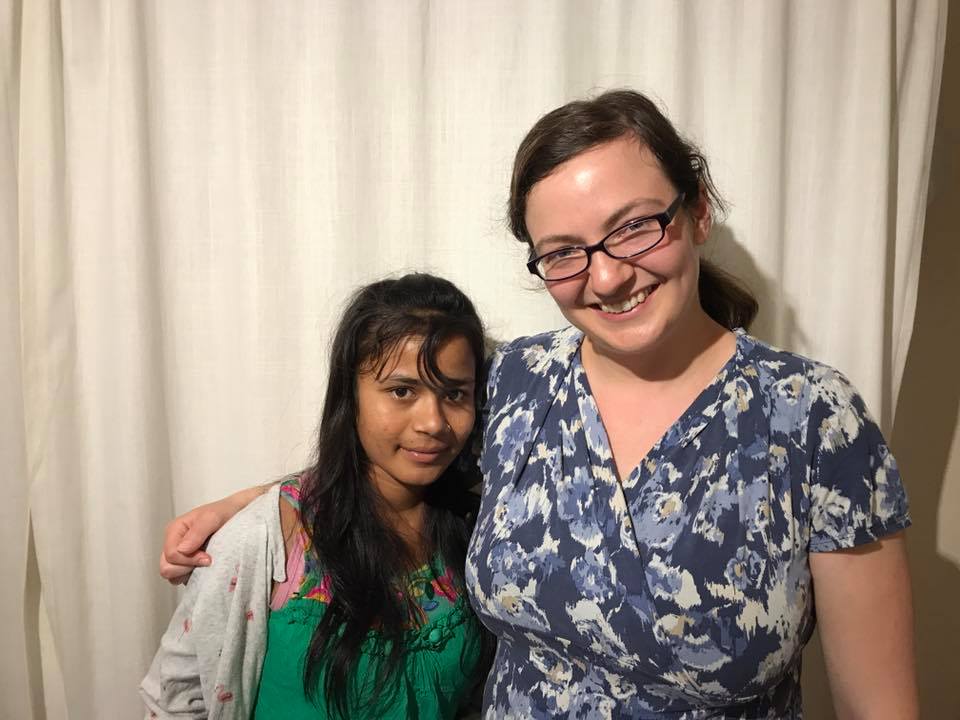
And now we are packed and ready to go to the airport! I cannot believe how time flies! I will need to time to reflect on this time with Asha, but I can say one thing for now: it has been a privilege to have her over!
-
Asha’s story – week 3
Week three of Asha’s stay in the UK started with a visit to Oxford to meet Prakhar again and start planning Asha’s trip back to India (it’s such a short stay, I could not believe we were talking about that already). Prakhar showed us around the Oxford Union so Asha could get a sense of Oxford University. She also experienced heavy rain! We popped into the cinema and watched La La Land! – great fun for music and dance fans, like her;)

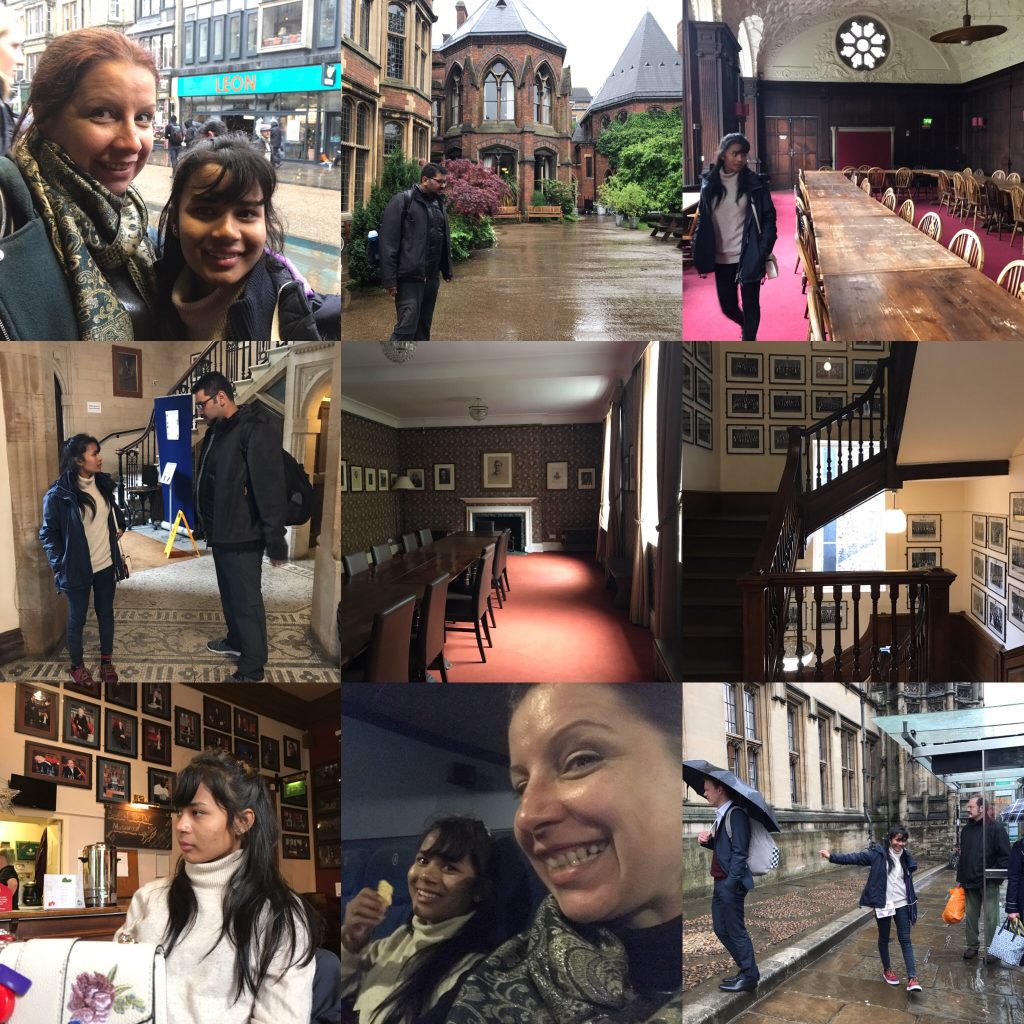
Back home in Wantage it was all about meeting Dawid’s school friends, studying English and walking Poppy to the allotment. Asha really enjoyed playing with the dog and walking in the field!

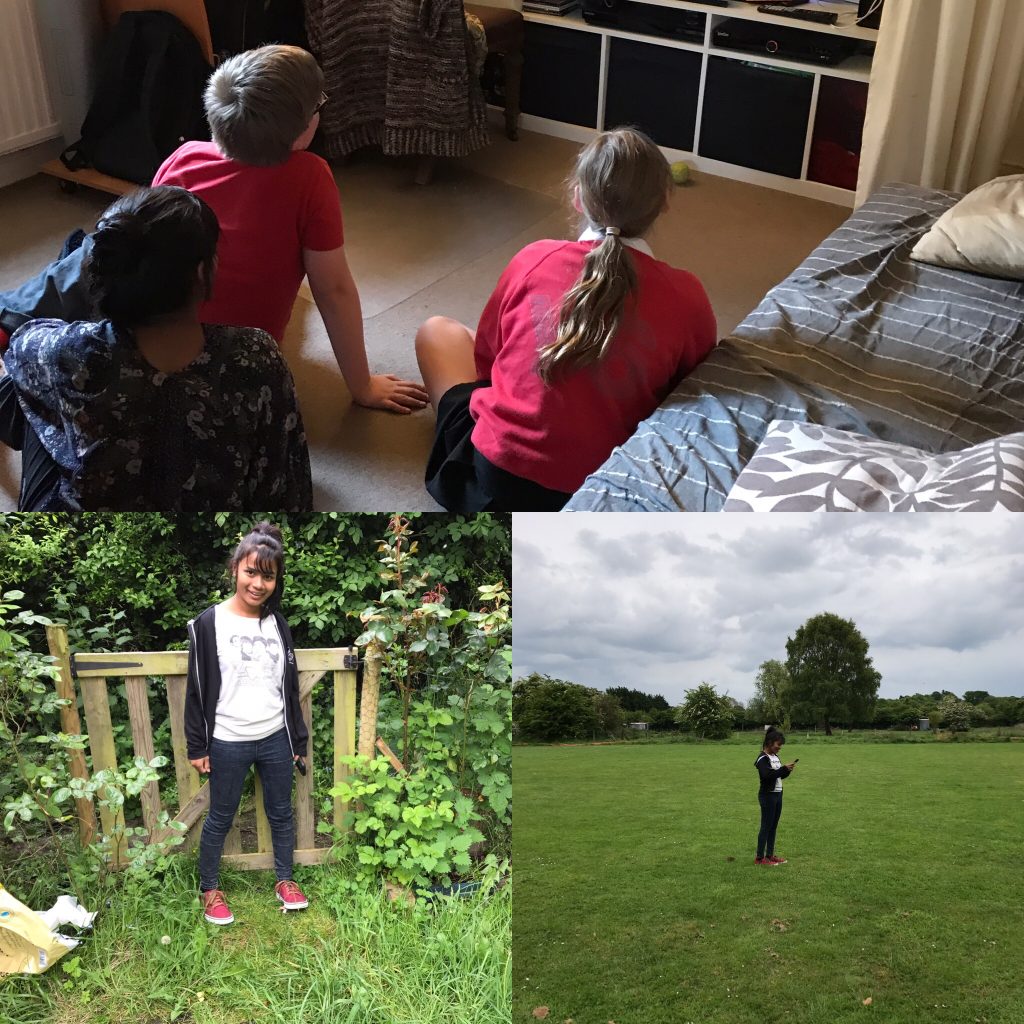
The week was busy – both kids spent it learning – so on Friday, I took them both to Oxford to the Ashmolean Museum (historically the first private collection open to the public in the UK) for their open evening. Just the trip to town on the bus was fun! Then walking around, chasing pigeons, enjoying noodles and meeting up with Dan.

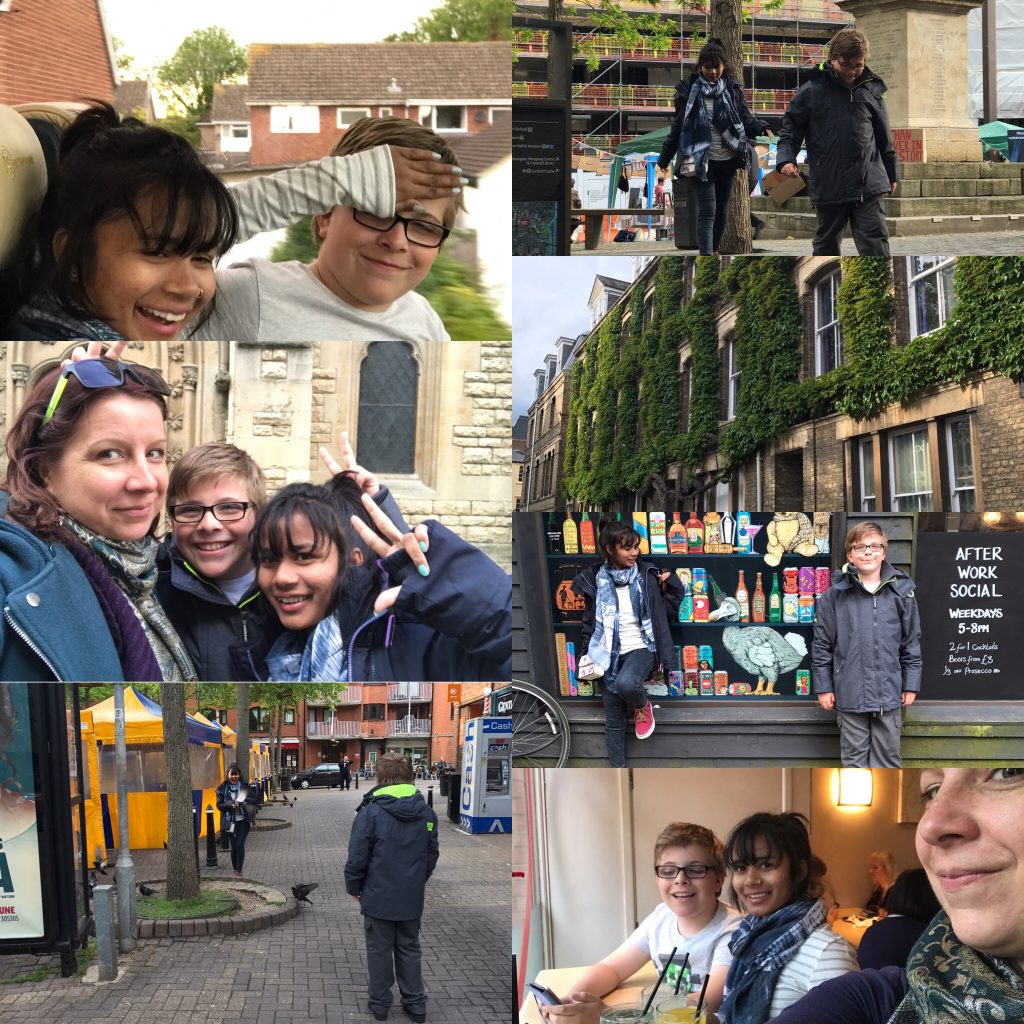
The Ashmolean Museum is quite big so it took us two hours to walk around and participate in various evening activities. Despite being really tired, all of us enjoyed it. Even the rain on the way back home!

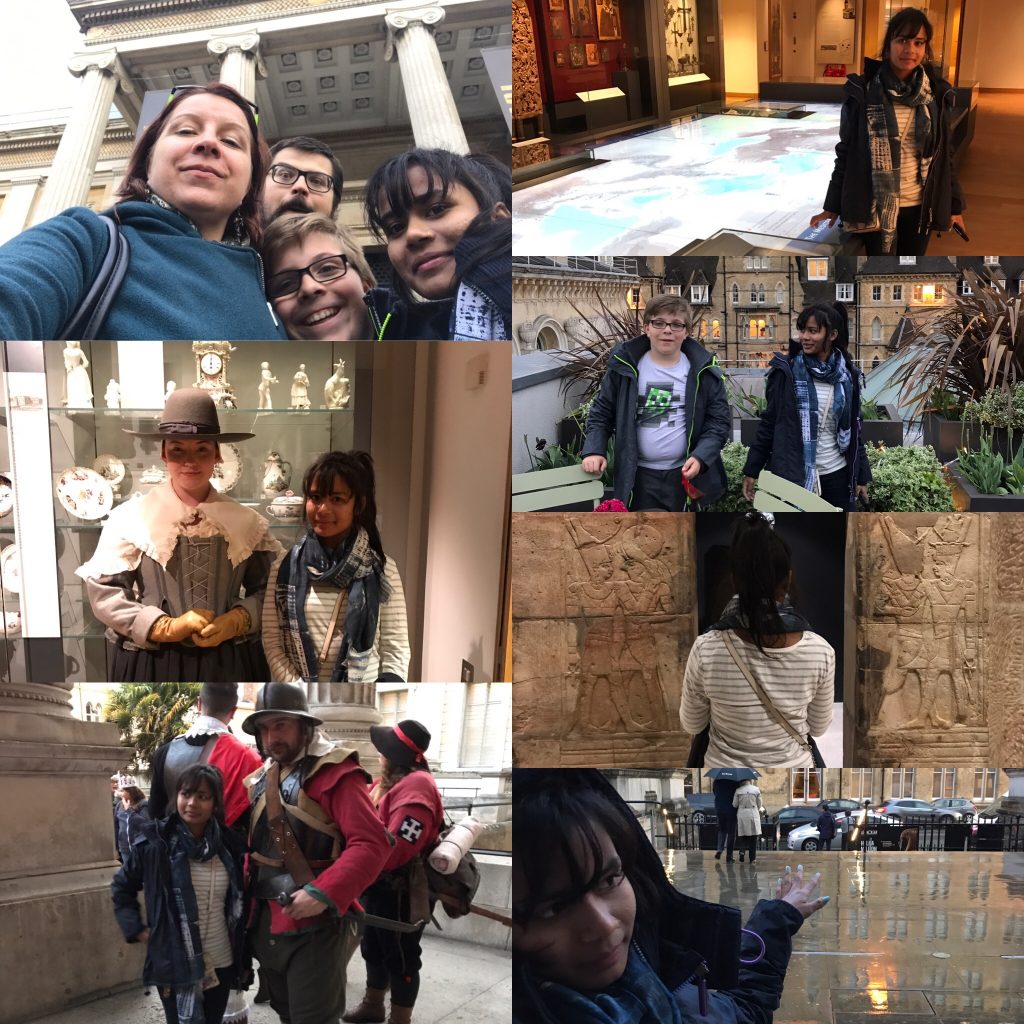
For the third weekend of her stay, Asha travelled up to London and stayed with Ulrike’s friend, Anne-Marie. Anne-Marie showed her around London so I think Asha has a very good understanding of the capital now.

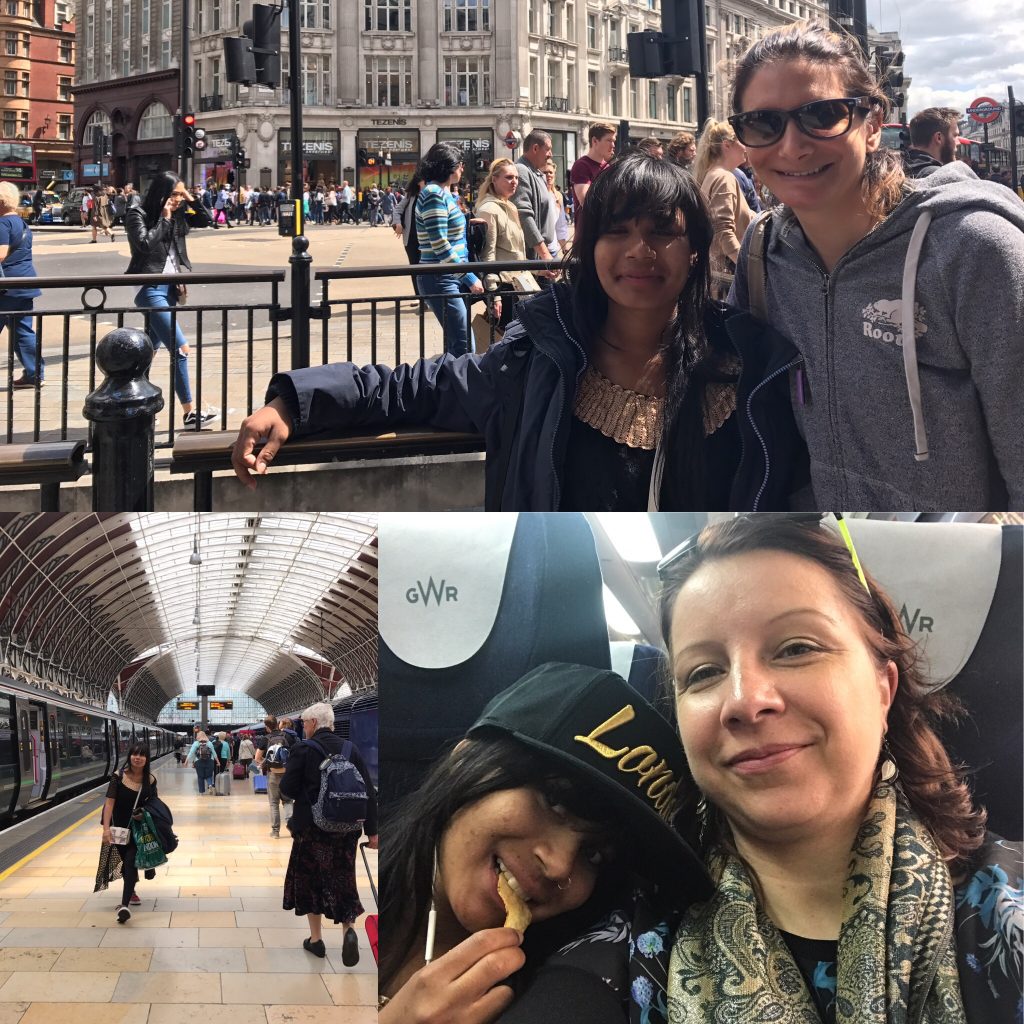
Tired but happy she came back to Wantage and the very same Sunday joined us for supper at Dawid’s friend’s house. We had a wonderful supper topped with a home-made cake with strawberries and cream and a dose of Dobble – brilliant game for learning English.

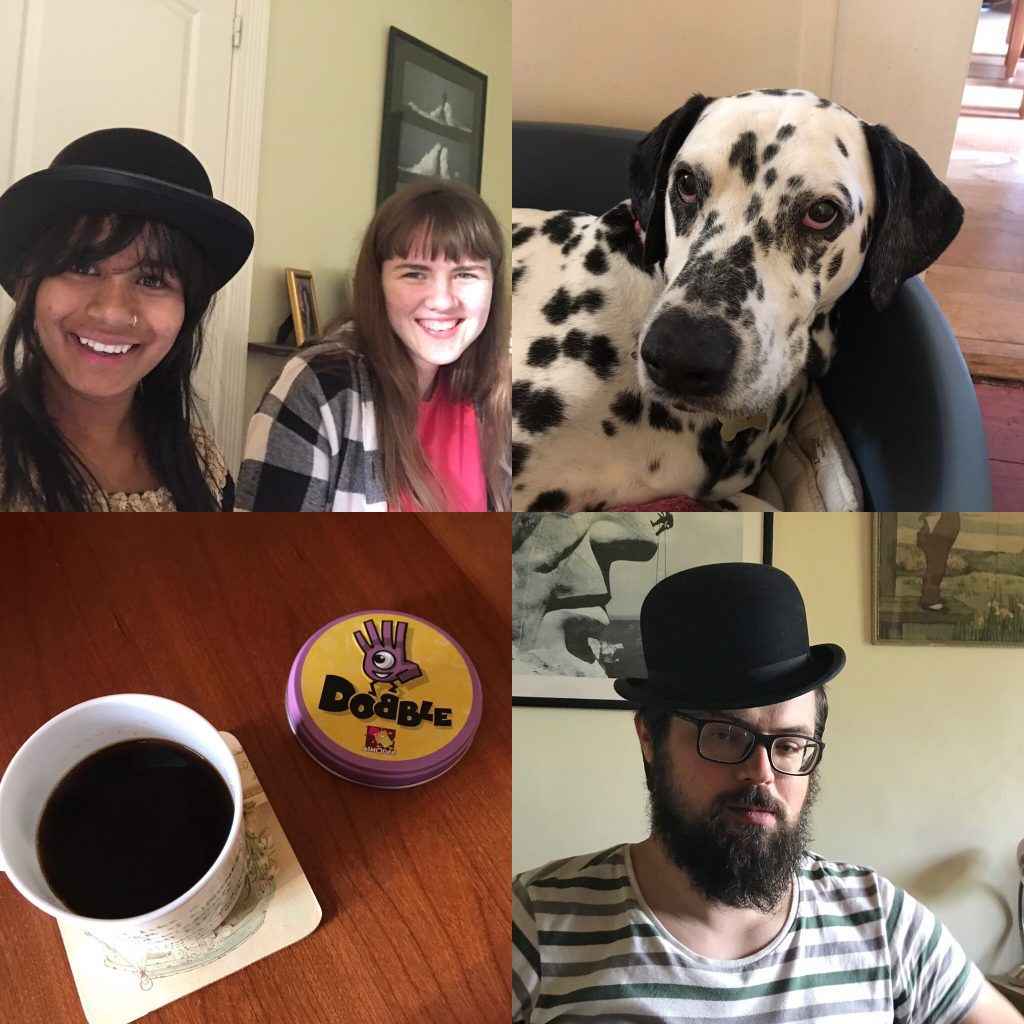
Asha’s third week was more focused on learning English and a lot of about the UK. I am really grateful to all out friends who stepped up, joined in and helped us make this week so lovely.
-
Asha’s story – week 2
And so Asha’s story continues. On Tuesday Asha had her first English lesson with Bethany which resulted in post-its left all around the house – even on the dog! 😉 We also visited the Butler Centre – the school that invited Asha to study English through playwork. Later on, for a little bit of fun and relaxation, Dawid introduced Asha to an Xbox version of Fruit Ninja (games she likes to play on Ipad). Well, it was a lot of fun!

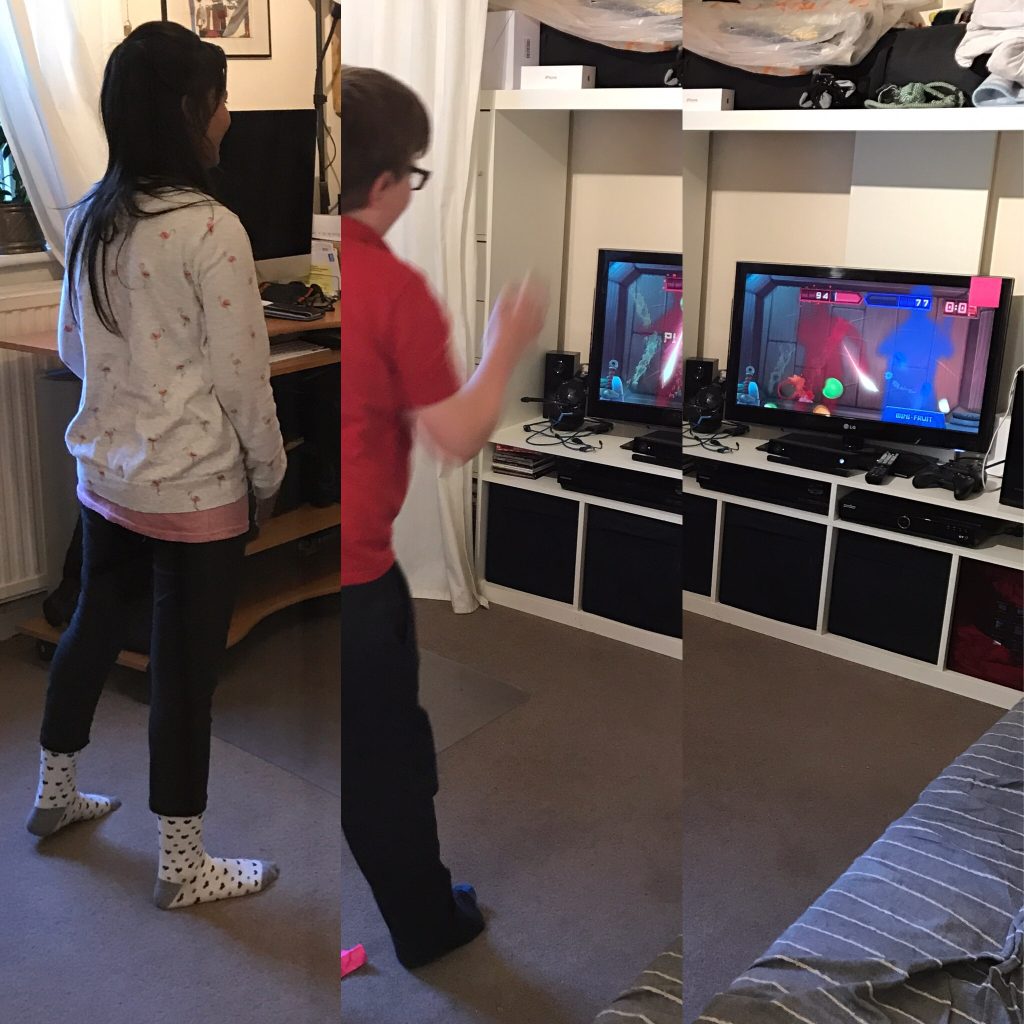
On Wednesday I took Asha shopping – just for a little bit of ‘girl-time’, but also to involve her in celebration of Poppy’s Birthday. Poppy was four years old so we showered her with toys and tennis balls, of course.

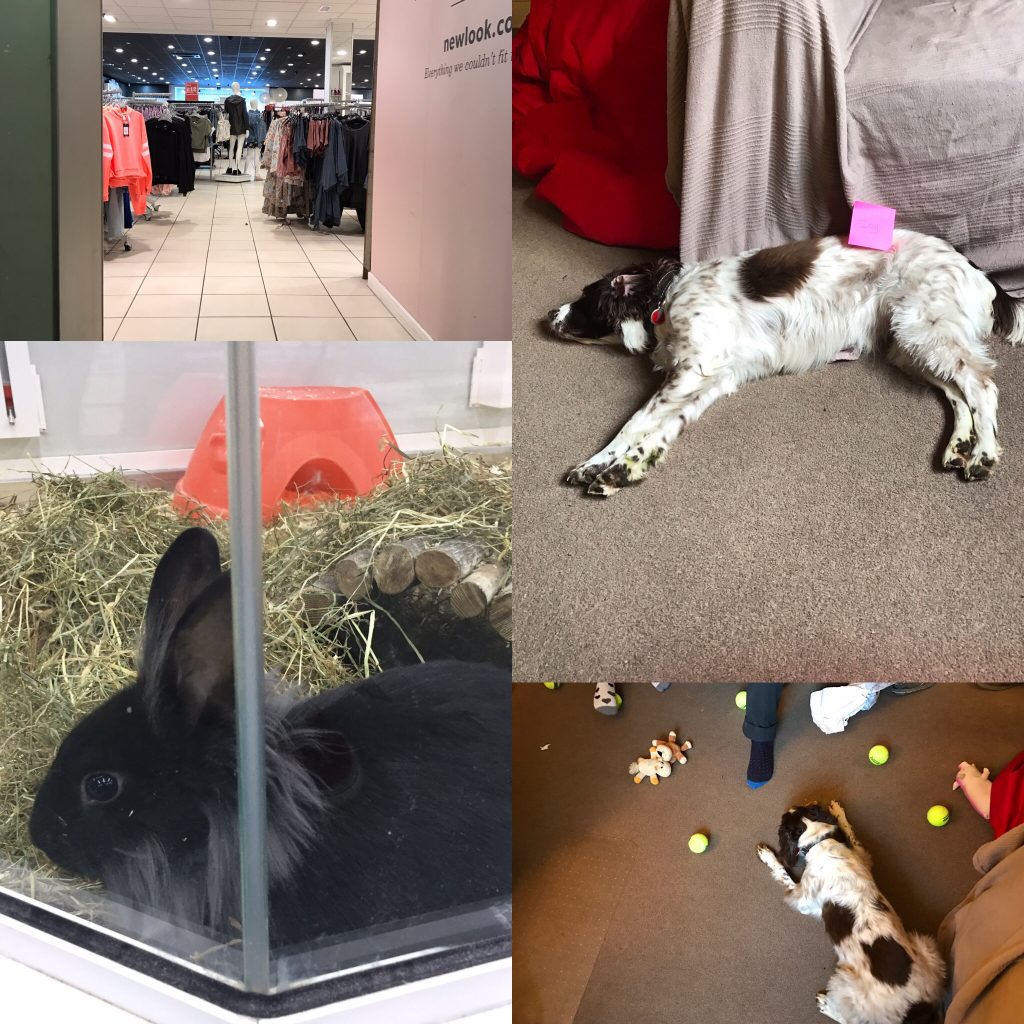
On Thursday Asha had another lesson, another visit to the Butler Centre, and a little bit of skateboarding – we managed to sneak out to Faringdon skatepark. We were so impressed with Asha’s skating skills!

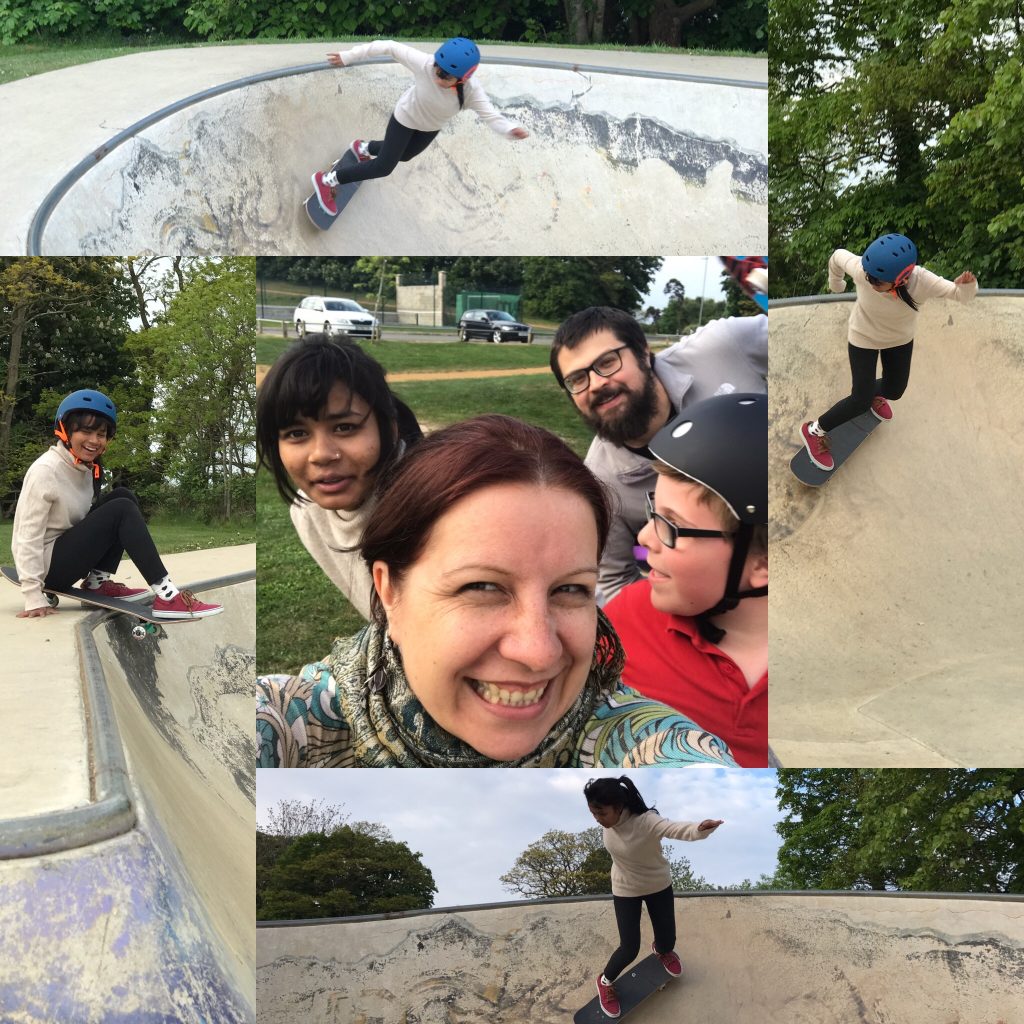
Knowing that Asha likes to dance (and remaining realistic about my own lack of dancing skills) I have ordered the Just Dance 2017 Xbox game for the kids. Asha rocked both Bollywood dances (something we were rubbish at!) and hardcore rock! Well, I tell you – we all had so much fun – our legs, hands and bellies (from a number of giggles) were hurting in the end and Poppy looked at us in amusement!

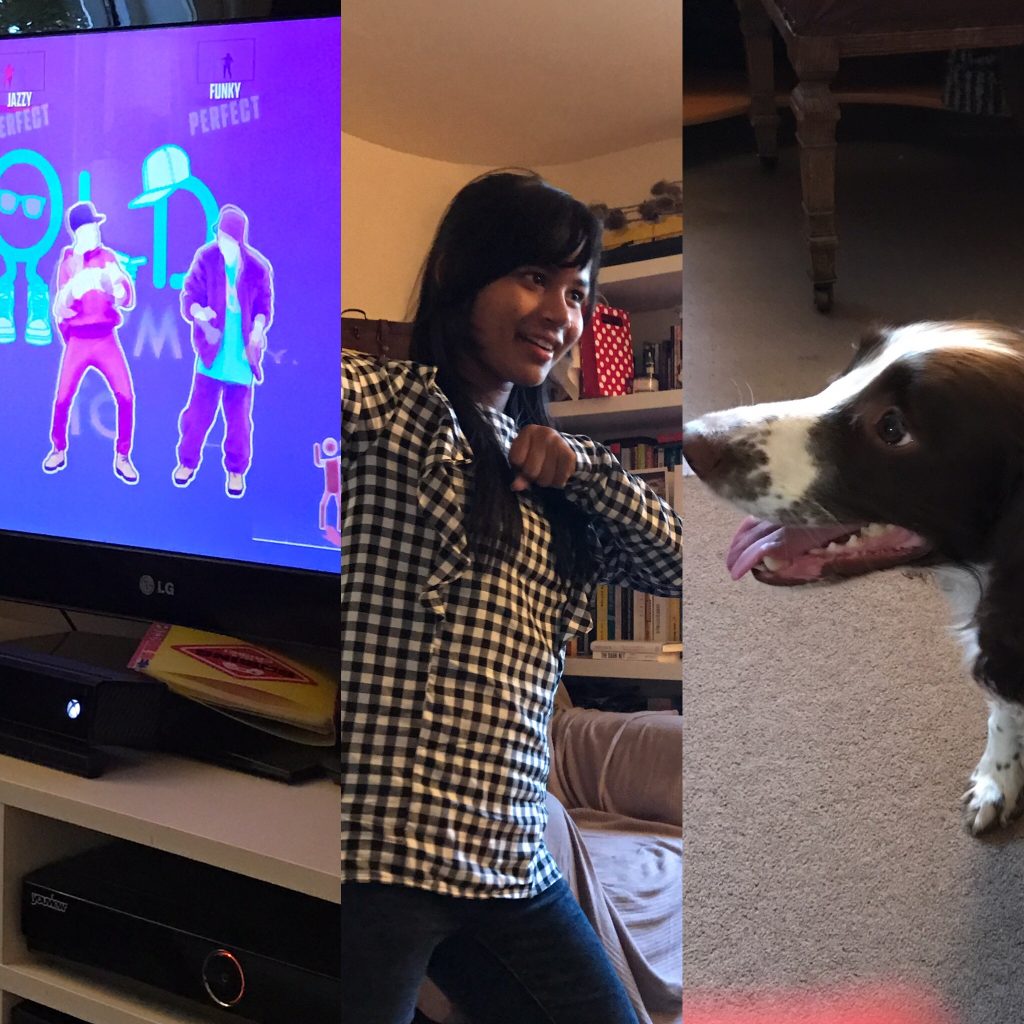
On Friday Asha and I went to Oxford to check in with Prakhar – our friend who helps us translate to English. I just wanted to ensure that Asha is happy with us and all her needs are met. We fine tuned the ideas for food – both Indian and English and showed Asha around Oxford again – this time in the gloomy, almost rainy atmosphere.

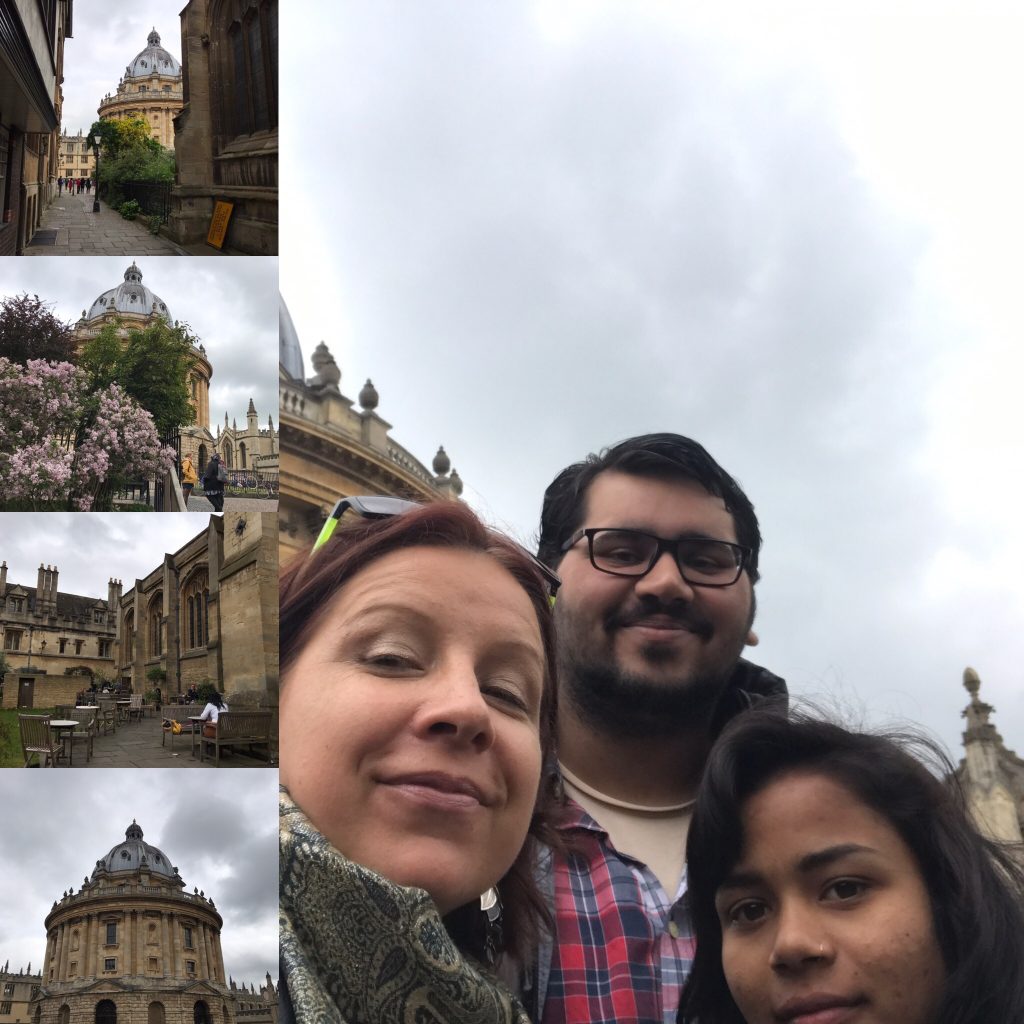
Our landlords are currently away so I was asked to water their plans – this gave me the opportunity to show Asha the main house which is actually full of Indian furniture and artwork – my landlords spent some time working as medics in India and always feel very attached to their memories of those times. I also found out that parrots are Asha’s favourite birds;)

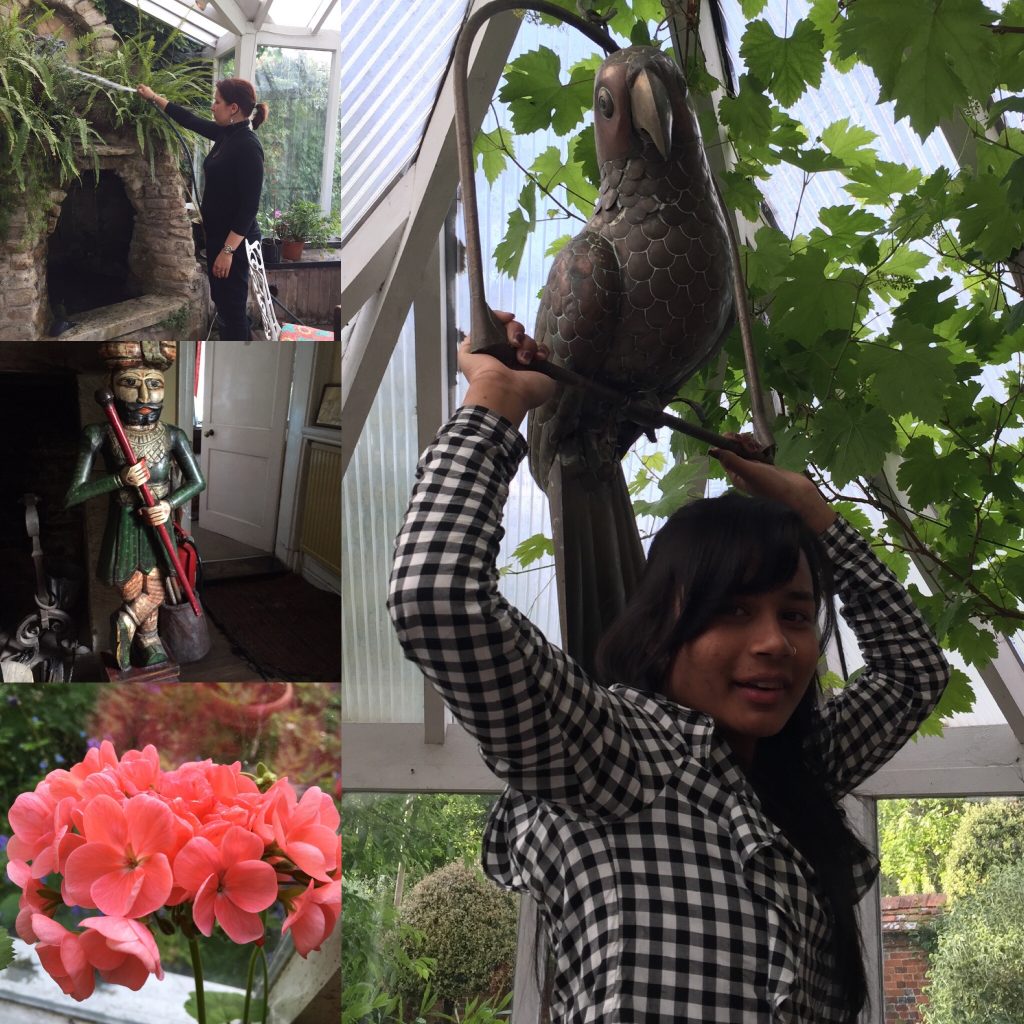
At the weekend we took Asha to Leicester to visit my best friend, Krysia, and her husband, Zoli. They are lovely, kind, warm people so I really wanted to show Asha a different part of the country. Leicester is more industrial and historically very familiar with Indian culture. Saturday was dedicated to shopping in Indian areas – Asha finally got to enjoy some really good food:) In the evening we wnet out to the More Indian Restaurant where Asha’s stay was celebrated with a complimentary non-alcoholic drink. It was such a nice gesture!

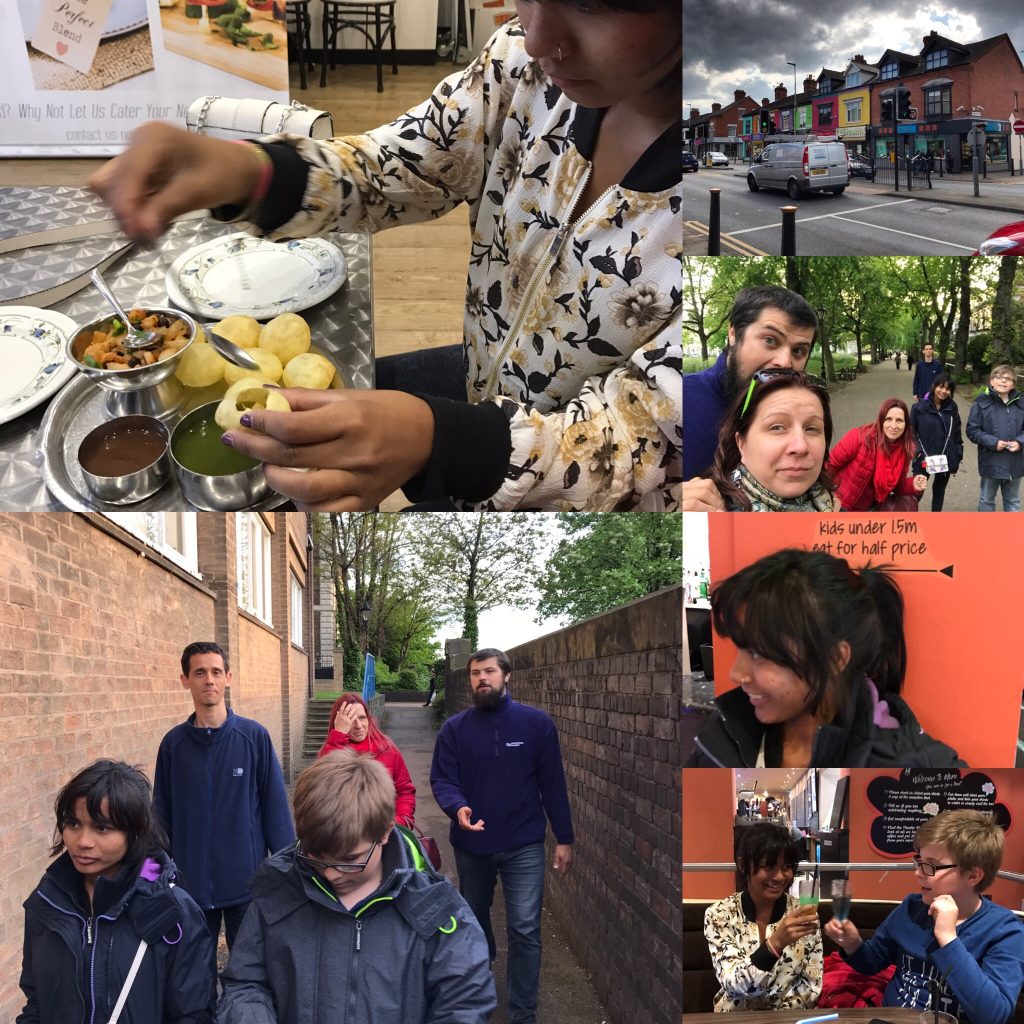
Sunday was a real treat for Asha – turns out that Leicester is a key location for skateboarding in the UK! We took Asha for a few hours to the Broom Skatepark. I know that skateboarding, just like coding, comes with a certain collaborative, tolerant, inclusive and supportive culture, but it was so nice to see Chris Straw (as it happens one of the owners of the place!) stand next to Asha and help her skate down the higher platform – just when she was hesitating before that first jump. I tell you – that gesture of “hey, can I help, give me your hand and go!” moved all of us so deeply. It’s the simple things! Chris and his friends were really welcoming, told us a few facts about the place and the city. It was really lovely to see Chris recognise the fan page of Janwaar Castle! We quietly hope to be back there sometime! Asha was the only girl in the place and she rocked it!

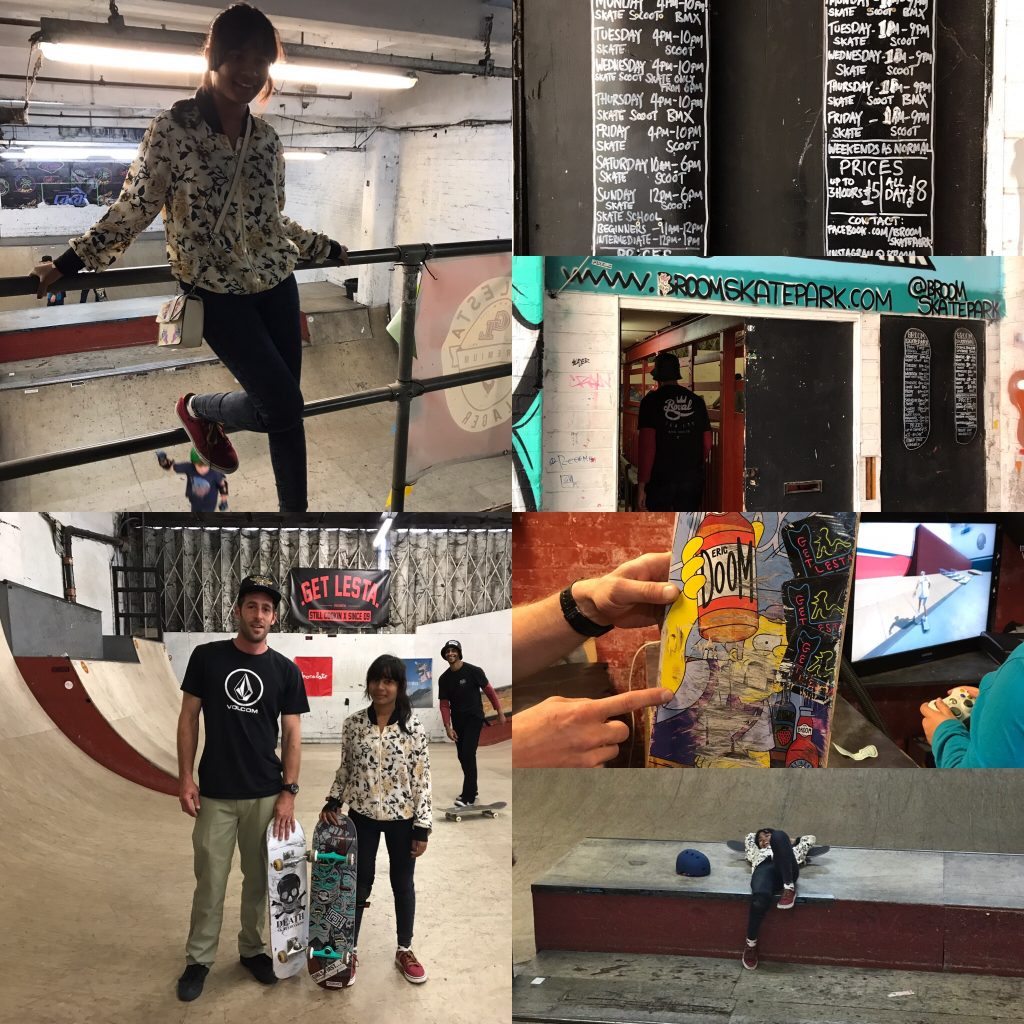
After our visit to the Broom Skatepark we took Asha around the centre of Leicester. We walked around the old and modern part of the city….

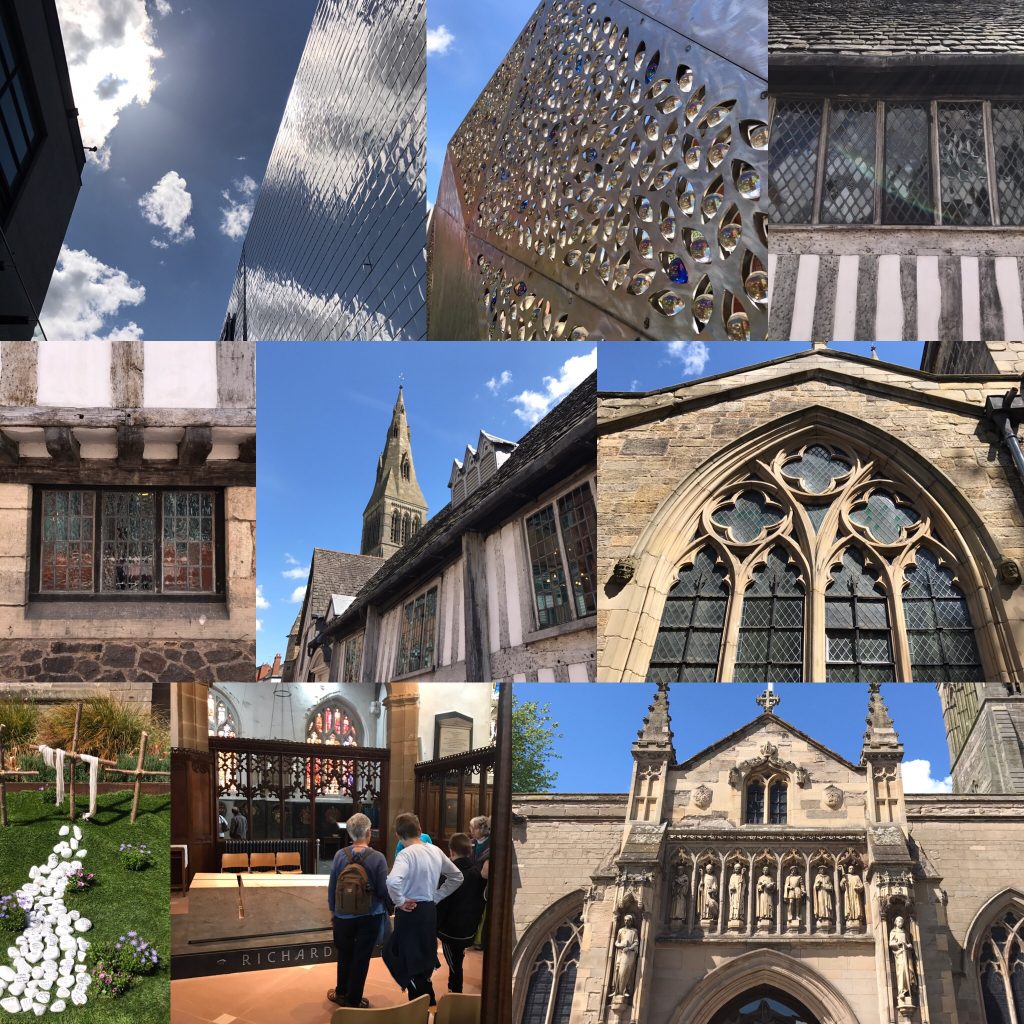
…we ate very English food in a small, lovely, a family owned bar, and we talked a lot. We tried to keep Asha busy as it was the Mother’s Day in India (she sent me a lovely message over Messenger in the morning for which I am really grateful!) – we just worried that it might be a day when she would miss her parents more than ever. So we took her for longer walk and later on recorded a group greeting from us to her Mum.

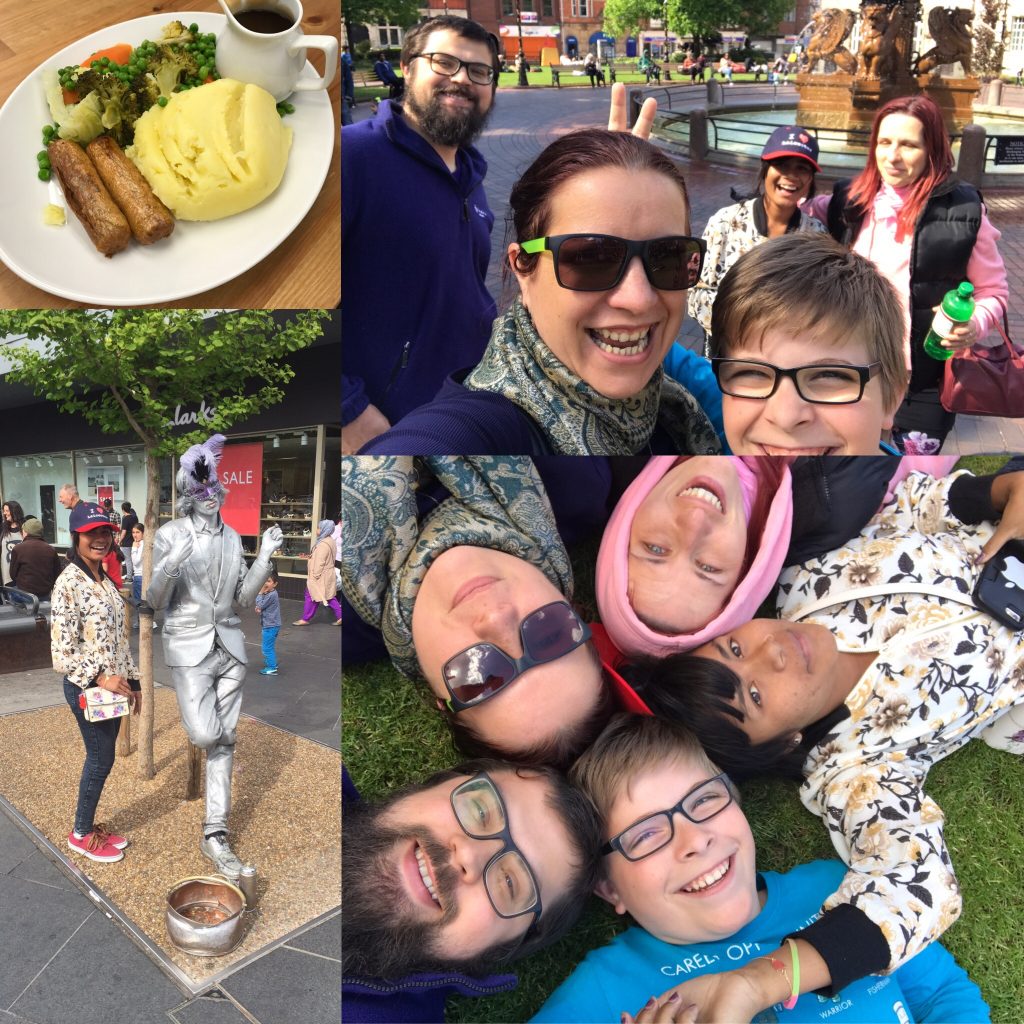
We came back to Wantage on Sunday evening exhausted! With a new week ahead we used most of the evening to do…nothing!
-
Asha’s story – week 1
Asha is here. As I said in my previous post, it’s been a long journey for us, but much longer for her. The welcome at the airport on Sunday was very emotional and full of smiles. Asha and Ulrike were exhausted but put on a lovely smile for us. Our and Ulrike’s friends joined in the welcome – some appeared at the airport (thanks for the sign! I was so excited I forgot to make one!;)), others sent us photos in their Indian clothes (how very sweet of you!). Dawid, our star, instantly jumped on the skateboard and showed Asha around the house and their shared room. Linda and Bethany came to visit us and discuss the English lessons. Prahkar came from oxford to help us with initial chat – just to make sure that Asha is clear on all the little details of our life here and feels safe and welcome.

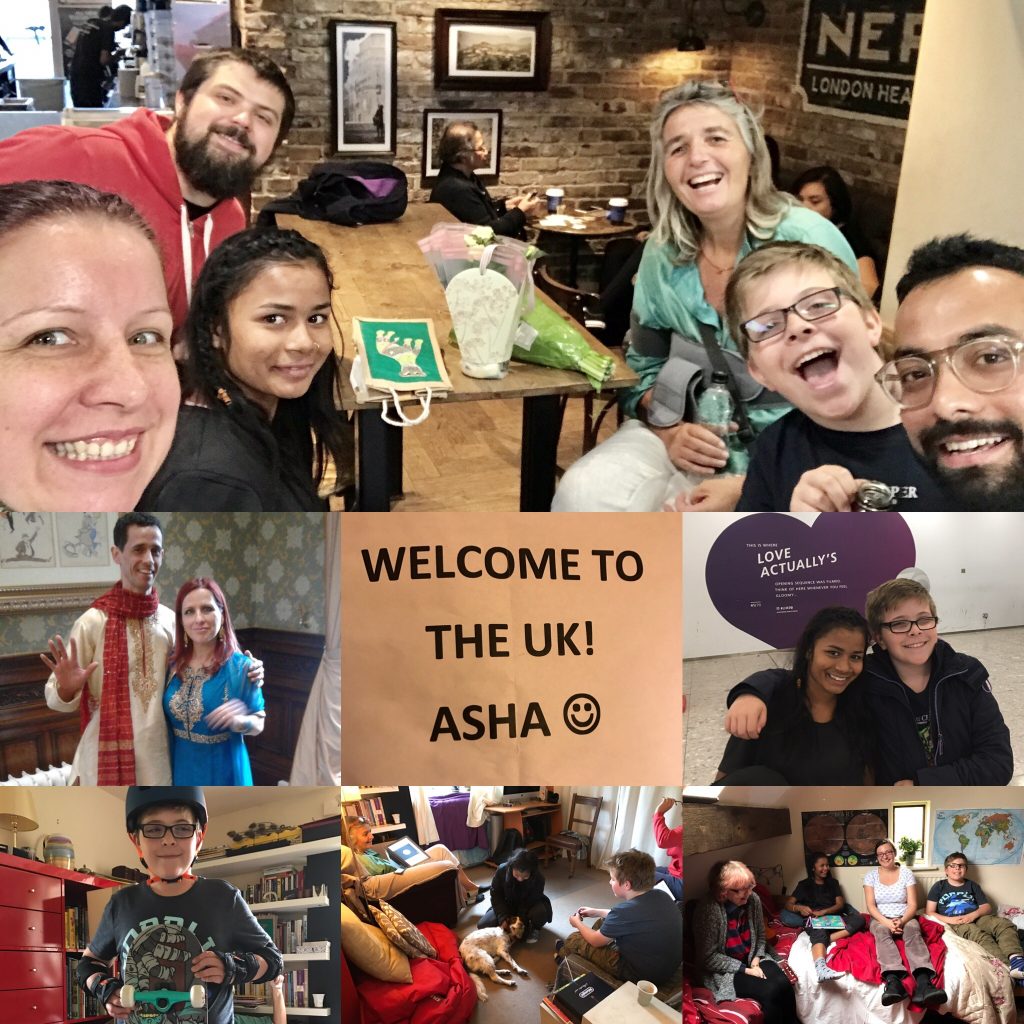
Our approach to Asha’s stay with us is very British: we just carry on! Asha is here to learn English but also to experience the local way of living, so we have originally planned to basically treat her like our daughter and show her our weekly routine. We were planning a very quiet week of adjusting Asha to the local temperatures, food and weather but life – as always – is a bit different. We did not know until the last days just when Asha would travel so her first week coincided with my Polish family’s visit to the UK. They arrived on Tuesday and I think our week was actually quite intense, focussed on sightseeing. We tried to give Asha as much time to rest as possible but also make the most of our time with family and show her around major locations in the area. I think it was really nice to have my brother and his partner over because Asha got to meet more of our family too and the week was cheerful. Tuesday afternoon we walked around Wantage and had a meal with Ulrike, before dropping her off at the train station for London. After weekend rest we took Asha and our guests to Oxford.
After the longer weekend of initial rest, on Wednesday we took Asha and our guests to Oxford.

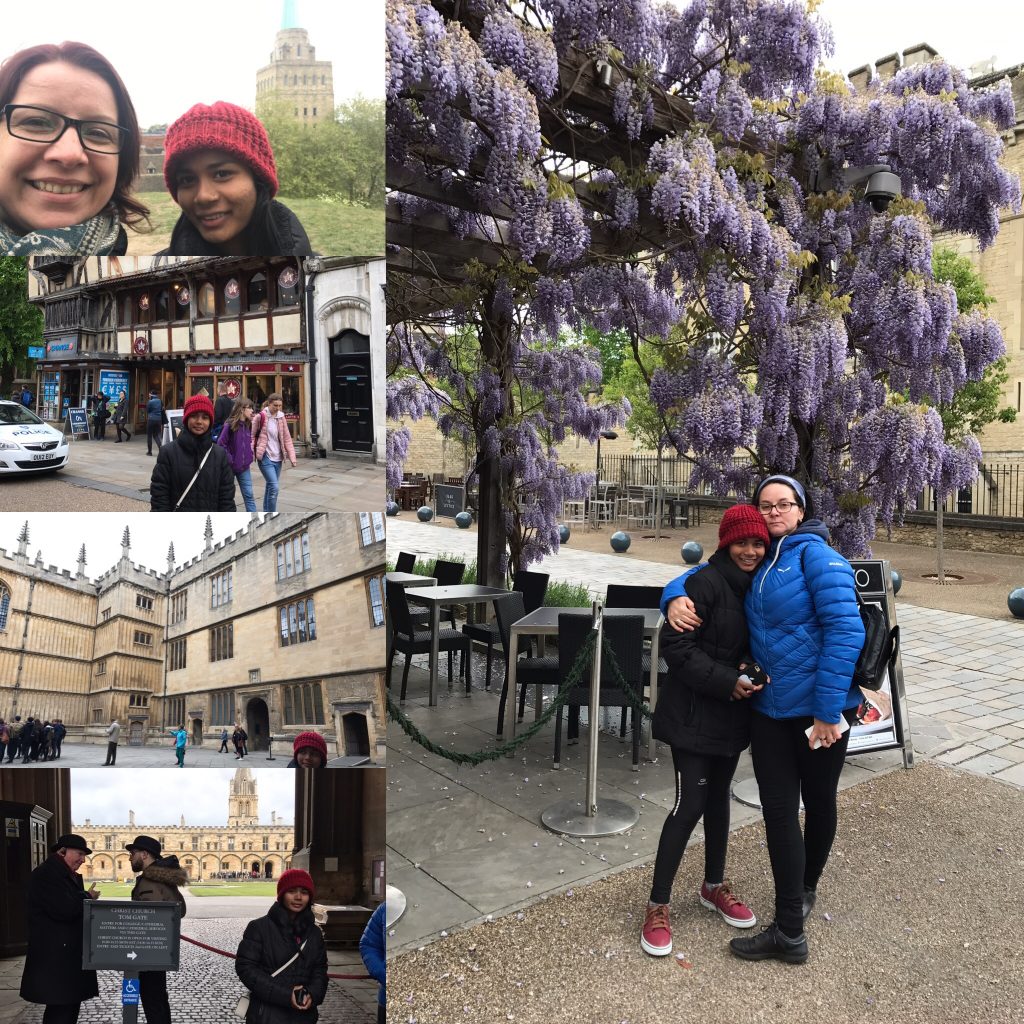
She’s wearing a hat but trust me – the weather was actually getting much better than the week before;) We have walked around the city, enjoyed some local food in the Covered Market and visited a few colleges. It was a quick walk but I think we have seen quite a lot. My family really wanted to see the UK from many angles, not just the typical tourist attractions. Asha seemed to like the architecture so we took plenty of photos of interesting buildings.
On Thursday my family went to London, but Asha joined us in visiting Letcombe Regis (I work there twice a week) for the set up of Oxfordshire Exhibition – an exhibition of local artists. Asha went for a walk to see some of the beautiful green paths, and then on the way back had a quick look at some of the works prepared for the exhibition. She also got to meet some of my co-workers.

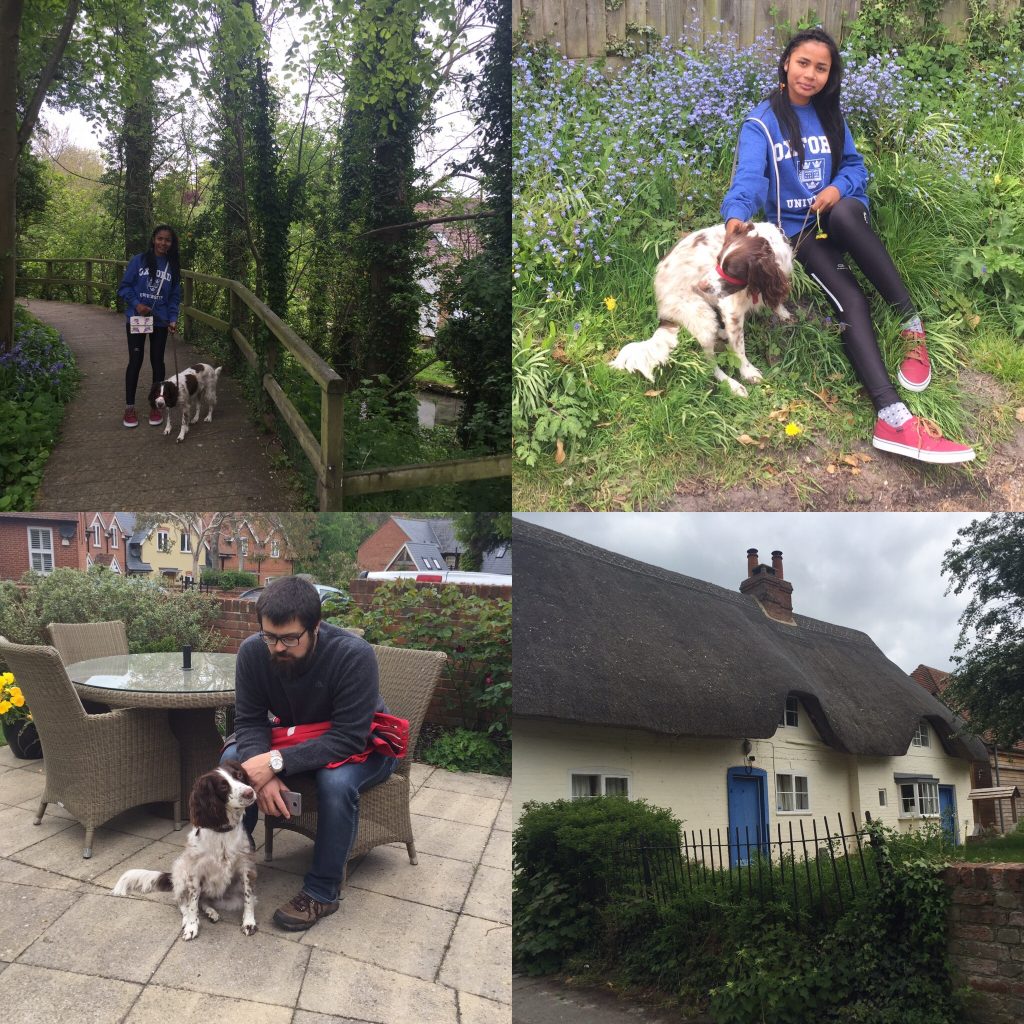

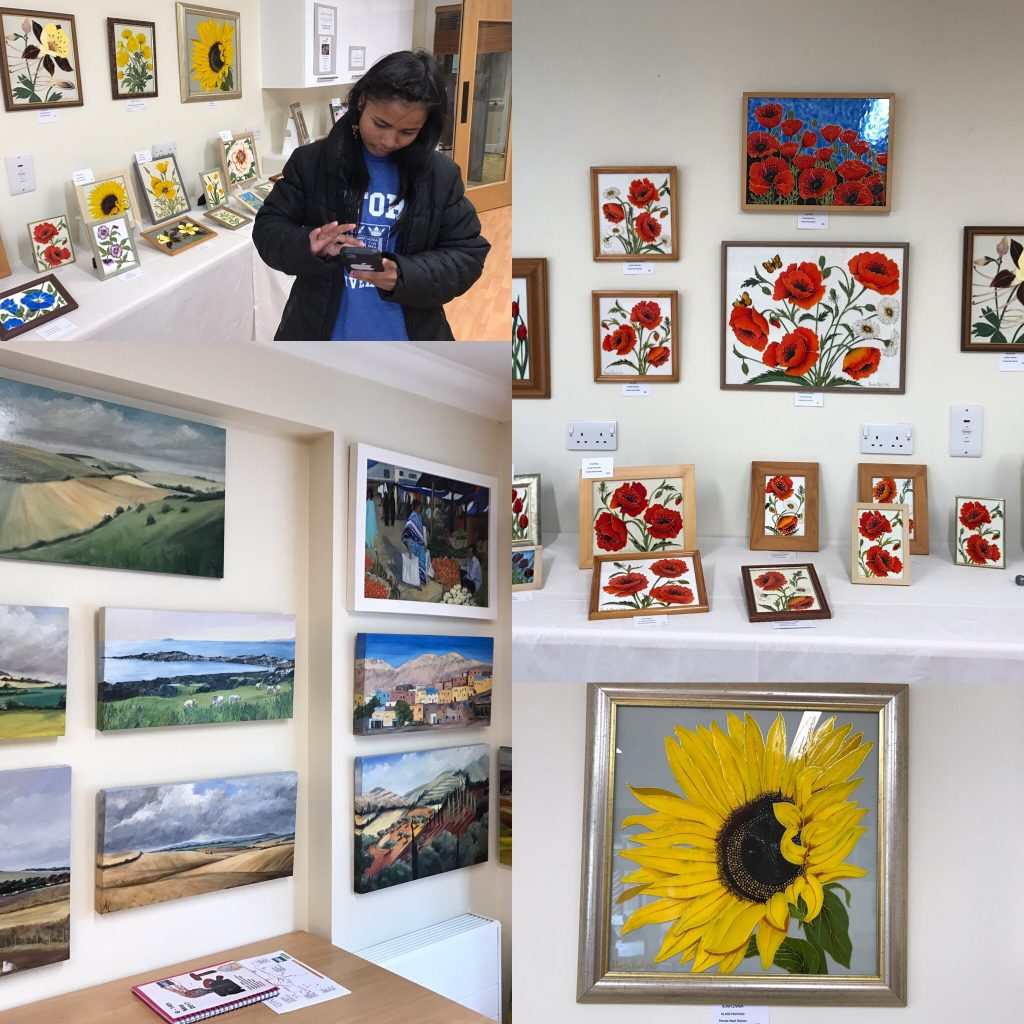
In the afternoon, when Dawid got back from school, we took the kids to the Faringdon skatepark. I am so impressed with Asha’s skating skills and I hope Dawid will learn a bit from her – she already inspired him to get on the skateboard and experiment a bit!

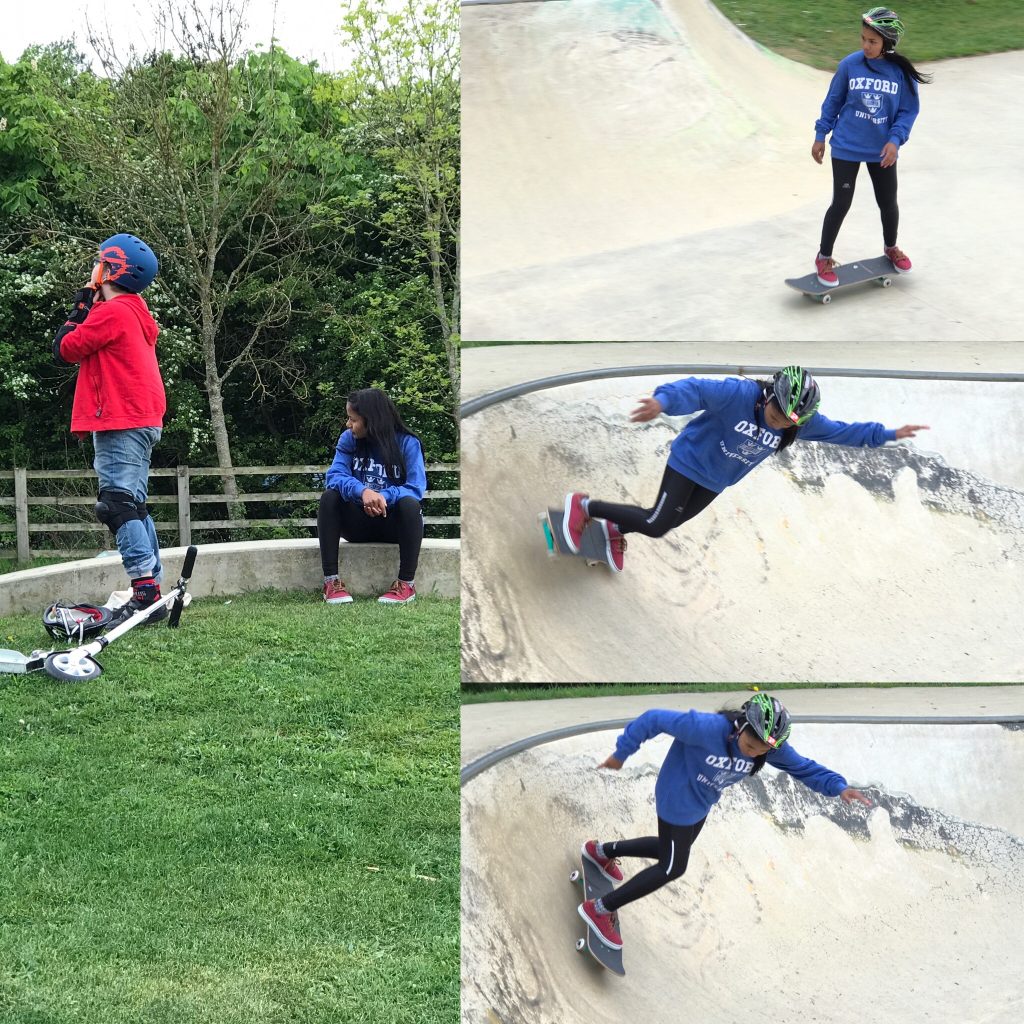
On Friday Asha came to London to spend some time with Ulrike and to go to the Southbank skatepark. Below are her photos from the trip, which was really tiring – we think we might have to make more time for London and take it easy. By Friday it did feel like a long week;)


We rested on Saturday morning but in the afternoon we took our family (their last full day in the UK) and Asha to Blenheim Palace near Oxford. She was quite astonished when I told her that it is a house for one family, really. She really enjoyed the art displayed at the palace and the palace gardens.

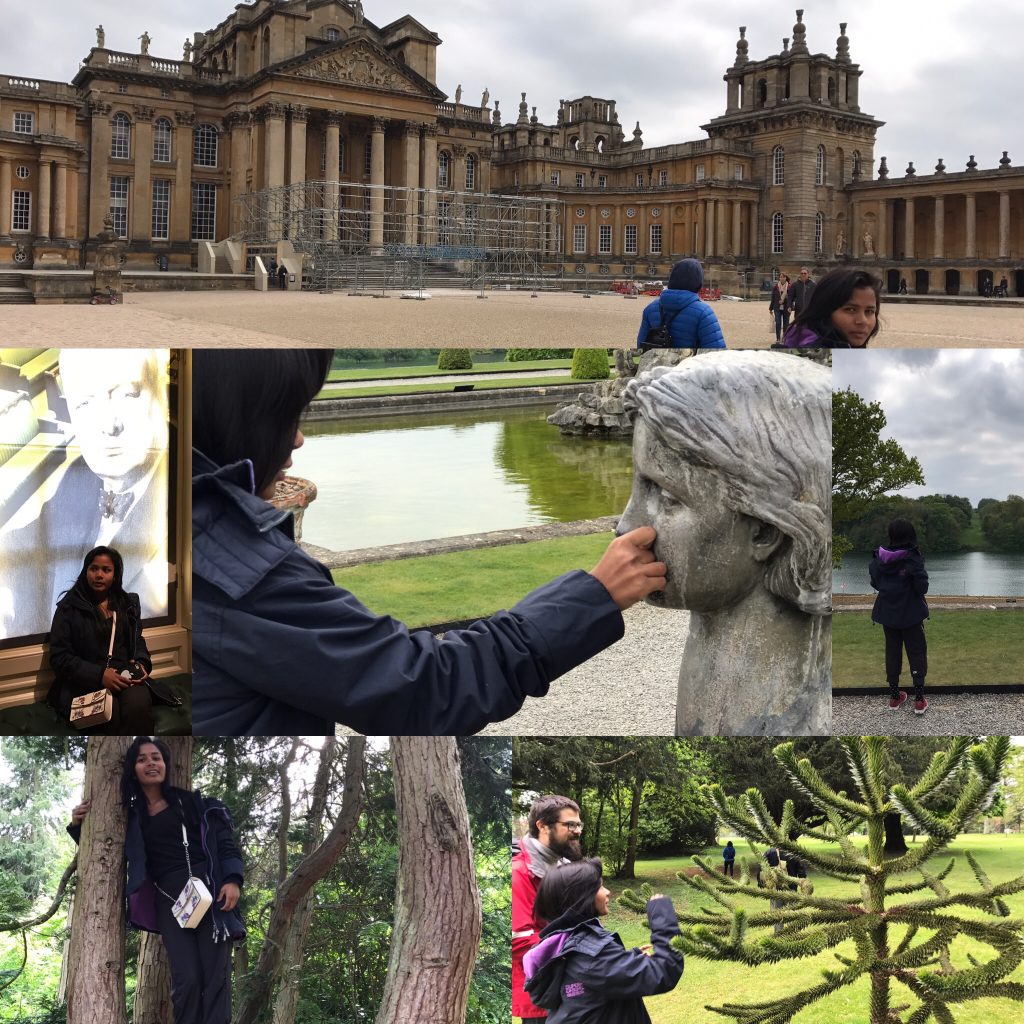
Sunday was a day of rest. Asha stayed at home and Dawid joined her for some time on the blanket, playing with dogs, relaxing. We were so lucky that the sunshine allowed us to come out of the house and enjoy the garden. We did nothing, finally:)

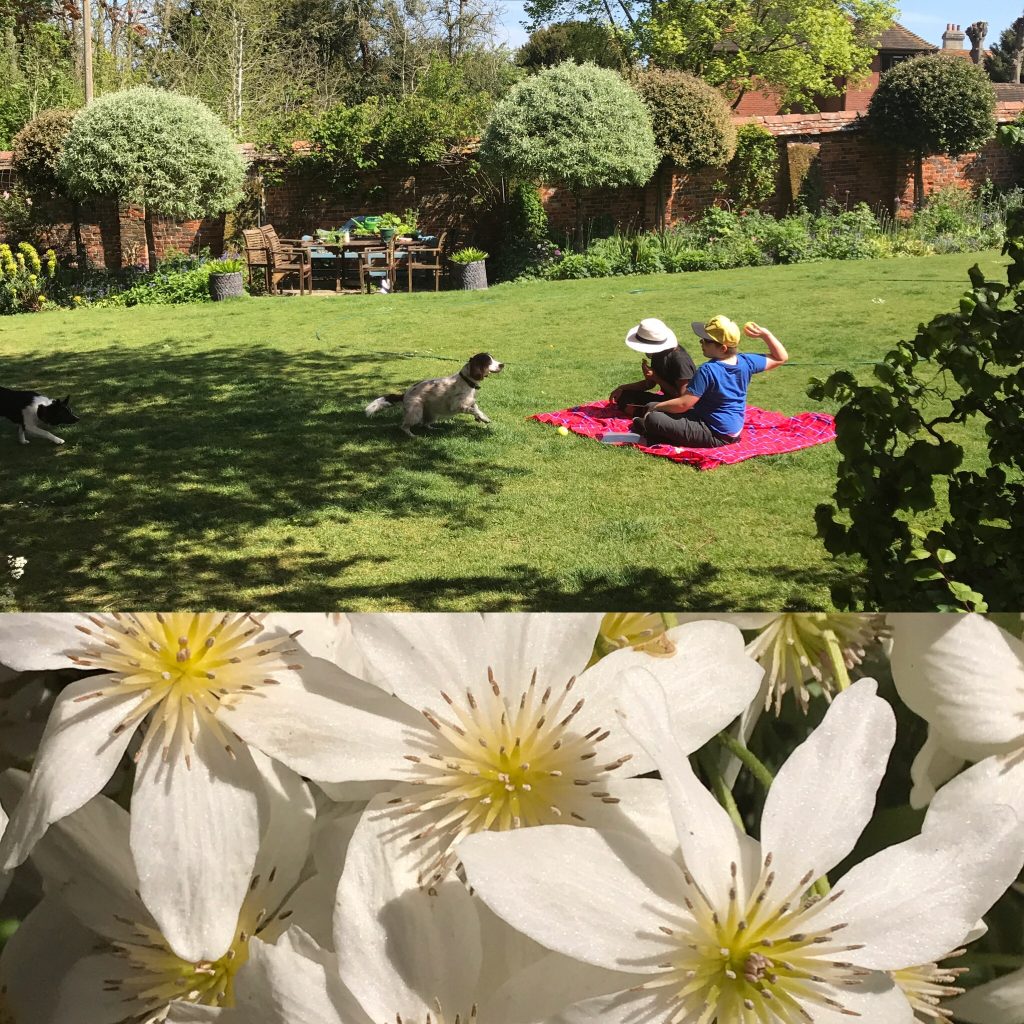
On Monday I was feeling poorly so Dan stayed and worked from home. Asha spent time with us, with Dawid and Poppy in the garden and at lunch-time went to the skatepark again. We had our first English lesson in the house – we talked about the items in the room and just warmed up for more English to come. I had my own studies in the evening but Dan and Asha decided to cook Indian food, so I arrived back home to a lovely meal and kids in beds!

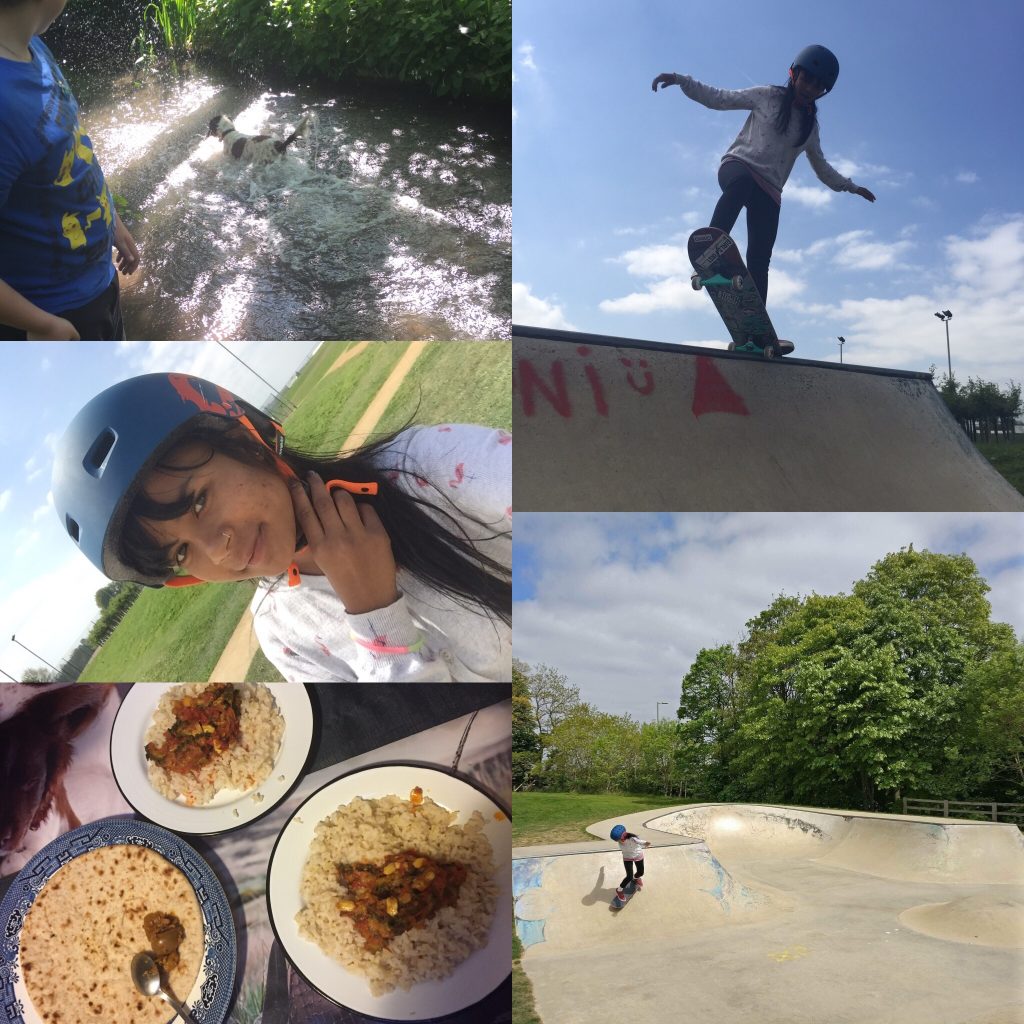
The first week of Asha’s stay was busy with travels so I think she must be very overwhelmed but I like the fact that even if tired she is always smiling and gradually speaking up more and more. She has a good connection with Dawid and Poppy and probably thinks we (me and Dan) are a bit crazy. Well, we are just happy to have her over so I think we are a bit crazy indeed;)
This week we will be back to our normal work/school routine with Dawid passing his SATs exams, so I hope Asha will see how our normal life looks like and will join in again.
